★ what your bank doesn’t want you to know—p112
★
june book extract
“ if you think going to the moon is hard, try staying at home” the astronaut Wives club by lily Koppel

how to... sell your house faster avoid burnout stay legal online
Know what you’re eating
medicaL advanceS from the frontLine See P68 terror on the cLiff: “if i Let go can i SUrvive the faLL?” the worLd’S crazieSt hoUSeS Game
PLUS jason isaacs lynda bellingham june 2013 £3.79 republic of ireland €5.10 readersdigest.co.uk
On! Wimbledon:
p36
could this be the year?
andy murray
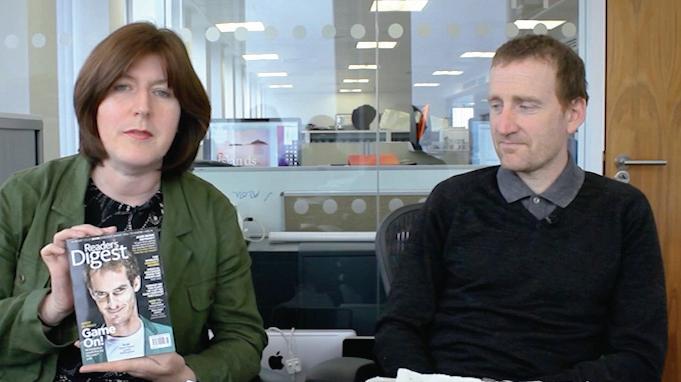
Catherine Haughney, editor of Reader’s Digest, welcomes you to the June issue
Tell us what you think of this issue: theeditor@readersdigest.co.uk


Like us on Facebook: facebook.com/readersdigestuk
Follow us on twitter: twitter.com/rdigest
June 2013 Features

“Andy Murray: Olympic Champion and GrandSlam-winning superstar. So what’s changed since he was a skinny teenager with cramp. Almost nothing,” sports journalist Sue Mott claims. p36

“The idea of saving art for the nation sounds very worthy,” says critic Jonathan Jones, “but is it just hollow rhetoric to get money and publicity for our poshest galleries?” p76

“Actor Jason Isaacs jokes about being ‘profoundly shallow’, but he’s the opposite,”
freelance writer Olly Grant points out.
“He has a beady eye for engaging anecdotes.” p86

Reasons to Be Cheerful, Part 31 An unexpected death and love of a cult film took James Brown on a sudden—and priceless—detour 36 Andy Murray He may be an Olympic gold medallist and a Grand Slam champion, but Andy Murray still has his feet firmly on the ground 44 Best of British: Rose Gardens It’s the nation’s bestloved flower, and there are plenty of places to find it 52 Terror on the Cli What started as a hillwalk soon became a struggle between life and death 60 Family Guys Five modern dads discuss the struggles, challenges and joys of parenthood 68 How War Heals The surprising medical benefits of armed conflict 76 The Maverick: “Let’s Not Save Art for the Nation” At a time of austerity, such largesse can’t be justified, says art critic Jonathan Jones 80 A Little Light Map Reading Who needs satnav when navigation is in our genes? 86 Jason Isaacs: “I Remember” The Harry Potter actor on Hollywood, taking risks and playing the bad guy 92 Crazy Houses If you’re looking for a property investment, you might want to skip these 100 A Life Less Ordinary: Service with a Smile How one tennis-lover took on the local gangs and transformed a London park
Stories featured on the cover are shown in red Do dads know best? Find out on p60 30
Regulars Welcome

We’re looking at both ends of the tennis court this month. Cover star Andy Murray is at global superstar level and about to spark another round of Will-He-Won’t-He-WinWimbledon speculation. (For what it’s worth, I think he will, but I’m a Scot.) Of course, Andy started playing as a young boy in his home town of Dunblane, but if you’ve ever doubted how valuable local tennis courts are in this digital age, turn to p100 and read Robby Sukhdeo’s story. This is grassroots tennis at its most rewarding.
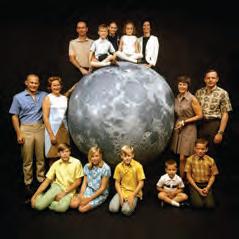
And on p86 you’ll find Jason Isaacs’s wry take on some of the best moments in his life so far. I chuckled when I found out that as a schoolboy Jason read our laughter pages and tried to memorise a few jokes to make himself popular. If you want to try the same trick, you’ll find this month’s exceptionally funny jokes on p154.

2 READERSDIGEST.CO.UK JUNE 2013
Reader’s Digest the World’s Biggest Magazine published in 50 editions in 21 languages On our cover: Andy Murray photographed by Neale Haynes/Contour by Getty Images Catherine Haughney theeditor@readersdigest.co.uk facebook.com/readersdigestuk twitter.com/rdigest
9 Over to You… 13 Radar: Your Guide to June with Natalie Haynes, Stuart Maconie, Olly Mann and Andy Zaltzman 18 You Couldn’t Make It Up… 21 Word Power 24 In the Future… 26 Instant Expert: The Su ragettes 28 If I Ruled the World: Wade Davis
108 1,001 Things Everyone Should Know 114 Medicine: Max Pemberton 116 Health: Susannah Hickling 120 Beauty: Alice Hart-Davis 122 Consumer: Donal MacIntyre 124 Money: Jasmine Birtles 130 Fast Food 132 Eats & Drinks: Nigel Barden 135 Gardening: Bob Flowerdew 138 Wildlife: Martin Hughes-Games 140 Online: Martha Lane Fox 142 Motoring: Conor McNicholas 144 Travel: Kate Pettifer 146 The Reader’s Digest—our recommended reads of the month 151 Books That Changed My Life: Lynda Bellingham 154 Laugh! 158 Test-Your-Knowledge Crossword 159 Teatime Puzzles 160 Beat the Cartoonist!
...at the front
...at the back
p146



















Write On…
Send us your stories, jokes and letters—if we publish, we pay!
WE PAY
£50 for the star letter and £30 for regular letters.
Email readersletters@ readersdigest.co.uk or write to Readers’ Letters, Reader’s Digest, 9th Floor, 1 Eversholt Street, London NW1 2DN
SMALL PRINT SUBSCRIBE!
WE ALSO PAY SORRY!
£50 for the true stories, anecdotes, jokes in Laugh! and You Couldn’t Make It Up…, and contributions to end-of-article fillers, Travel and Gardening. Email excerpts@readersdigest. co.uk or write to Excerpts, Reader’s Digest, 9th Floor, 1 Eversholt Street, London NW1 2DN
Ensure submissions are not previously published. Include your name, email, address and daytime phone number with all correspondence. We may edit letters and use them in all print and electronic media. Contributions used become world copyright of Vivat Direct Ltd (t/a Reader’s Digest).
We cannot acknowledge or return unpublished items or unsolicited article-length manuscripts. Do not send SAEs. Article-length stories, poetry and cartoons are not requested.



Visit readersdigest.co.uk or write to Reader’s Digest, PO Box 444, Douglas, Isle of Man IM99 3ZF.
UK: £42 a year. Republic of Ireland: €74.39 a year. Europe: £50 a year.
Rest of the world: £60 a year. Prices include delivery. For Gift
Subscriptions contact Customer Services below
Contact Customer Services for renewals, gifts, address changes, payments, account information and all other enquiries. Phone: 0871 351 1000 (Calls from a BT landline will cost 10p a minute. Call costs from other providers may vary.)
Email: customer_service@ readersdigest.co.uk
Minicom: 0870 600 1153.
CUSTOMER SERVICES TALKING MAGAZINES
Reader’s Digest is available in a talking edition for blind and partially sighted people for £16. For details, phone: 01435 866 102; email: info@tnauk.org.uk, website: tnauk.org.uk.
twitter.com/rdigest facebook.com/ readersdigestuk
4 READERSDIGEST.CO.UK JUNE 2013 *CALLS FROM A BT LANDLINE WILL COST 10P A MINUTE. CALL COSTS FROM OTHER PROVIDERS MAY VARY
review the hotel online, Darren”
“You’re meant to






Online this month…




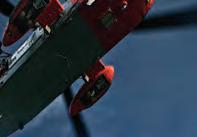









WEB EXCLUSIVE!
When Royal Marine winchman Tony Russell set out to rescue two stranded yachtsmen, he had no idea how much his life would change.
For his act of bravery, Tony has won numerous awards, including the George Medal in this year’s Honours List. Read the full story at readersdigest.co.uk/ magazine
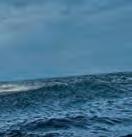

6 © 2013 Vivat Direct Ltd (t/a Reader’s Digest). British Reader’s Digest is published by Vivat Direct Ltd, 1 Eversholt Street, London NW1 2DN. All rights reserved throughout the world. Reproduction in any manner, in whole or part, in English or other languages, is prohibited. Reader’s Digest is a trademark owned and under license from The Reader’s Digest Association, Inc, and is registered with the United States Patent and Trademark O ce. All rights reserved. Classified advertising by Madison Bell. Printed by Polestar Chantry, Polestar UK Print Ltd. Newstrade distribution by Mail Publishing Solutions. PUBLISHED BY VIVAT DIRECT LTD (T/A READER’S DIGEST), 1 EVERSHOLT STREET, LONDON NW1 2DN Paper from sustainable forests. Please recycle
OUT
too! Go to the App Store, iTunes
store, Google Play Store and Amazon to download our magazine apps. Follow us at twitter.com/rdigest. Like us at facebook com/readersdigestuk THE READER’S DIGEST ASSOCIATION INC President and Chief Executive O cer ROBERT E GUTH Vice President, Chief Operating O cer, International BRIAN KENNEDY Editor-in-chief, International Magazines RAIMO MOYSA EDITORIAL Editor CATHERINE HAUGHNEY Deputy Editor/Design Director MARTIN COLYER Deputy Editor/Features Editor SIMON HEMELRYK Production Editor TOM BROWNE Assistant Features Editor/Web Editor ELLIE ROSE Art Editor HUGH KYLE Picture Editor ROBERTA MITCHELL Contributing Editors SUSANNAH HICKLING (Health) CAROLINE HUTTON HARRY MOUNT JAMES WALTON LOLA BORG ADVERTISING Head of Advertising Sales ADRIAN MILNER Account Directors SIMON FULTON JIGS PANKHANIA Account Manager SUZANNE SMITH MARKETING Head of Marketing JAMES GREENWOOD PRODUCTION JAN BUCIL MANAGING DIRECTOR EDWARD KNIGHTON
CHECK
our fabulous apps,
music
PHOTOGRAPHED BY STUART CONWAY
@readersdigest.co.uk


































NOW, VISIT Bring your car and sail away to the Isle of Man. Your holiday begins the moment you relax on board, before driving away to explore unspoilt countryside, a stunning coastline, fascinating culture and marvellous heritage attractions. Bring your sense of adventure. Leave with treasured memories.











STEAM-PACKET.COM













Terms and conditions apply. Subject to availability. *Valid for travel from 11.06.13 until 09.09.13. Journeys must be completed within 5 daysday of outward sailing counts as day 1. Return sailing must commence on or before day 5. A combination of ports should be considered. † Valid until 13 September 2013. Price is per person and includes return foot passenger sea travel and bed & breakfast accommodation sharing a twin/double room. For payment by credit card, a fee of £3 applies per transaction, not per person.
TIME TO
BRING SOME
BRING YOUR
LOVE OF HISTORY BRING YOUR INTREPID
BRING
FROM £106 EACH, FERRY & TWO N IGHTS B+B
UNWIND
DRIVER
EXPLORER
YOUR
BOOK
Over to You...
EMAILS, LETTERS, TWEETS AND FACEBOOK
£30 FOR EACH PUBLISHED LETTER, £50 FOR THE LETTER OF THE MONTH!
SEE P4 FOR MORE DETAILS

LETTER OF THE MONTH*
“Seventy-Five Years On” prompted me to think of my own relationship with your magazine. I was 13 years old in 1953, living in what was then Ceylon. One day my father gave me a copy of RD, lent to him by his British estate manager. I was fascinated by this little magazine and begged my father to ask for more copies. I’ve been hooked ever since.
“Word Power” improved my English—in my first year at university in India, I was made secretary of the English Association and won a place in the university All India Radio Quiz Team. Apart from a short break, I’ve read every single copy—my friends are always surprised by my general knowledge and amused by the many jokes at my disposal. One of my most joyful days was when my end-of-article filler was printed last year. It was my first attempt at writing to RD and it felt like winning £70m!
You’ve kept me informed and entertained for well over 60 years. Very best wishes for the future!
D Ramakrishnan, Surrey
END OF THE LINE
It was encouraging to read Christian Wolmar’s Maverick article on first-class train travel. For standard-class passengers, there’s a simple solution—we need more seats. Time and again I’ve waited on cold platforms asking myself the same question: why only two carriages?
O ering a first-class carriage when standard-class ones mimic the steerage conditions of an ill-fated ship is unnecessary. As unnecessary, say, as a first-class motorway lane. For a country that invented rail travel, isn’t it a little embarrassing that we’re surrounded by countries that do it better?
Lucy Darbyshire, Lancashire
I’d argue that it’s not first-class travel that’s outdated, but rather Christian Wolmar!
Life is full of choices and rail travel is no di erent. Should large luxury cars be banned because they take up too much space on the roads? Should first-class air travel be stopped so we all have to travel at budget rates? Mr Wolmar’s suggestion should be rejected out of hand.
Tony Woodman, Reading
9
►
*Read the full letter online at readersdigest.co.uk/magazine
Over to You…
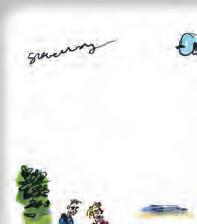
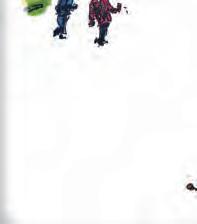
“She’s mad at me. She’s thrown out my entire record collection…”
PUPPY LOVE

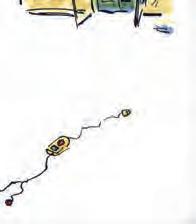
Peter Wedderburn is right to say in “When Animals Grieve” that pets feel emotion. I’m a veterinary nurse and have lived and worked with animals my entire life. For the most part, they accept death as natural— what causes them distress is when a companion or owner suddenly disappears without reason. This may account for many of the behavioural changes Peter mentions.
Caroline Gosden, West Sussex
FUNDING OPTIONS
Tony Duerr made some good points in “If I Ruled the World”, but I wouldn’t take money from
the space programme to spend on malaria prevention. The space programme has involved the study and manufacture of drugs and medicines, and led to great strides in knowledge across many sciences. The money involved is easily justified by the often unacknowledged benefits the programme bestows.
Perhaps the money should come from military budgets. I’d rather sacrifice the renewal of Britain’s Trident missiles to fund the quest to prevent malaria.
Michael Crouch, Norfolk
WHERE THE HEART IS
I’m 29 and still live at home, so “Let’s Stick Together” struck a chord. The meals are hot, the fridge is always full and the rent is minimal. Is it any wonder that lots of 20- to 30-year-olds are still with their parents? Buying my own house is beyond my reach, but being at home at least means I’m close to my family.
Mollie Burton, Wrexham
HIDDEN TALENTS
“BEING AT HOME AT LEAST MEANS THAT I’M CLOSE TO MY FAMILY”
As a creative-writing tutor, I fully endorse what James Brown says in “Reasons to Be Cheerful, Part 29”. There’s real satisfaction—and usually surprisingly good results —to be had by setting your timer for 20 minutes and just writing. There’s no time for editing, or for that internal critic to start telling you, “That’s rubbish!” I often set
10 READERSDIGEST.CO.UKJUNE 2013
this kind of exercise for my classes. Most students soon realise they can write better than they think—and they don’t need hours and hours to do it!
Helen Yendall, Gloucestershire
WRITER BLOCKED
I was amused by Je rey Archer’s “I Remember”, particularly when he says his time would have been better spent on charity work than in prison. Why does he think he should have been treated more leniently? Then again, if he hadn’t gone to prison he wouldn’t have written all those extra books. So maybe he has a point… Tracy Davidson, Warwickshire
A DISCREET VEIL
I can’t thank you enough for not having a picture of a bird-eating spider in your item “A Sense of Scale”. It might have prompted me to stop my subscription, as my irrational fear of large spiders
You’re still talking about…
A L Kennedy’s Maverick article about the rise of e-readers:

Shreya Patel @ShreyaDPatel

Completely addicted to @rdigest’s “Best of British” articles. So many places I now desperately want to see.
means I can’t even bear to look at a picture of one. I’m sure there are other arachnophobes out there feeling very grateful for your thoughtfulness!
Margaret Hughes, Hastings
CORRECTION: We’re wearing the dunce’s hat after getting a number of details wrong when we announced the winners of our “100-Word Story Competition” last month. Alice Cattley is 16 and goes to Sa ron Walden County High School in Essex, while Molly Wakeman is 17 and goes to the Royal Latin Grammar School in Buckingham. Many apologies to both Molly and Alice.
● An e-reader will never replace the feel and look of a hard copy —but now I have one, I wouldn’t want to be without it
Jean Cox, Milton Keynes
● A L Kennedy echoes my own sentiments. One can’t share or lend an e-book, or give an e-book as a gift, or have an e-book signed by its author. Books really do furnish a room, and she makes
“WHY DOES JEFFREY ARCHER THINK HE SHOULD HAVE BEEN TREATED MORE LENIENTLY?”
a good point about recycling. What happens to a broken or obsolete e-reader? It probably goes into landfill.
Anne Lake, Hertfordshire
● I’m rarely able to get out these days because of ill health, and my arthritis makes it di cult to hold a book. In that respect, the Kindle has saved my reading life.
Vivien Horsey, East Yorkshire
11 JUNE 2013READERSDIGEST.CO.UK

Film R A D AR
YOUR SHORT, SHARP GUIDE TO JUNE

 Author and BBC2 Review Show critic Natalie Haynes on the new releases
Author and BBC2 Review Show critic Natalie Haynes on the new releases
IN CINEMAS
Summer in February If you’ve been pining for Dan Stevens since his untimely exit from Downton Abbey, then pine no longer. He’s moved to the big screen, taking his heroic sti upper lip with him in this period love story grounded in historical fact.
He plays Gilbert Evans, the sole respectable figure in a group of boho artists in Cornwall in 1913 that includes Sir Alfred Munnings and Laura and Harold Knight.
When Florence Carter-Wood (Emily Browning, pictured above with Stevens) arrives to practise her sketching, she throws the tight community into chaos.
The strong cast gives this film a real lift: Hattie Morahan (Laura Knight) is terrific in everything on stage and screen, and Dominic Cooper makes a good stab at the mercurial Alfred Munnings. The film’s gorgeous setting, Lamorna Cove, makes you long for a trip to the Cornish seaside.

on stage and screen, and Dominic good stab at the gorgeous setting, you long for a trip to





13
►
Much Ado
About Nothing
In 2012, Joss Whedon directed the highestgrossing movie of the year with the big-budget spectacular Avengers Assemble. At the end of principal photography, he considered taking a holiday, but then went home and shot a black-and-white film of his favourite Shakespeare play instead.

About Nothing
AND NATALIE’S PICK OF THE DVDS
The result is this luscious modern-setting version. Alexis Denisof and Amy Acker (known to Whedon fans as Wesley and Fred in vampire TV series Angel) play Benedick and Beatrice, the smart-mouthed hero and heroine who spawned a million rom-coms. Nathan Fillion, gives a delightful turn as hapless policeman Dogberry, and Tom Lenk is hilarious as his deputy.
This is the perfect date movie for a warm June evening (fingers crossed).


READER RADAR
Alison McLellan, 37
Wreck-It Ralph





put-upon villain in a video game. Like Jessica Rabbit, he isn’t bad, he was just drawn that way.
Watching: MasterChef (BBC1)
Why is watching two middleaged men chomping food so compelling? I think it’s because you really get to know the contestants during the series.
Reading: The Bible It’s not new, but it’s my manual for living and the biggest-selling book ever.

Flight Denzel Washington stars as the pilot of a rogue plane. Just don’t watch the night before you jet o on holiday. Ralph is the
Online: Local job sites. I’m hunting for work at present and don’t want to commute, so the hyper-local sites are the way to go.
Listening: The Greatest Hits by Il Divo. I’m not terribly into classical music, but this is accessible enough for me.
14 READERSDIGEST.CO.UK JUNE 2013 R A D AR
Modern spin: Alexis Denisof and Amy Acker in Much Ado

Music

BBC 6
Music’s Stuart Maconie’s pick of the recent releases
Trouble Will Find Me by The National Think Bruce Springsteen meets Joy Division. The National have done it the old-fashioned way, a slow build of increasingly brilliant albums buoyed by word-of-mouth acclaim. This superb new collection builds on the template of their last, the astonishing High Violet, in its richness, melancholy and sheer emotional heft. Powerful without ever being hammy, if there’s a better band in the world right now, I don’t know of them.

shows that there’s been a quiet hunger for new stu from this quirky French duo, who haven’t released an album since 2005. On first hearing, there’s no major change of direction, but why would you want that?
Clean, elegant, funky, featuring stellar guests such as Pharrell Williams and Nile Rodgers, and with all the usual touches—vocoders, disco— this is a very welcome return.
Daft Punk


Random Access Memories by Think Kraftwerk meet Chic at a children’s party. “Get Lucky”, the first single from this long-awaited new album, broke all records on streaming service Spotify, which


Fain by Wolf People A hipster Jethro Tull for the 21st century. The pressures of day jobs and finding their way in the ruins of the conventional music industry have meant a slowish build for this beardy English quintet, but they’ve come of age with this terrific new record. Fain marries the sweet, oaky antiquity of classic British folk with the muscle of rock and a pleasing lightness of touch. Catchy tunes and flute solos; what indeed is not to like?

15 JUNE 2013READERSDIGEST.CO.UK
►
Gadgets

Technology expert, BBC 5 Live presenter and Answer Me This! podcaster
Olly Mann reveals the latest must-haves
ALSO ON OUR RADAR…
June 8
World Oceans Day
June 10
Royal Academy Summer Exhibition opens (runs until August 18), London
June 20
Iain Banks releases The Quarry, his final book
June 26–30
Glasgow International Jazz Festival
Kobo Aura HD, £139.99 This is the highest-resolution e-reader on the market, though that’s not enough to justify the £30 price gap over its big rival, the Kindle Paperwhite. Its main features are matched by Amazon’s product too—touchscreen, backlight, on-board dictionary, millions of books to download, long-life battery, smartphone app. But the Aura has a secret weapon. The ridged rear makes holding it for long periods more comfortable. Serious bookworms should consider it.



Honda Miimo, from £1,990 Not since paranoid virtual-reality thriller The Lawnmower Man have
AND CHECK OUT…
Judge 2-Stage Knife Sharpener, £12 Restores and refines blunt knives faster than Freddy Krueger on Halloween.



technology and grass cutting combined with such potency. Honda’s 22v robot detects a signal from a perimeter wire— installed under the grass—to infer the boundaries of your garden. It uses micro-sized razor blades to trim the lawn little but often, and turns o instantly if it’s flipped on its side—so Thumper the bunny should be spared a haircut.


Prezzybox Space Bar by Quirky, £99.95 This PC-monitor mount provides handy storage for your keyboard and six—yes, six!— integrated USB ports.
16 READERSDIGEST.CO.UK JUNE 2013
R A D AR


Sport

ESPNcricinfo cricket blogger, broadcaster and stand-up comedian Andy Zaltzman previews the best of the month’s action
ICC Champions Trophy, England, June 6–23 No one cares much about the misleadingly named Champions Trophy—to the extent that it’s being dumped into the dustbin of history after this year’s swansong. That’s a pity, because its format is perfect. Eight teams, two and a half weeks, no messing about. Unlike the World Cup, which tends to involve weeks and weeks of messing about. There’s currently no outstanding one-day team, so home advantage could prove decisive for England.
AJG Parcels Celtic Society Cup Final, Strachur, Scotland June 29
If you’re tired of footballers collapsing in a writhing heap of faux agony after being lightly brushed on the shoulder by an opponent’s hair, type the words “Shinty keeper saves” into an internet
search engine. Your faith in sport will be restored and you’ll have an increased respect for the resilience of the human skull.
Inverary will be hoping to defend their title in the sport’s oldest competition, an annual knockout tournament for Scotland’s leading shinters.
Australia vs British & Irish Lions, 1st Test, Brisbane, June 22
A Lions tour is one of the few events that still possesses that rarest of sporting rarities: rarity. The cream of British and Irish rugby comes together only once every four years. The challenge for coach Warren Gatland is to whip that cream into a perfect rugby mousse, without it curdling and splitting like an overstretched metaphor.

The 2013 Lions will be seeking vengeance for their defeat on the previous Australia tour 12 years ago. That series turned after a not-particularly-stray Aussie elbow found its way into Richard Hill’s cheekbone at a notobviously-accidental velocity. Hill, one of the most influential British players in the past 30 years, was clonked out of the series, and the Lions faded after a brilliant first match in the three-test series. ■
17 JUNE 2013READERSDIGEST.CO.UK
GETTY IMAGES
You Couldn’t Make It Up…
¶ My daughter, having just passed her driving test, took me for a spin.
I was quite nervous, and at one point I had to tell her that she’d just made an illegal turn.
“It’s OK, Mum,” she replied. “The police car behind us has done the same thing.”
Demi Roberts, Denbighshire
¶ I was staying at a hotel in Bristol a couple of years ago. Upon retiring for the evening, I noticed that my bathroom fan was still running.
After some investigations and failed attempts to find out why it refused to go o , I contacted reception.
The night porter arrived and made a 30-second visit to the bathroom. The noise stopped.
“That was quick” I said. “What was the problem?”
“I switched o your vibrating toothbrush, sir,” he replied.
Ian Barnett, Glasgow
¶ I was out with my best friend and her work colleagues one evening in a noisy bar.
Turning to one of her friends while she was looking at some lads, I nudged her and said, “So are you on the pull then?”
To my horror, she replied, “No, I use the coil.”
I was mortified.
Katie Coles, Pontypridd



¶ AN OLD TREE STOOD DIRECTLY OUTSIDE OUR o ce window. It was a thing of beauty from spring to autumn, so we were sad when it was felled for safety reasons.
We soon realised how much it had shielded our window from the sun, but our maintenance sta fitted a solar-reflecting screen to deal with the glare on our computer screens. This made the outside of the window look like a giant mirror, which became a magnet to pedestrians—they would stop to apply make-up, comb hair, adjust clothes or pull faces.
This was a source of considerable merriment in the o ce—until the day a passer-by stopped to squeeze her spots and apply medical balm…
James Stronach, North Yorkshire
18 READERSDIGEST.CO.UK JUNE 2013
¶ I’d just read an article about learning development through play for toddlers. Trying to be a good mum, I set about putting the advice into action.
I saw my little boy was playing with a large box in the living room. Knowing he was quite a fan of In the Night Garden, I said, “Is that Igglepiggle’s boat? Are you sailing to forest to meet Upsy Daisy?”
He looked at me stony faced and replied, “No, Mummy. It’s a box and I’m in the living room.”
That told me.
Lynsey Summers, Essex
¶ During a bout of snow and ice last winter, a local store ran out of wellington boots. The shoe department was on the first floor, so the management decided to place a notice halfway up the stairs saying, “No wellingtons.”
To their surprise, they later found a row of wellingtons at the top of the stairs, which customers had removed before setting foot on the first floor. Kate Greenway, Dorset
¶ ON A RARE NIGHT OUT with the girls, I ordered a refreshing half pint of lager, but when I went to take a sip I noticed it had a really unpleasant smell.
The barman willingly


“David, my body clock is ticking… I want you to buy me a sports car”
WIN £50 FOR YOUR TRUE, FUNNY STORIES.
EMAIL excerpts@ readers digest.co.uk OR GO TO facebook. com/readers digestuk

¶ I recently took my grandmother on a rare train journey to London.
When we got to the front of the queue at the ticket o ce, the booking clerk said to her, “That’ll be £48. Change at Crewe.”
She looked at him sternly and retorted, “I’ll have my change here if you don’t mind!”
Eleri Webber, Cheshire
served me another drink but this too smelled bad. He apologised again and served me a di erent brand of lager, free of charge, but this also had the same bad chemical odour.
Then I suddenly realised what was going on—the smell I was detecting every time I put the glass to my mouth was my new nail varnish!
Nhadine Markham, Yorkshire
19 JUNE 2013READERSDIGEST.CO.UK
■



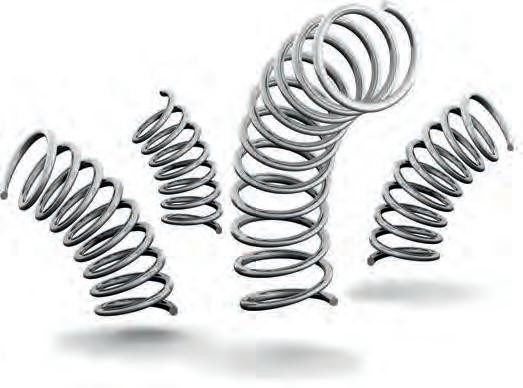

Cartilage and bone health are important for long term wellbeing and an active life. If you are looking for a daily supplement to give you extra support from within, Jointace® range has been specially formulated by Vitabiotics’ experts to provide premium nutritional care. With a unique combination of nutrients, and vitamin C which contributes to normal collagen formation for the normal function of bone and cartilage.




also GEL or PATCH for direct application.
Ideal alongside Jointace® Tabs or Caps.




From , Superdrug, supermarkets, Lloydspharmacy, chemists, Holland & Barrett, GNC, health stores& www.jointace.com
Vitamin supplements may benefit those with nutritionally inadequate diets.








OriginalwithOmega-3 CollagenMaxSportFizz
Voted Favourite Supplement in its class by Boots Customers




ADJONSPRINGP 13-02-13E
Word Power
Harry Mount goes on the stump
Politicians are never o our TV screens, but how well do you understand what they’re saying? Test your knowledge of political language by answering A, B or C below.

1 demagogue n
A political agitator
B long election campaign
C deposed politician
2 psephologist n (see-fol-ih-jist) A electoral o cer B voting expert
C radical politician
A word is born Openture
A word coined recently by psychologists to mean the opposite of closure. It means the desire not to seek resolution of emotionally di cult situations.
RD Rating:
Useful? 7/10 Likeable? 5/10


A parliamentary speaker
B debating chamber
C job without duties
8 ballot n
A political ambition
B vote C applause in parliament
9 bicameral adj
A hypocritical B with twin voting options C with two legislative chambers
10 boondoggle n
A useless waste of money B confusing policy
C political gamble
11 anarchy n
3 veto n
A vote cast against your interests B election lost by a very small margin
C power to stop unilaterally an o cial action
4 pundit n
A retirement speech
B door-to-door campaign
C commentator, often a political one
5 whip n
A electoral rule
B quick-witted politician
C party enforcer
6 caucus n
A local political committee
B deposed leader
C political assassination
7 sinecure n (sinn-ih-cure)
A chaotic absence of government
B child politician
C inspirational speech
12 samizdat adj
A opposing
B overwhelming
C underground
13 agit-prop n
A minor party
B huge political defeat
C propaganda
14 primary n
A opening speech
B initial election to decide a candidate
C best candidate
15 bellwether adj
A indicating a wider trend B very crooked
C delayed
21 JUNE 2013READERSDIGEST.CO.UK
JUPITERIMAGES/GETTY IMAGES ►
Word Power Answers
9–11 getting there
12–13 impressive 14–15 word-power wizard!
1 demagogue—A agitator. “The demagogue whipped up the crowd.” Greek demos (people) and agogos (leading).
2 psephologist—B voting expert. “The psephologist predicted the swing vote.” Greek psephos (pebble)—the stones used to cast votes.
3 veto C power to stop unilaterally an o cial action. “The United Nations resolution was blocked by a veto.”
Latin (I forbid), used by Roman tribunes when opposing the Senate.
4 pundit C commentator. “Most of the pundits got the 1992 election wrong.” Hindu pandit (learned teacher).
5 whip C party enforcer. “The whip terrified the junior party member.” German wippen (move up and down).
6 caucus A local political committee. “The caucuses have huge power in selecting US candidates.” Possibly Native American (elder).
7 sinecure C without duties. “Chancellor of his old university was a
WHY TRELLIS?
Trellis comes from the Latin trilix, meaning a piece of cloth with three threads to each warp. It was then adapted to be used of things woven out of iron and gold, and then to mean a metal grille or lattice. Over time it altered to mean, in particular, a trellis used to weave plants through. It






lovely sinecure.” Latin sine cura (without care)
8 ballot B a vote. “He did badly in the ballot.” Italian balla (ball).
9 bicameral C two chambers. “Parliament is bicameral.” Latin bi- (two) and camera (room).
10 boondoggle A useless waste of money. “The Government poured funds into boondoggles.”
From a 1935 US programme where the unemployed were taught to make “boon doggles” (leather gadgets).

11 anarchy—A absence of government. “Anarchy ensued after the Roman Empire fell.” Greek Play WP online: go to readersdigest. co.uk/wordpower (without a ruler).
12 samizdat C underground. “There were many samizdat magazines in Soviet Russia.” Russian samoizdatel’stvo (selfpublishing house).
13 agit-prop C propaganda. “The article was agit-prop.” Russian agitatsiya (agitation) and Latin propaganda
14 primary—B
initial election to decide a candidate. “The primaries decide who will stand.” Latin primus (first).
15 bellwether—A indicating a wider trend. “Basildon is a bellweather constituency.” Middle English bellewether, referring to the practice of hanging a bell on a castrated ram (wether). ■
22
→ →
THE WIT AND WISDOM OF BORIS JOHNSON (£9.99), EDITED BY HARRY MOUNT, IS OUT THIS MONTH
Have you seen our invisible hearing aid yet?
Our fantastic invisible hearing aid is small. Really small. And, because it fits slightly deeper in the ear canal than your average hearing aid, it’s virtually invisible when worn. That means you get all the benefits of hearing better without anyone understanding how you do it.
Whilst it can’t be seen the difference can be heard.
Just because this hearing aid is small doesn’t mean it’s less effective. We’ve made sure this tiny device has the high speed processors and clarity enhancing features of the very latest hearing aids. These are the things that make sure you get to enjoy all the great things life has to offer like conversations with friends and family, an evening out in your favourite restaurant or a cosy night in front of the TV. And you can enjoy all this with the confidence that whilst people might notice the difference in your hearing they definitely won’t notice your hearing aid.
If you like what you (don’t) see, call 0845 203 7662 and book a free appointment in store to find out more about this amazing little hearing aid.
“I hear normally, it’s as if I don’t have a loss and, because you can’t see them, no one else knows I do!”

Free hearing check
To book your hearing check simply call 0845 203 7662
Terms: Valid until 4 June 2013. Free hearing check for over 18s only. Only one free hearing check per year.


For more information please visit Bootshearingcare.com
No? Not at all? Exactly.
In the Future…
...we’ll always be mobile, says Gary Rimmer Rimmer
Thinking of moving home?
The concept of mobile buildings suspended under giant dirigibles was runner-up in a recent prestigious skyscraper-design competition. A highly unlikely idea, of course, but stationary living may not be our only future option. In New York, an architectural think tank has designed a mobile city where homes move around on huge flatbeds —indeed, moving built houses this way already happens all over New Zealand.
But even this may be over-complicated. BMW has announced it expects to produce driverless cars by 2025 . Put this technology in carbon-neutralbiofuelled mobile homes, equip them with en-suite showers and 4G broadband, and by 2030 we could eat, sleep and work on the move: no stopping required; pan-European; and refuelled from mobile shops and garages. A cost-e ective solution to the housing shortage that could transform society.
A di erent kind of deadly virus
We all know biological viruses can be deadly in hospitals, but computer viruses could be too. Research suggests computers running life-saving equipment—from foetal heart monitors to intravenous pumps—are increasingly infected with errant software that slows them down or freezes them. As medical devices have become more interconnected, so has the risk of outside contagion, from a poorly disinfected laptop perhaps. The problem is compounded by the reluctance of equipment manufacturers to reveal proprietary secrets that could help clean up their products. Let’s hope for a law enforcing this particular issue of cyber security by 2017.


I BLAME THE BACTERIA
By some estimates, human bodies contain more bacterial cells than human, and recent research suggests people with the most methane-producing bacteria in their gut have the highest percentage of body fat and tend to be heavier. Other research shows changes in the gut flora of mice following gastric-bypass surgery has a direct impact on weight loss.
By 2020, clinical weightcontrol therapy may well involve actively controlling gastric flora. ■

LIANE RISS/GETTY IMAGES




Instant Expert
On an important centenary in the story of British democracy,
Why are the su ragettes in the news?
June 8 marks the 100th anniversary of the death of one of the most famous su ragettes, Emily Davison. In 1913, aged 40, she threw herself in front of Anmer, King George V’s horse, at the Derby, and died of her
injuries four days later without regaining consciousness.
Who was Emily Davison?
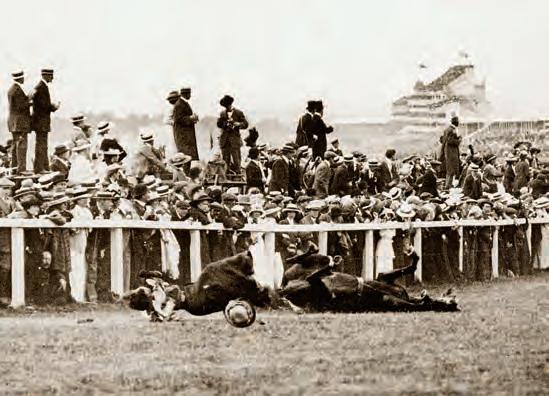


She was a brilliant student and one of the most radical members of the Women’s Social and Political Union (WSPU)—founded in 1903 by Emmeline Pankhurst and her daughters.



In all, Davison (right) was imprisoned nine times, once for an assault on someone she mistook for David Lloyd George, the chancellor of the exchequer. The jury, though, is out as to whether she intended to kill herself at the Derby. She’d bought a return ticket to Epsom that day, as well as a ticket to a su ragette dance in the evening. So was she, as many believe, just trying to pin a su ragette flag on the King’s horse?
But did she mean to kill herself? Emily Davison goes under the King’s horse

Did her actions help the su ragette cause?
Again, the jury is out. Although Davison’s death raised awareness of the campaign, much of the British population was horrified— not least because this was, after all, the King’s horse. For some hardline opponents, her death was even proof of women’s tendency to hysteria—a key reason why they should never be allowed to vote.



26
MARY EVANS PICTURE LIBRARY/THE WOMEN’S LIBRARY@LSE
The Su ragettes
Harry Mount sifts the facts from the myths
Where did the term “su ragettes” come from?
It was originally coined as an insult by Daily Mail journalist Charles E Hands in 1906. From then on it was applied almost universally (including by the women themselves) to members of the WSPU.



When did women in Britain finally get the vote?

Were they the only campaigners for votes for women?
No. What’s sometimes forgotten now is that the WSPU was a radical, and controversial, alternative to the National Union of Women’s Su rage Societies (NUWSS), known as the su ragists. The NUWSS, founded by Millicent Fawcett— whose name is commemorated in the Fawcett Society, which continues the campaign for sexual equality in politics—believed in peaceful, democratic change. The WSPU, by contrast, had the motto “Deeds Not Words” (the inscription on Davison’s grave). It was the su ragettes who famously chained themselves to railings, sent letter bombs and went on hunger strike in prison. Unlike the NUWSS, they had no men among their members.
By 1914, public opinion had largely turned against the su ragettes. But with the outbreak of the First World War, they suspended their protests, and many turned to helping the war e ort. It was that help—plus the obvious competence shown by millions of non-su ragette women in wartime—that led to the 1918 Representation of the People Act, giving the vote to women over 30, who met certain property requirements. Finally, in 1928, women won the same voting rights as men.








suspended non-su to of the women certain
1928, women won the same
How does this compare to other countries?
The first country to give women the vote was New Zealand in 1893. America added the 19th Amendment to the Constitution in 1920, guaranteeing the right to vote regardless of gender. Most democratic countries followed suit over the next decade or so, although some were surprisingly late. Women in France didn’t get the vote until 1944—and in Switzerland not until 1971. ■
27 JUNE 2013READERSDIGEST.CO.UK
EMILY DAVISON (2) GETTY IMAGES (OPPOSITE)
Wade Davis If I Ruled the World
Canadian-born Wade Davis is a Harvard-trained ethnobotanist, writer, anthropologist and photographer. He’s been described as “a rare combination of scientist, scholar, poet and passionate defender of all life’s diversity”. He’s written 15 books and won the 2012 Samuel Johnson award for non-fiction.
Every child would spend time in the wilderness and on the open road in a programme of exploration of heart, body, soul and imagination. Deep encounters with the wilderness would transform the spirit of young people and make them understand and embrace the wonder of the natural world. Spending time with other visionary cultures would make them realise that these aren’t failed attempts at being like them, but unique answers to the fundamental question: what does it mean to be human and alive?
Education would take place outside the classroom. Most of what we describe as education is just a socialisation process to crush the spirit of young people and make them conform. If we recognise that every culture has something to say in the development of human knowledge then we should also recognise that there are thousands of teachers out there. You can learn as much from a New York taxi driver as you can from a professor at Oxford, and as much by spending a month in a




monastery in Tibet as you’ll learn in a whole year in a standard educational institution. People need to see that other options and opinions are equally valued.
For every tree cut down in industrial activity that compromises the landscape, a rose bush would fall in the garden of the executive who ordered the felling. For every drop of toxic waste dumped in a lake, the same amount would be put into the executive’s swimming pool. In territories where industrial action is destroying the heritage of native cultures, the elders always say
JUNE 2013 READERSDIGEST.CO.UK 28
ILLUSTRATED
BY SAM FALCONER; RYAN HILL
that those responsible should bring their children to meet the native kids. Then the adults might find it hard to justify the destruction.
I’d remind people how verdant the planet once was. One of the most haunting traits of our species is the fluidity of our memory and our capacity to adapt to any degree of environmental degradation. In the lifetime of my greatgrandfather, bu alo outnumbered people in North America and passenger pigeons made up 40 per cent of the bird species, darkening the skies as they flew by in their millions. By 1900, hunting had reduced bu alo numbers from 60 million to 750, and passenger pigeons had been shot to extinction. I’d put the lie to the terrible belief that the world exists simply to be exploited for our benefit.
All military budgets would cease. The money would be placed in a project of restoration of habitat, eco-systems and the atmosphere that would inspire a new dream of the earth. We’d apply to the climate crisis the same energy and conviction that we’ve applied to our survival in the past.
Drugs would be legalised. The consequences of prohibition are demonstrably worse than the imagined consequences of legalisation. I’ve never met anyone who did or didn’t use drugs due to the constraints of their legal status.
“Take the time to stop looking at life through a lens and experience it for real”
The “war on drugs” over the last 40 years has cost the US government $1 trillion. But people will always find a way around every draconian anti-drug initiative. It’s a terrible waste of time and money.
I’d make the findings of science available to all. If people were in full possession of the scientific facts surrounding climate change and the miracles of biological life, they couldn’t possibly treat the world with such disdain. Yet more Americans believe in demonic possession than accept the reality of climate change. I’d also make it clear that science and religion aren’t incompatible but simply di erent lines of enquiry. I’d like children to learn the language of botanical verse, such as the formula for photosynthesis, alongside passages from the Bible.
People on holiday would only be allowed to photograph something interesting. Every two minutes more pictures are exposed than were in the first 75 years of photography. We should take the time to stop looking at life through a lens and experience it for real in our minds and souls. ■
As told to Caroline Hutton
Into the Silence by Wade Davis (£12.99), an account of George Mallory’s attempts to conquer Everest, is out in paperback.
JUNE 2013 29 READERSDIGEST.CO.UK
Reasons to Be Cheerful 31
How James Brown’s country trip turned into a pilgrimage
We were just on the outskirts of Penrith when the news that Uncle Monty had died came through. He wasn’t my Uncle Monty—he was Withnail’s. It was Richard Griffiths, the actor who played the bohemian lech in Withnail and I, who’d passed. I looked out at the Cumbrian countryside speeding by and realised that Monty’s cottage Crow Crag, where
Having borrowed this amazing-looking vehicle, we’d decided to take sledges and mountain gear and catch the last of the late-spring snow in the Lake District. That was going to be this month’s Reason to Be Cheerful—a great car journey winding through mountains and past lakes. To my son, the car felt like the world’s fastest gadget—it turned on with the
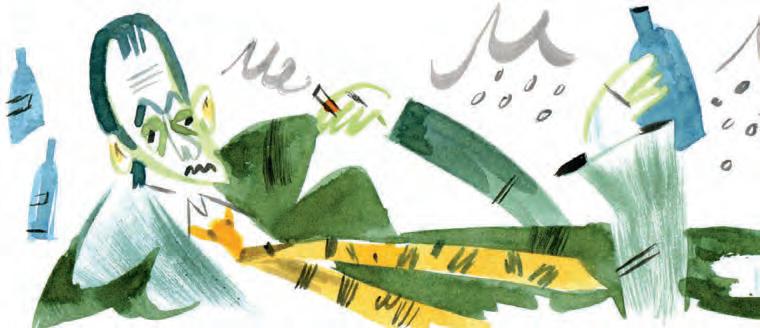
Withnail and Marwood had “gone on holiday by mistake”, must be very near.
I explained to my son that we were interrupting our adventure holiday to find an old stone cottage. It was probably going to be very cold and wet and hard to find. But it had to be done. At least we were travelling in a warm, state-ofthe-art Land Rover Evoque and not the clapped-out old Jag Richard E Grant and Paul McGann’s characters use in the film.
touch of a button, the boot rose and fell automatically, and—most amazingly—it had a TV in it. As I drove along the banks of Ullswater, stunned by the lake’s beauty, he was enraptured by being able to listen to daytime TV and how the screen would flicker into life when we parked up.
We headed into Penrith and struggled with bad satellite reception to try to find Sleddale Hall, the real location of Uncle
30 READERSDIGEST.CO.UK JUNE 2013
In Search of a Legend

Monty’s Crow Crag. I don’t really like Google Maps and satnav—I prefer a crack at a map. And that’s how we found ourselves in a tiny cafe, the nearest we could find to the fictional Penrith Tea Rooms where Withnail had demanded “the finest wines available to humanity”, using phones to find fan websites that would tell us where to go. Eventually we found
off for lunch, but taking the chance to have a look at where Withnail and I was filmed. He’d been before.
Across the lake I could make out the roof of Crow Crag. I felt exhilarated. I’d seen and loved the film at the pictures, and Withnail became my nightly TV wallpaper when the video came along. The tale of unfulfilled potential and heavy

Sleddale Hall halfway up a hill by a reservoir, with no apparent road to it. It was about 15 miles from Penrith.
By the time we turned off the main road, we were in suck-it-and-see land —testing out tracks that might take us to where we wanted to be, but which invariably led to another gate saying “Private”. We headed to the reservoir and joined a family camper van. The dad was doing the same thing as me—stopping
drinking was extremely familiar. I was the first writer to notice its dialogue had entered common usage, describing it as a “Terrible Cult” in my launch issue of Loaded magazine in 1994. I’d travelled to Hay-on-Wye with a theatre impresario to try to talk its director and writer Bruce Robinson into doing it as a West End stage play. And now I was trudging through marshy fields, trying to ignore the utterly freezing temperature as
►
31 JUNE 2013READERSDIGEST.CO.UK ILLUSTRATED BY WILLIAM GOLDSMITH
I felt like I was looking at something that hadn’t really changed in hundreds of years
we eventually found the hill that led to Crow Crag.
And then we were there—the stone walls they’d trembled inside when the lecherous Monty had arrived late at night, the slate roofs that peaked over the brow of the hill the boys had walked down to visit the pub in Shap. I couldn’t help wondering how the hell they’d got all the film equipment here, or how they’d found the location in the first place. Apart from some new windows and the buzz of a farmer’s quadbike, I felt like I was looking at something that hadn’t changed in hundreds of years. I spent a lot of time
just standing and staring at the place.
In the end, after 40 minutes of thinking about the film and feeling happy to have visited the place where some of the greatest comic scenes in British cinema were filmed, I concluded it was just a freezing pile of old stone in the middle of nowhere. But as a pilgrimage to a special film location, it’d been worth every minute. n
James, founder of Loaded magazine, now edits Sabotage Times—an online magazine with the motto: “We can’t concentrate, why should you?” Follow James on Twitter @jamesjamesbrown
Budding Authors, Take a Bow
This chilling tale was one of thousands submitted to this year’s 100-Word Story Competition. We’ll be featuring a commended story in the magazine every month.

Submitted by Ian Dixon, London
THE WAITING GAME
The room was cold, the seat hard. A harsh light speared down, reflecting from clinical walls. He paced, his steps making a dull thud, before returning to that uncomfortable chair. Why this? He was strong, physically fit, mentally sharp. A man used to seeing others jump at his decisions. But now he was cornered, trapped in this small space, awaiting an authority that could break him.
He had known worse than this before and survived, only this time he battled fear itself. The door opened and a stern voice announced his fate: “Mr Johnson, the dentist will see you now.”
Ian says: “I’ve been writing stories since school, and I couldn’t resist trying to sculpt something dramatic within 100 words. After reading the examples in your magazine, I knew I wanted to write something with a twist. The story is dedicated to a very kind man, who I never want to see in a professional capacity!”
Ian will receive a cheque for £50
32 READERSDIGEST.CO.UK JUNE 2013
◄








“I got money off my bill when I moved to a tariff with rewards. Nice to be rewarded now an d then.”







However you use energy, at E.ON we believe you should get something back for your loyalty. If you’ve been with us for a year or more, you could get money off your bill by simply changing to one of our tariffs with rewards. It’s a thankyou for staying with us.



See if you could be rewarded at eonenergy.com/rewards or call 0330 400 1059



















Helping our customers. We’re on it.



















Tariffs with rewards are not available on all meter types (e.g. Heatwise/Restricted hours) or single gas only customers. E.ON Energy Solutions Limited. Registered office: Westwood Way, Westwood Business Park, Coventry CV4 8LG. Registered in England and Wales No. 3407430.




He’s an ultra-fit sporting superstar and he might finally win Wimbledon this year.
But Andy Murray’s still just a young man from small-town Scotland who really loves his gran
‘‘ I don’t mean to upset people’’
There was a telling scene during Andy Murray’s ecstatically greeted walkabout in his hometown as the newly crowned US Open champion last September. A good portion of Scotland’s five million population appeared to be jammed into the high street of Dunblane, the cathedral town north of Stirling where he was brought up, to confer on him their noisy approval of a job well done.
“He shook thousands of hands, signed hundreds of autographs,” says his approving grandmother Shirley Erskine, 79. Then he found himself walking past the
BY SUE MOTT
►
PHOTO BY NEALE HAYNES/CONTOUR BY GETTY IMAGES
37
newsagent’s still run by the same chap, Peter, who used to top up his childhood sweet supply (adding to Gran’s paper bill).
“Have you got any Milkybars? I’m starving,” Andy shouted over.
The newsagent disappeared and reappeared with the loot.
“Oh,” said the sports star, a thought suddenly striking him. “I haven’t got any money on me.”
Some things never change. In fact, most things never change in the life of Andy Murray. He may have become the first British tennis player to win a Grand Slam in 76 years; the first ever to win an Olympic gold medal; and now the first to inspire the 24-carat belief that “one of us” can win Wimbledon at last. Years of training and Bikram yoga may have taken him from the gawky teen who first emerged in 2005 to a player with a picturesque physique capable of overcoming tennis’ gladiatorial greats. But the man himself is essentially, quaintly, endearingly, the same.

His mum Judy has an album where she keeps his early cuttings. There are hilarious pictures of two mop-haired boys, Andy and elder brother Jamie, wielding racquets alongside some telling headlines.
“British Player Wins Tournament Shock” from The Scotsman, 2000, is a reminder of what life used to be like. The story begins with the phrase, “Wee Andy Murray...”





and keeping it in his sock would help Sibling rivalry: Andy with brother Jamie
He was indeed a wee unknown, a supporter of Hibernian football club where his grandfather Roy Erskine once played, competitive at everything including board games, and so superstitious that he thought cutting a clump of fur off his grandparents’ dog Abby and keeping it in his sock would help cement the odd victory (he may have been right).
Those were the days his Mini (as he nicknamed his beloved grandma because she was smaller than him) used to stand him his sweet money. Now they reckon he’s worth about £24m and he lives in a £5m mansion in Surrey. He’s also just bought the
TSPL/CAMERA PRESS LONDON; GETTY IMAGES READERSDIGEST.CO.UK JUNE 2013
◄
“The ispressure off him, and off Britain as well”

Dunblane hotel, where he was best man at his brother’s wedding.
But, says Shirley, “he’s always been very unassuming. He’s never looked for fame or fortune or anything like that. He just single-mindedly wanted to be the best there is. The fact that he’s got money doesn’t bother him, and he certainly doesn’t court celebrity.”
Andy is very close to Shirley—she looked after him when Judy went to work—and spends every Christmas with her and Roy.
“He came here for breakfast just before his homecoming walkabout,” Shirley
says. “We gave him a special gift from our local silversmith—a miniature version of the post box that was painted gold in his honour. We had it engraved: ‘You’re awesome. We’re so proud of you.’ He was really quite overcome.
“I said to him: ‘How do you feel about today?’
“He said: ‘Do you think there’ll be a lot of people?’
“I laughed: ‘I think you might be quite surprised, Andy.’ Of course, there were thousands. Judy had invited as many of his old school friends as she could. One of them works in our local butcher’s and he brought—would you believe—two
39 JUNE 2013READERSDIGEST.CO.UK
2012 GETTY IMAGES
►
Andy celebrates his US Open victory in Central Park, New York, and (left) with the adoring crowds in Dunblane
“Their relationship has stood the test of time”

packets of sausages for Andy. Made up in sets of five, not six, because Andy had won the US Open in five sets.”
Andy may have the haircut and the confidence of a superstar, but never the swagger. He shares an agent with David Beckham and numbers Sir Alex Ferguson and a James Bond (Sir Sean Connery) as fans. He even played tennis against David Cameron in the state dining room at Number 10, but his main reaction was panic rather than egotistical gloating.
“I was scared as I didn’t want to break anything. The prime minister was hitting the ball really hard at me,” he said. (The crystal chandelier was imperilled, but survived.)
He once bought a red Ferrari and then sold it again out of sheer embarrassment. While some global champions use their fame as a springboard for socialising, to put it mildly, Murray has had the same girlfriend since 2005—Kim Sears (an artist). Apart from a fleeting relationship while training in Spain in his teens, he has been a one-woman man all his life. In his autobiography, he has the maturity to acknowledge that his parents’ divorce had been so painful in his early teens that he never wanted to split with someone he loved if he could help it.
Shirley reckons his relationship with Kim is only going one way. “I don’t think there’s any doubt about it,” she says, though she has more sense than to actually mention the word “marriage” out loud to her grandson. “Their relationship has stood the test of time and she’s a lovely girl. She really is. She keeps herself quiet in the background but is tremendously supportive. When Andy’s home,
AFP/GETTY IMAGES ◄
he just loves to have a quiet time with her and the dogs, Maggie and Rusty.”
Now that the terriers have their own passports, every winter Andy takes Kim and the dogs to Miami, where he does the bulk of his intensive fitness training.
As for Wimbledon, the revolution is almost complete. From being highly critical of his manners, his look, his physique, his continual swearing (even Tim Henman called him “a miserable git”,
paparazzi. I don’t mean to upset people.”
Then he cried after losing to Federer at Wimbledon last year—and everyone did a sudden about-turn. It wasn’t quite that simple, but those tears seemed to convince a number of former critics that this was a guy who tried to the depths of his tennis shoes. And the Brits admire effort and caring almost as much as talent. Perhaps more. His voice cracked and so did Wimbledon’s haughty resistance.

affectionately), and having the twisted misapprehension that he hated the English, the crowd has come to love him. He was bewildered by his unpopularity in the early days.
“It wouldn’t make me feel good to bottle up my emotions,” he said after one of his F-word sessions had been picked up on a microphone. “There’s a fear of emotion in tennis. There are things I say on the court that I probably shouldn’t. But off the court, I’m not stumbling out of nightclubs or throwing up in front of the
Last summer,
The question now is: will he become the first British male Wimbledon winner since Fred Perry in 1936? That’s quite a historical gap, given that Perry was born before the Titanic sailed. Murray has everything in his arsenal to succeed: belief; persistence; fitness; competitiveness; experience; and, of course, the ministrations of Ivan Lendl as coach.
Widely credited with spurring Murray to his first Grand Slam victory, the Czech-born American former tennis champion is a living example of what belief can do. Like Murray, he lost four Grand Slam finals before he won his first—the French Open in 1984.
There was no such luck for Lendl at Wimbledon, despite his work ethic and adamantine will. His style, colourfully described at the time as a “constipated crouch” on the baseline, was more suited to the slower clay courts than SW19’s lightning grass. But Murray, at the age
41 JUNE 2013READERSDIGEST.CO.UK
NBCU PHOTO BANK VIA GETTY IMAGES
►
Andy becomes Britain’s first Olympic tennis gold medallist
Aces high: Andy has “broken his duck” since hiring Ivan Lendl (right) as his coach

of 26, could go one better. He’s broken his duck. Boris Becker was among those who wondered whether being a multiple loser of finals would be fatal to his ambitions. “You get to the point where instead of enjoying reaching a major final, you become weighed down by nerves and expectations.” That dread has now been laid to rest and Shirley knows how relieved Andy will be.
“I think he’d have had his heart broken if he’d put in all this time and never actually won a Major. The press calling him a typical British loser and all that sort of thing. He couldn’t have borne that.
“Wimbledon is the one thing I’d have to say he wanted most now. He’d really like to add that to his collection. And the pressure must be off him. The pressure’s off Britain as well.”
And yet, when that moment of release came—his
first Grand Slam triumph sealed—the cameras looked in vain for a photogenic celebration.
As Novak Djokovic’s return flew wide at match point in New York, there were no great histrionics from the Scot. No lying in the crucifix position or rock-climbing into the stands to snog his girlfriend. He simply crouched down and covered his mouth with his hand. Exhaustion, relief, happiness captured in the simplest of gestures.
An extravagant talent, a modest man. Some things don’t change. n
Sue Mott is a sports journalist and author of Andy Murray’s Coming of Age (£8.99).
>> Read about a very di erent tennis dream on p100.
Bringing in the Punters
I saw this sign in a small village near my home. Buoyed by this wonderful piece of information, I decided to pop in and treat myself. Submitted by Katy Lloyd, Huddersfield

42 RE A DER S DIGE S T.CO.UK JUNE 2013
◄
AFP/GETTY IMAGES


It’s the nation’s favourite summer flower, and now’s the time (weather permitting) to see it in its full glory. Here’s our selection of the gardens where you can (quite literally) smell the roses…
BY LOLA BORG

BESTof BRITISH

Rose G




ardens




KIFTSGATE, GLOUCESTERSHIRE
The shade-tolerant climber Kiftsgate, supposedly the largest rose in the UK, is named after this garden. It’s small (as is
SMALLHYTHE PLACE, KENT

the house), but it has many attractions: views over the Malvern Hills; a sunken garden full of white flowers; deep planted borders; and a modern water garden created in a tennis court. The rose border— featuring Rosa Mundi, the oldest-known cultivated rose—is stunning, as are the climbers scrambling up Cotswold stone. Created by three generations of women gardeners and long connected to nearby Hidcote, it’s less formal and (many say) lovelier than its flashier neighbour. Opening hours are usually noon until 6pm (shut Thursday and Fridays). Entrance: £7.50 for adults, £2.50 for children (kiftsgate.co.uk)

Lots of theatrical types make the journey here—it was the country escape of flamboyant Victorian actress Ellen Terry (below), who first viewed it in the company of Henry Irving, manager of the Lyceum Theatre. Inside the crooked 16th-century building is a museum devoted to Terry’s life— she was the highest-paid woman in Victorian Britain, as well as being the leading Shakespearean actress. Terry was a keen horticulturalist and the smallish rose garden is as she designed it, with all roses replaced with the same pre-1928 varieties. The yellow-flowered bloom that bears her name—the Ellen Terry rose—is here too. If you visit this month or next, the timbered exterior will be smothered in the pinky-yellow rambler Phyllis Bide. Open 11am–5pm every day, except Thursdays and Fridays. Entrance: £7.50 for adults, £4.10 for children (nationaltrust.org.uk/smallhythe-place)
GETTY IMAGES; THE NATIONAL TRUST PHOTOLIBRARY/ALAMY PETER TITMUSS/ALAMY (OPENING PIC)
◄

MOTTISFONT ABBEY GARDENS, HAMPSHIRE
If you’re going to visit just one rose garden in the UK, you’d better make it this one. After all, Mottisfont houses our national collection of old roses— gallicas, damasks, albas—in a walled garden in the grounds of a former Augustinian monastery. Sometimes, the sta at Mottisfont say, the scent is simply overpowering.
Designed by the famous horticulturalist and rose lover Graham Stuart Thomas, who restored many famous gardens for the National Trust, this has been described as his masterpiece. And who’d argue with that? Visit this month or early July when the roses are in full bloom, but beware—it’s heaving with visitors from
all over the world (especially the Japanese, who are apparently particularly smitten with old roses).
Every year, around 60,000 people make their way here in June alone. Sadly, the regular late summer evenings have been discontinued due to our erratic weather, but they still o er “Pimm’s and Roses” nights—when, they say, you can have the place to yourself of an evening with a drink in your hand. Sounds heavenly! Open 11am–5pm every day except Christmas Day (call 01794 340 757 to check late-evening openings).
Entrance to whole estate: £9 for adults, £4.50 for children (nationaltrust.org.
uk/mottisfont)
47 JUNE 2013READERSDIGEST.CO.UK
ELLEN ROONEY/GARDEN PICTURE LIBRARY/GETTY IMAGES
►

 Bloomin’ marvellous: the terraces at Bodnant; (right) Darcey Bussell and the rose named after her
Bloomin’ marvellous: the terraces at Bodnant; (right) Darcey Bussell and the rose named after her
BODNANT, WALES
Comprising 80 acres surrounding Bodnant House and famous for its camellias, rhododendrons, azaleas and trees, this estate also has some lush rose gardens. Sometimes the planting can be a little gaudy, but Bodnant has recently had a makeover and the roses have been deemed a great success.


are more informal,
Situated in a series of terraces that look across the River Conwy towards Snowdonia, roses are planted in a formal setting on the upper terraces, while on the lower, plantings are more informal, with repeat-flowering favourites such as Falsta and Darcey Bussell (yes, there’s a rose named after a judge on Strictly Come Dancing).
“Roses look very good when they’re planted informally in a formal setting,” says rosarian Michael Marriot, who designed the new look. Bodnant’s website will helpfully tell you when its flowers come into bloom (for all rose gardens it’s usually this time of year).


CAMBO ESTATE, ST ANDREWS, SCOTLAND
This is a sprawling garden set within walls. Many come to Cambo to see the potager garden, where plants and vegetables are mixed in a wild and informal way. But in summer it’s famous for its roses, with—unusually—climbers and ramblers a speciality. The sta say they’re always encouraging visitors to look up to appreciate the roses, which often “take your breath away”.
Open 11am–5pm.
Entrance: £8.45
surrounding Christmas Day. Entrance: £5 for says rosarian Michael Marriot, who come into bloom
Entrance: £8.45 for adults, £4.22 for children (01492 650 460; national trust.org.uk/ bodnantgarden)




Owner Lady Erskine is responsible for the plantings, and there are some 250 types—mostly historic varieties scrambling over bridges, arches, pergolas, three of the walls and through the apple trees. These include their own Cambo rose, a vigorous climber with simple white flowers, which is taking over a gate and a holly tree. The surrounding woodlands (carpeted with snowdrops in spring) lead down to the sea. Visitors can stay in the Victorian Cambo House on the estate, or in nearby selfcatering cottages.


Open 10am–5pm every day except Christmas Day. Entrance: £5 for adults, no charge for children. There are also free guided tours (camboestate.com)


49 JUNE 2013READERSDIGEST.CO.UK
CREDIT
2013
►
JOHN GLOVER/ALAMY (OPPOSITE PAGE); GETTY IMAGES (DARCEY BUSSELL)

QUEEN MARY’S ROSE GARDEN, LONDON

Named after the wife of George V and opened to public use in 1934, this is a world-famous rose garden, possibly familiar to some through the melancholy poem named after it by Sylvia Plath (right), where she writes of walking in the garden at dawn.
Tucked behind Marylebone Station, it lies in the Inner Circle of Regent’s Park, near the zoo and the bandstand. If formal rose gardens are your thing, then this is for you: there are large borders of one
I BEG YOUR PARDON…
…he’s promising you a rose garden.
Michael Marriot, rosarian at David Austin Roses, picks his favourites…

MUNSTEAD WOOD The shape of both the flower and the bush is beautiful, and it has a fantastic deep, rich, sensuous fragrance.

variety in traditional style and huge swags of climbers. Expect roses of every hue—some 30,000 in 40 di erent varieties, such as Queen of Denmark or Tuscany—as well as the national collection of delphiniums and 9,000 begonias. Visit in high summer, when the hum of tra c seems very far away.

Open from 5am until dusk (go to royal parks.org.uk for details). Entrance is free
FRANCIS E LESTER
Wonderful rambler with a beautiful scent.



50 READERSDIGEST.CO.UK JUNE 2013
ROGER PHILLIPS/ALAMY
CITY OF BELFAST INTERNATIONAL ROSE GARDEN
Pleasingly laid out in a concentric circle design, this is the kind of rose garden you might see in any well-maintained city park —a kind of municipal-style layout—and it’s none the worse for that. (She eld also has a very lovely one in its Botanical Gardens). The Victorians were mad for planting roses in this way—huge swathes of one colour or variety in a single bed— whereas we now tend much more towards mixed plantings, which means plants are more disease-resistant.
Sir Thomas and Lady Dixon Park was once a country estate and was donated to the city of Belfast in 1959. It’s a good place to escape the city on a summer night, and the rose garden, created in the 1960s, has some 45,000 specimens laid out in beds. It includes a historical rose garden, an Irish heritage garden featuring the best from local growers, and a memorial garden for Diana, Princess of Wales. Belfast rose lovers hold their very own “Rose Week” in July—though last year the soggy summer almost put paid to it. Pray for sunshine this year. Open from 7.30am until around 9pm (check belfastcity. gov.uk/parksandopen spaces for details). Entrance is free.



THE GENEROUS GARDENER
A climber. Lovely name and a lovely rose.
GOLDEN CELEBRATION
Large goldenyellow flowers, a wonderful fragrance and a lovely-shaped bush.

With thanks to: Paul Leitch, editor and founder of greatbritishgardens. co.uk; Michael Marriot, rosarian, David Austin Roses; Laetitia Maklouf, gardener and author of Sweet Peas for Summer (£20); Charlotte Weychan, aka The Galloping Gardener (thegalloping gardener.com); The National Trust; English Heritage.
If you know about a rose garden as beautiful as the ones we’ve mentioned here, we’d love to hear about it. Send us an email—with a picture if possible —to theeditor@ readersdigest.co.uk.
NEXT MONTH: ISLANDS
QUEEN OF DENMARK
A true old rose. It has a perfect flower and amazing fragrance, and it’s as tough as old boots. ■


51 JUNE 2013READERSDIGEST.CO.UK
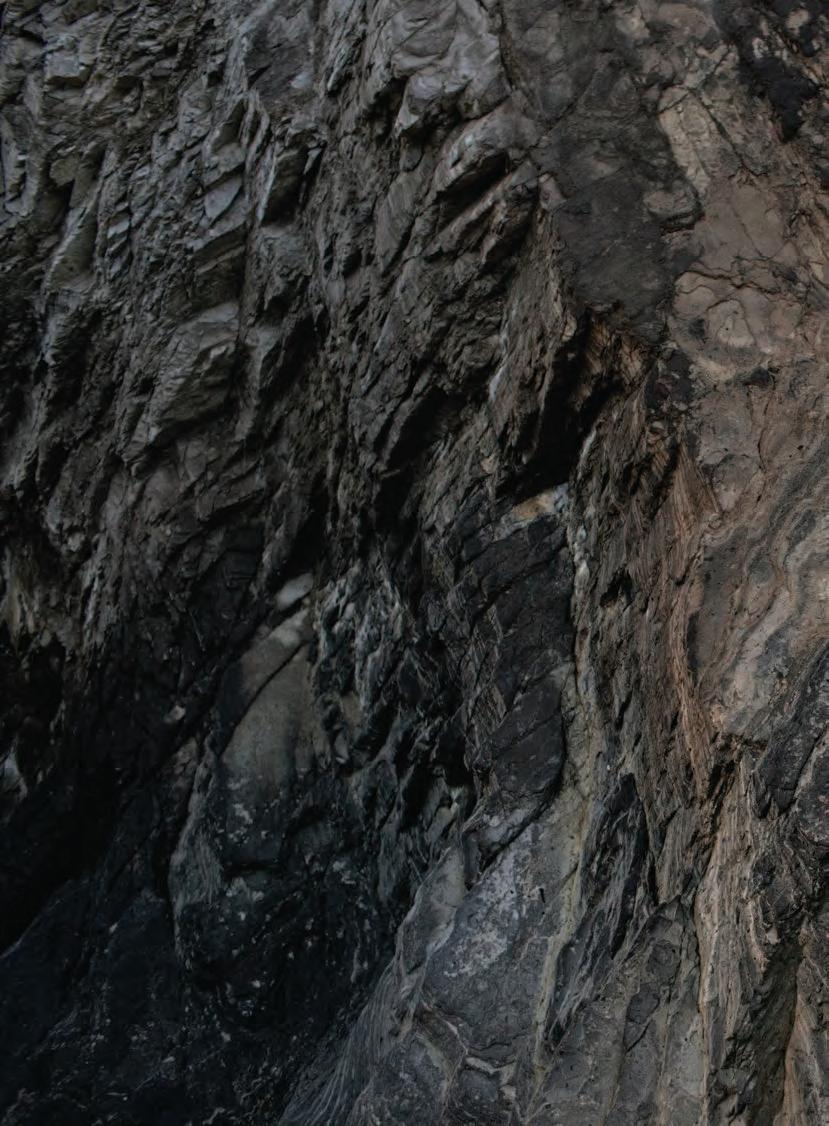
TERROR ON THE CLIFF
All that saved Larry Bishop from a 300-foot drop into a yawning chasm was his fingertips —and the will to live
PHOTOGRAPHS
BY PETER BOHLER

53







When the trio rounded a bend in California’s Sierra National Forest and saw the rocky ascent to the peak, the eldest of the group, 72-year-old Birde Newborn, turned back. She suffered from heart trouble and didn’t want to push her limits. Her companions Larry Bishop and Cerena Childress made it another hundred yards to the last dip before Dogtooth’s jutting apex. They paused beneath a wind-twisted cedar to contemplate the final 100-yard stretch, which required a scramble over massive boulders.
To Bishop, a retired hazardousmaterials specialist for the fire service, the challenge seemed small. At 64, he was lean and vigorous. He’d been hillwalking on and off since he was a Boy Scout; in recent years, after returning to the hobby, he’d bagged some of the highest peaks









 BY KENNETH MILLER
BY KENNETH MILLER











Dogtooth Peak towers
10,300 feet above sea level, jutting from the surrounding rock like a hand reaching for the sky. On a Thursday morning last July, three friends eyed the peak and began the ascent from the lakeside where they’d spent the second night of a camping trip. The group, all experienced hikers, wasn’t daunted by the twomile stretch up gradually rising switchbacks to the peak’s base. But the final trudge towards the summit was a different story.
in the US. Compared with 14,000-footers such as Mount Whitney or Mount Langley, he thought, this was nothing.
Childress, 67, was a passionate fan of the outdoors, the most seasoned member of the informal backpacking club she’d co-founded with Newborn and Bishop. Still, she wasn’t as limber as she used to be. “Those rocks look like leg breakers,” she said when Bishop asked if she was coming. “Anyway,” she added, nodding towards her spaniel, “Clover wouldn’t make it. I’ll wait here.”
Bishop removed his rucksack so that it wouldn’t upset his balance on the uneven terrain. “I’ll run up and take a few pictures. Back in no time.”
“Give a shout if you find that easier trail we saw online,” Childress said. “Or if you break your leg.”
54 READERSDIGEST.CO.UKJUNE 2013
MAP BY 5W INFOGRAPHIC
Peak C A L I O R N I A F Si e r ra Nevada San Francisco Los Angeles
Huge boulders line the final yards to the summit of Dogtooth Peak
Bishop laughed and strode off, swinging his walking poles. The website they’d consulted had mentioned an alternative route to the peak, but there was no sign of it as he clambered through the boulder field. It took him just 15 minutes to reach the top, where a group of Outward Bound instructors and students were practising abseiling. He joined them in admiring the gorgeous panorama. He cupped his hands and shouted to Cerena to join him. He heard no response.
As he started down, Bishop noticed a cairn—often used to mark a trail. Was this the easy way? He headed in the direction it seemed to indicate.
The path down from the summit quickly grew steeper. There were no more markers, but Bishop saw a flat, sandy patch about 30 feet below; perhaps it led to an outlet. Soon the slope was nearly vertical, and he had to face the rocks and
use his hands to lower himself. Then his foot slipped and he was sailing through the air.
THE LONG VIEW
Dazed, he lay in the sand, trying to piece together what had happened. He’d fallen only ten feet and no limbs were broken. But when he touched the back of his head, his hand came away bloody. Bishop pulled some paper towels from his pocket and stuffed them inside his broad-brimmed hat to cover the wound. He considered calling to the Outward Bound group, but he wasn’t badly injured. And he was confident he could find his way down.
This trail, he now realised, wasn’t so easy after all; in fact, it didn’t even seem to be a trail. Climbing back up would be too dangerous. But if he descended a bit further, he thought, he could navigate around the base
►




Terrifying drop:
Bishop looks past his feet to the canyon below
of the peak. He began to follow a narrow drainage channel down the mountainside. It soon led him to a vast expanse of granite, as steep and slick as a playground slide, which emptied onto a boulder field 600 feet below. Bishop tried using the edge of a slab for traction, but his boots shot out from under him and he skidded a short yet terrifying distance. He tried again—and skidded again.
Just below him was a shallow depression in the rock. He scuttled gingerly down to it, wedged his backside into the crevice and planted his poles in two cracks to hold himself in place.
Clinging to the side of the mountain, he began to understand his predicament. He’d left his mobile in his tent, but there was no reception here anyway. He had an emergency whistle, but it was in his rucksack, along with his water bottle, cereal bar and jacket. The sun beat down and he was already thirsty. He shouted for help, but the only response was the echo of his own voice.
Fishing in his pockets, Bishop found a few mints, his camera, his diary and a pen. He popped a mint into his mouth to fight the dryness, then took a photo of the landscape and another of his own face. It was 2pm. In the diary, he wrote to his wife and their 30-year-old daughter, beginning, “Kal and Sarah, I love you. Sorry I can’t make it.”
Then he explained how he’d got into this mess. If someone found him at the bottom of the cliff, he wanted his family to know what had happened.
At the base, Cerena Childress was recovering from a nosebleed, probably brought on by the altitude. More than an
hour had passed since she thought she heard Bishop calling her name, and there was still no sign of him. She didn’t dare try to reach the summit and there was no one else to ask for help.
Around 1pm, she noticed that Clover’s paw was bleeding. She’d have to carry him back to camp and the going would be slow. Maybe Larry is lying out there hurt, Childress thought. If so, sitting here won’t do any good. Or maybe he decided to have an adventure. In any case, she needed to get back to camp before dark.
But when she arrived two hours later, she learned that Birde Newborn hadn’t seen Bishop either. It was too late to hike out and alert the authorities.
PARTI NG WORDS
Bishop felt relieved as shadows covered the rock and the heat grew less brutal, but as the temperature dropped he began to shiver. Periodically, he shouted for help, mostly to hear the sound of someone’s voice. Each time a plane passed over he experienced a surge of hope, then a rush of disappointment. In his diary, he scribbled observations (“Facing death, the world sure looks beautiful”), regrets (“If only I’d brought my jacket”), resolutions (“I will cherish water”).
Sleep, he knew, would be fatal—if he let his limbs go slack, he’d slide 600 feet down the mountain. So, as darkness fell, he began to sing every song he knew: Beatles tunes, folk songs, lullabies he’d sung to his daughter when she was a baby. The lyrics to “Help Me Make It Through the Night” took on a special urgency. He watched the constellations wheel overhead and tried to remember all their names. To keep warm and ward
56 READERSDIGEST.CO.UKJUNE 2013
◄
off cramps, he did t’ai chi exercises, moving his arms and legs as much as his awkward position permitted.
Still, by the time the eastern sky grew pink, he was sore in every part of his body. At 5.30am on Friday, he wrote a journal entry: “Survived until sunrise.”
Around the same time, Childress and Newborn were watching the rays filter through the fabric of their tents. Neither had slept much. The night before, they’d learned from a camper that the closest place to make a call was at Courtright Reservoir, a nine-mile walk eastward through rugged terrain. As the faster hiker, Childress volunteered to make the journey. She set out at 7.30am.
Newborn—leading Clover—headed for the trail they’d started from, five miles to the west, where Bishop’s car was waiting in the car park. (Fortunately, he’d left behind a set of keys.)
At 12.30pm, after taking a wrong turn that led to a six-mile detour, Childress stumbled up to the caretaker at Courtright Reservoir and gasped out her story. The woman called the police on the nearby power station’s satellite phone. By late Friday afternoon, Childress and Newborn were watching searchers assemble to hunt for their friend.
A M I ND’S TR IC KS
Around 10.30am, Bishop decided to move to another dimple in the rock, 30 feet below, which appeared more comfortable. He calculated that he could reach it by rolling onto his belly, then using his poles to make a controlled slide. But the instant he rolled over, gravity took hold. He sped past the hole, accelerating
SLEEP would be fatal. If he relaxed, he’d slide down the mountain
for 300 feet, until his feet rammed into a small ridge.
Heart pounding, he lay there for several minutes, then checked himself for damage. His limbs were still intact, though much of his body and face was rubbed raw, and his elbows were bruised. His trousers were shredded too, and he’d lost his wallet and his hiking poles. Slowly, Bishop edged down another 50 feet, stopping at a small hole where purpleflowered plants were growing. He chewed on a stem, hoping for some moisture, but it only made him thirstier.
Bishop continued on to the lowest possible resting place—a dent in the granite that was just deep enough to cradle his hip, with a foothold below it and a handhold above. From there, the slope ran its last unobstructed 300 feet into the boulder field.
Around 3pm, he saw a helicopter buzz by and was gripped with despair when it didn’t slow down. Then he spied something beyond the boulders that he hadn’t noticed before: an abandoned ski lift. There were tents scattered among the pylons, a man painting at an easel, and a car. Bishop waved and shouted, but when he looked again, it had all vanished—there were only pine trees.
He realised he’d been hallucinating, ►
57 JUNE 2013READERSDIGEST.CO.UK
◄ the searchers concentrated their efforts there. Around 4pm, Deputy David Rippe was combing the base of the peak when he heard what sounded like a moan.
his senses deranged by dehydration and sleeplessness. Two hours later he saw three beige helicopters circling, with men in sunglasses gazing down at him. He gestured and shouted himself hoarse. They disappeared, and again he realised his grasp on reality had lapsed.
Finally, at 7.15pm, Bishop saw a police chopper cruise past. He was absolutely certain this one was real—and this time
“Did you hear that?” he asked the deputy beside him.
The deputy Greg Villanueva nodded. Then he pointed to the cliff face and exclaimed, “I see him!”
A tiny figure was dangling from the rock, clearly struggling to hold on.

he was correct. But in his drab clothes, against the expanse of rock, he was an invisible speck. The pilot never saw him.
On Friday night, three police deputies went into the wilderness with rescue volunteers. They scoured the mountain until well past midnight. Then, after dawn on Saturday, they began again. Childress, who’d slept in the car with Newborn, joined the effort that morning, breaking her hand in a fall along the way.
In the afternoon, one party ran into the Outward Bound group that had met Bishop on Dogtooth Peak. After learning that he’d headed down the eastern side,
Bishop’s diary. One entry read, “Trying to hang on. Will slide to death if I crawl from here”
Bishop had managed to stay alert through the second night, but as the day wore on, he couldn’t stop himself from dozing, and when he awoke, he found he’d slipped down to a spot where only one foot and one hand could grip the wall. He kept dragging himself back up, but the effort was growing increasingly difficult.
Finally, he slipped into a dream: he saw a giant clock with a hand that was ticking backward towards zero. He understood that zero was death, and the only way to stop the hand from getting there was to resist the urge to relax.
A new thought occurred to him: Maybe if I let go, I can survive the fall. But before he could give it more thought, he saw men in orange vests running towards the bottom of the cliff.
TH E R ESC UE
Plotting a safe route up 300 near-vertical feet of slippery granite takes careful consideration. Deputy Rippe didn’t have
58 READERSDIGEST.CO.UKJUNE 2013
GRAVITY took hold. He sped past the hole and his feet rammed into a small ridge
time for that. Instead, he shouted for everyone to stay away from the area beneath Bishop. Rippe shouted for one volunteer to come with him, then scrambled upwards. Behind him, Russ Richardson, one of the volunteers, rocketed up a different route. Rippe’s trajectory was more accurate—within minutes he was crouching on a ledge directly above Bishop. His leg was shaking with strain and he was covered in scrapes and bruises.
“I’m here,” Rippe said. “I’ve got you. You’re safe.”
That wasn’t entirely true. First, Rippe had to move Bishop to the ledge where Rippe was perched, a task that put both men at risk of tumbling off the cliff. To lessen that possibility, Rippe improvised a sling, threading a length of webbing between Bishop’s legs and looping it around a knob in the rock. Pinning the loose end with his knee, Rippe grabbed
Bishop under the arms, hoped for the best and pulled.
An instant later, they were sitting side by side. His throat so parched he could barely speak, Bishop croaked out thanks as profusely as he could.
“Have you been in that position all this time?” the deputy asked. Bishop tried to answer, but he’d used up the last of his strength.
A helicopter flew Bishop to hospital, where he was treated for abrasions and dehydration; he was discharged the same day, and spent the night with Childress and Newborn in a motel. The next morning, his wife Kal took him home.
She did some lecturing, but she knew the same determination that had helped lead her husband into danger had kept him clinging to the cliff. Bishop himself is thankful for many things—beginning with the searchers who found him as his time was running out. He’s learned a few lessons too: “Don’t be so impulsive. Realise I have limits.”
Rippe came away with a different insight. This was the first time he’d found a missing walker alive who was in a predicament like Bishop’s. “Usually, by the time we get there, it’s a body recovery,” he explains. “This shows you never give up hope. Anything is possible.” ■
Looking for a Good Read? Don’t Try These…
Afterthoughts of a Worm Hunter by D W T Crompton
When Mother Lets Us Make Paper Box Furniture by G Ellingwood Rich
A ordable Tedium by Nancy Shaw
The Baking Powder Controversy by A Cressy Morrison
59 JUNE 2013READERSDIGEST.CO.UK



 Family Guys
Family Guys
To mark Father’s Day, we asked these very di erent men what it’s like to be a modern dad
BY ANDY HAMILTON (PROUD FATHER OF LOKI, AGED SIX MONTHS)

Bundles of fun
Sean McCarney, 48, is an air-tra c controller, who lives in Salisbury, Wiltshire, with his wife Nicki and Caitie, six.
My job is high-stress, with unsocial hours and little room for letting your hair down. So to get home and enter a world where the laws of physics don’t apply is a great help. My wife’s a youth leader, so Caitie gets to do a lot of outward-bound stu with older girls during the day. I then feel morally obliged to explore the dafter side of life with her!
The hardest thing about being a parent is the fear of failure. There’s an inclination to second-guess your decisions. This is especially so in the case of Caitie’s religious upbringing—I’m Catholic, but I don’t want to be the Bad Dad forcing her to say her prayers; I want her to love Christ for who He is.
My faith was the greatest gift my parents gave me. I left the church for many years and came back when I was 40. When I stopped attending Mass, it hurt my father— I’ll always regret that. But all I can do is to give the same gift to my daughter. If she decides to put it away, I’d have to respect her choice.
SAM FROST PHOTOGRAPHY
The biggest mistake I’ve made as a parent was that I didn’t carry her in my arms more when she was younger. That’s a magic time when you’re head-to-head and can have the most amazing secret conversations the rest of the world can’t hear. I’m making up for lost opportunities now, but she’s a leggy six-yearold and I’m not sure how much longer my back will hold out.
Caitie gives me the chance to do things I didn’t do as a child, like watching Disney movies or going to the circus. She still talks about the circus now, and I know I’ve given her a special memory.
►
61 JUNE 2013READERSDIGEST.CO.UK
Make some noise

Matt Ogborne, 34, an online marketeer, lives in Bristol with his wife Helen, Abigail, five, and Sophie, four. I want my kids to be heard all the time and I encourage them to be noisy. We had a little boy called Alex who was stillborn, so it freaks me out when they’re quiet.
Children think everything is new—they haven’t become immune to all the stu adults take for granted. The supermarket, for example. Why on earth wouldn’t you want to run around and play with everything? There’s stu to open and kick around, and the toy section…well, that’s a riot! Each time the girls are shouted at, I see this enthusiasm ebbing away.
I have a lot of tech in the house. In the morning, the kids happily have a go on the iPad, but they tend to want to play with the cheap stu . We bought a Wii last year and it’s hardly been out of the box. Who needs piles of toys when they can splash about in a bowl of water outside on a warmish day for hours and be as happy as Larry?
Because of my job, many of my closest friends are online and scattered around the country. They can’t watch the girls for half an hour while I run an errand, but they’re good at giving me a di erent perspective as problems come up. It’s quite a community and one I hope to share with the girls. I want them to become entrepreneurs, to build their own paths, and to do so they need to look at the world di erently from everyone else.
Back to nature
Farmer, historian and author John LewisStempel, 49, lives with his wife Penny and two children Tristram, 18, and Freda, 15, in Hereford. When my son was born, I was a 30-something with left-of-centre views, lived in a city writing books, was in a relationship with my “partner” and had hair Brad Pitt would understand.
Within a year, I was married (in a church) and had moved to the country. In another year or two, I had slightly right-of-centre views and wore tweed. In other words, I’d turned into my father.
I thought fatherhood was going to be a hippy, carefree experience. Alas, someone has to pay the bills. One of the biggest issues I’ve had as a dad is not having a regular income. Farming and writing? Both feast and famine. Kids like constancy. I’m hardly surprised that my son wants a regular salary as a doctor.
But fatherhood is a state I work at, like a marriage. I come from a background where letting it all out would be
62 READERSDIGEST.CO.UKJUNE 2013 COURTESY OF MATT OGBORNE

regarded as quite ridiculous for a man. I’m very happy to help my children in any way I can, but if they want to do emotion or feelings they’re better o asking their mother. There are just some jobs one sex does better than the other. I’m
court jester and wallet. But I’ve always shared childcare with my wife.
I’m forever banging on about valuing nature, particularly as modern children seem to be stuck in front of screens. I make mine go blackberry-picking,
have bonfires, climb mountains and spot birds and flowers. My daughter may be the last child in Britain to be able to tell a buttercup from a celandine.
I go shooting with Tristram. We rarely hit anything (and “you kill ►
63 JUNE 2013READERSDIGEST.CO.UK DAN GOLDSMITH/SCOPEFEATURES.COM
it, you eat it” is a family rule), but that isn’t the point. It’s about walking together and connecting with each other and the countryside.
My children went to a Steiner Waldorf school and weren’t educated formally until they were seven. I think it’s an utter waste of time below that age. Much better to be playing and having fun. It didn’t do them much harm; both won academic scholarships to well-known schools, and my son is now studying medicine at Edinburgh University.

I do take my children to McDonald’s. My son has a nut allergy, and it’s one place where he can eat safely. Sure, McDonald’s is big, bad capitalism. It’s also more responsible on allergies than any number of “alternative” food enterprises you can name. Also, I think one should be able to feel comfortable in any social milieu.
An unexpected blessing
Food-factory manager
Dave My, 33, lives with his wife Karen in East Sussex. Their daughter Lizzie is 12.
I was 20 and still at Glamorgan University with Karen when we discovered she was pregnant. We’d only been together for about a year and we wondered how on earth it was all going to pan out. But I had that confidence of youth where you think, Let’s just get on with it.
A lot of my peer group were in reasonably long-term relationships, so we were in a stable environment. If my friends had been young men going out getting drunk all
64 READERSDIGEST.CO.UKJUNE 2013 COURTESY OF DAVE MY
◄
night it would have been a di erent story, so I was glad that I’m a little bit boring.
You might expect our parents to have been angry, but they were fine. My dad felt that I was a similar age to him when he became a parent. Some people of any age group can step up and get on with fatherhood, and others can’t.
Although not financially secure, neither Karen nor I are work-shy and we both got part-time jobs. We never contemplated whether or not we should have Lizzie— just whether we should stay at university. I wanted to go straight out and get a job, but luckily there was enough financial help from the college to help us stay on.
Having Lizzie early meant that Karen hasn’t had to take a career break, and her civil-service career is now rocketing. Our earning power has gone up with age and we can give Lizzie things that cost a little more. It feels like we’ve given her a whole range of experiences, though, as we had no choice but to do cheaper stu when she was young. We really got into camping and this kept Lizzie active from an early age.
Diverse cultures
Ketan Shah, 37, is an IT engineer from She eld. He and his wife Pratibha have a seven-year-old daughter called Molly. From the moment I first held Molly, she was the centre of my life. I knew I had to take care of her and I also felt she was part of us. It’s an overwhelming experience.
At first, I worried how we’d cope. We moved to Britain from India in 2004 and didn’t have any family here. But I found that being a dad is about striking a balance —between work and family life, leisure and time in front of the TV. Some parents are overprotective and some aren’t protective enough, so we look for balance there too.
Pratibha and I are Jains, so we’d like to bring up a child who follows our beliefs and is vegetarian. We manage the journey back to India once a year, and we make sure that Molly is aware of all our festivals and heritage. It’s important she knows that her background is di erent.
Our friends are starting to have kids, and we’re thinking, You know what, having a child is really hard work. It might sound cold, but we don’t need another. We’re a happy family and why change that?
But I can’t imagine how life would have been if Lizzie hadn’t come along. I’d underestimated the joy I’d feel when I met her and the massively strong bond. I think my need to protect her has been part of my growing-up process. She’s been brought up in a stable environment and we now have a loving and self-su cient daughter. I couldn’t ask for anything more. when she was young. We really got into her and the massively strong bond. I think my growing-up process. She’s a loving and self-su cient


But it’ll always be her choice which religion or diet she follows.



COURTESY OF KETAN SHAH
►
We can only lead by example. If we preach too much, she’ll ignore us, especially when she’s a teenager. The best thing is to let her experience things and guide her when she’s in the mood to listen. In Britain, Molly meets people from di erent religions and from all over Europe—and a multicultural upbringing can only be a positive thing.
I like doing the simple things with her: going to the park; riding bikes. I always try to build her confidence. She was worried about climbing, so we went to loads of
di erent parks with all sorts of di erent climbing frames. I really wanted her to know that if she works hard, she can do almost anything. We highlight even the small things she does well. This might be why they make her really happy, and we can learn from her that we too should appreciate the little things.
When she grows up, I’d be absolutely as content if she wanted to be a waitress as if she wanted to be a vet—if she gives it 100 per cent. Ultimately, all anyone would want her to be is a really happy person. ■
How to Burn Your Bridges

Most of us have had times when irritations at work threaten to boil over. But there are some resignation letters that show a real determination to go out in style.
Writing a newspaper column entitled “Why I’m Leaving Goldman Sachs”, for example, takes some beating. In the article, penned last year, director Greg Smith claims, “If you make enough money for the firm (and aren’t currently an axe murderer) you’ll be promoted into a position of influence.” It’s a similar epiphany to that
of hedge-fund manager Andrew Lahde, who declared in the Financial Times after the 2008 financial crisis, “What I’ve learned about the hedgefund business is that I hate it.”
Slightly lower down the earnings scale, spare a thought for the putupon flight attendant at JFK Airport in 2010, who endured one too many insults. “To the passenger who just called me a motherf*****, f*** you. I’ve been in this business 28 years and I’ve had it,” he shouted over the intercom, before suddenly exiting the plane via the inflatable emergency chute.
It’s not all negative, though. Earlier this year,
Chris Holmes quit his job at the Border Agency to run his own baking business—and iced his resignation letter on one of his own cakes. The management was amused, the sta lapped up the cake (“made with coconut, pecans, sultanas and orange buttercream”), and Chris got lots of free publicity when the story went viral.





66 READERSDIGEST.CO.UKJUNE 2013
◄
Every year thousands of people put their faith and trust in Cats Protection when looking for a new addition to the family. Behind each volunteer and member of staff is a wealth of experience and expertise which means when you adopt one of our cats, you can feel safe in the knowledge that he has been given the best possible care.
When he leaves Cats Protection, your cat will have been treated to a top-to-tail medical.
This means he will have been:
• Fully examined by a veterinary surgeon
• Vaccinated at least once against flu and enteritis
• Treated against fleas, roundworm and tapeworm
• Neutered if old enough
• Microchipped

We also provide four weeks’ free insurance (terms and conditions apply) giving invaluable peace of mind and reassurance as you and your cat embark upon this lifelong friendship.
All he needs now is a loving home to make his dreams come true – over to you!
T: 03000 12 12 12
E: helpline@cats.org.uk
W: www.cats.org.uk
Reg Charity 203644 (England and Wales) and SC037711 (Scotland)




From bionic limbs to bandages that help the blood to clot, the conflicts in Iraq and Afghanistan have had some surprisingly beneficial side e ects, finds Susannah Hickling
surprisingly beneficial side e
HOW WAR HEALS
HEALS


T
wenty-three-year-old Tom Connelly loves his job, but it was very nearly the end of him. In April 2011, the tree surgeon from Clophill in Bedfordshire was 60 feet up a tree cutting branches. Suddenly, his left foot slipped and he rolled onto his chainsaw. “I looked down and my arm was dark red,” he recalls, “I could see blood dripping off my fingertips.”
His workmates, trained in first aid, quickly lowered him to the ground. They did all they could to staunch the blood spurting from a large gash in his neck.
Tom had severed some major blood vessels, including his jugular. When the air ambulance belonging to emergency medical charity Magpas arrived, paramedic Dan Cody could see that stopping Tom bleeding to death before getting him to hospital would not be easy. “Given the location and severity of the wound we recognised it would be difficult using conventional methods alone,” he says.
devices. Impregnated with a substance derived from crushed shellfish, it helps the blood to clot by reacting with the red cells to create a sticky gunk that seals the wound.
Dan had never had to use Celox on a real injury before, but he packed the gauze into Tom’s wound and applied pressure. It worked and Tom survived. He still has some impressive scars on his


But Tom’s luck was in. Dan is a reservist army paramedic and had recently recommended that Magpas include a new type of bandage in their kit. Having served in Iraq and Afghanistan, Dan had been trained to use Celox gauze, which the British military employs on the battlefield for catastrophic injuries, often caused by improvised explosive
neck, but is now back doing what he loves: climbing trees for a living. “Without Magpas and Celox, I wouldn’t be here,” he says.
Introduced during the Iraq war, this bandaging breakthrough could now have a revolutionary effect on the treatment of civilians. It’s estimated that 250,000 people in Europe bleed to death every year. Not to mention the 30,000 Britons annually who have heart surgery in which blood-thinners can lead to haemorrhages.

70
GEOFF ROBINSON
(PREVIOUS SPREAD) TECH. SGT. THURLBY, U.S. AIR FORCE; PHILIPPE PSAILA/SCIENCE PHOTO LIBRARY
Left: Tom Connelly after his accident; and (right) pictured later with the paramedics who saved his life (Dan Cody is on the left)—with a little help from Celox gauze
And Celox is far from the only medical advance to have come—or be on its way—via the wars of the past few years.
Improvements in emergency procedures, more effective blood transfusions, better reconstructive surgery and even bionic limbs: all of them began life on the battlefield.
“In an ideal world, war wouldn’t happen, but there’s a positive side in that
Blood pressure
At Camp Bastion hospital in Afghanistan, around 90 per cent of casualties survive: more than in any other war in history. Medics have halved the number of deaths from massive haemorrhages by equipping emergency response teams with blood and transfusing it in rescue helicopters. Received medical wisdom had held that patients were more likely to haemorrhage to death if they received blood too early, so they were given saline fluids to keep blood pressure up until they reached hospital. In Afghanistan, doctors learned that this was actually stopping the blood from clotting.
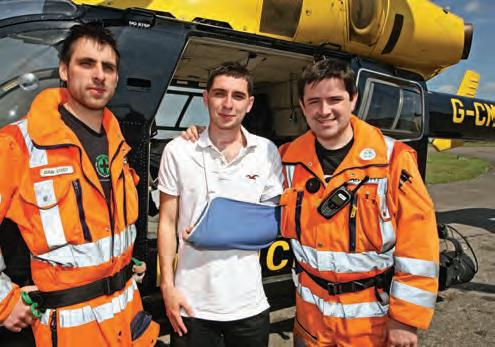
the experience accumulated translates into better medicine for the NHS,” says Anne Weaver, consultant in emergency medicine at the Barts Health NHS Trust and lead clinician with London’s Air Ambulance. And there are other positive side effects too. Armed conflict brings far more funding for new products because they’re needed quickly, and provides a huge testing ground to improve treatments and procedures. Put all these things together and it’s clear that war has the ability not only to kill but—yes—also to heal.
This discovery is already beginning to benefit civilians—with the help of another Afghanistan invention. Blood is highly perishable, but London’s Air Ambulance has started carrying it on board its helicopters in a special cooler whose sophisticated insulating technology allows four units of universal group-O blood to be stored for 72 hours. The service carried out 60 pre-hospital transfusions in the first seven months of using it.
“Before, we had patients every week who died,” says Weaver. “It was a huge source of frustration. But the box has definitely saved lives.”
As has a lesson learnt in Iraq. A 2007 study from the Brooke Army Medical Centre in Texas found that when ►
71 JUNE 2013READERSDIGEST.CO.UK

patients with catastrophic combat-related injuries received the same ratio of plasma to red-blood-cell units, the mortality rate was 19 per cent—compared to 65 per cent when they were given the standard one unit of plasma to eight of red blood cells.
Red, alert: London’s Air Ambulance; and (inset) their new combat-tested tourniquet
This all adds up to good news for civilians. “Severely injured patients with massive blood loss are three times more likely to survive today than ten years ago,” says Karim Brohi, professor of trauma sciences at Barts and the London School of Medicine.
The return of the tourniquet
Sometimes it takes another conflict to show that the old ideas are the best. Tourniquets were first used in the Napoleonic wars, but they went out of vogue after Korea and Vietnam—where, as Professor Brohi explains, “the experience was that they led to unnecessary loss of limbs because they were left on too long”. Either that, or they weren’t put on tightly

enough and didn’t staunch bleeding effectively.
“But they were just a piece of cloth or rubber that you had to wind with a stick,” says Professor Brohi. New lightweight tourniquets with a built-in winder made for use in Iraq and Afghanistan have tested 100 per cent successful in stemming blood flow. “Every soldier now carries one on him and they can be applied one-handed.”
Back in Blighty, ambulance crews and paramedics are now adopting them.
Fast track to life
At Camp Bastion hospital, no time is lost when service personnel—sometimes several in quick succession—arrive to be treated. One procedure that emergency
72 READERSDIGEST.CO.UKJUNE 2013
BB C ; C OU RTESY OF MATT HE W BELL/LON D ON ’S AIR AMB ULA NCE
doctors have instituted is “Right-Turn Resuscitation”, in which the team bringing the most gravely wounded bypasses the emergency department and turns right to the operating theatre. There, patients go straight to the state-of-the-art CT scanner, giving the medical team a precise diagnosis within seconds.
UK hospitals are following suit, including King’s College and St George’s in London. Not only is this strategy helping people with life-threatening injuries, but it could be a life-saver for stroke sufferers, who need rapid brain imaging to confirm the diagnosis. Doctors can then administer clot-busting drugs, which have to be given quickly.
Intelligent knees
Seeing British discus powerhouse Derek Derenalagi in action at the 2012 London Paralympics, it was hard not to marvel at
his incredible five-year journey from being pronounced dead after both legs were blown off by a mine in Afghanistan, to becoming an elite athlete. Equally incredible are the Genium prosthetic legs he uses. Made by German manufacturer Otto Bock, the Genium has a bionic knee that adapts to the wearer’s gait, giving the kind of mobility amputees have always dreamed of. But we wouldn’t have it without war.
Modern medicine means that many more soldiers are surviving conflicts, but with appalling disabilities. Around 250 British soldiers lost limbs in Afghanistan and some 2,000 US service personnel had major amputations between 2000 and 2011.
“The US military saw the need for a high-spec prosthesis,” explains Jamie Gillespie, consultant prosthetist at UK firm PACE Rehabilitation. “They collaborated with Otto Bock and produced a working knee, designed with the
► From Afghanistan to the Paralympics: the Genium prosthetic leg is put through its paces

PH ILI PPE PSA IL A /S C IEN C E PH OTO L IBR ARY

Despite being paralysed from the chest down, Claire Lomas reaches the last mile of the 2012 London marathon—in a robotic suit inspired by the US military
young, active military amputee in mind. The Genium is a civilian version with a few less bells and whistles.”
Another war-inspired bionic limb helping some of Britain’s 60,000 civilian amputees is the Rheo, made by the Icelandic company Össur—the first knee to have artificial intelligence. “It puts me out of a job,” laughs Gillespie. “I just bolt it on, and it takes care of itself. The patient walks a number of steps, which calibrates the knee and puts information in—and the leg can then use that to learn by itself.”
And then there’s the iLimb artificial hand, from the Scottish company Touch, which has fingers that move independently. “They pick up a tiny electrical impulse on the stump when someone contracts their muscle,” says Gillespie. “That’s then used to power the hand.”
The Iron Lady
For many years, the US military has been trying to mimic science fiction by developing a robotic armoured suit that will turn its fighters into Iron Men. It set to
work with General Electric in the 1960s to produce the Hardiman that, thanks to hydraulics and electricity, made a soldier 25 times stronger than usual. But while it could lift huge weights, it was unusably heavy itself. The US is still pouring funds into a workable solution.
Meanwhile, others have taken up the idea for other reasons. In a world first, 32-year-old Claire Lomas, paralysed from the chest down in a riding accident, used a bionic suit to complete last year’s London Marathon in 17 days.
“They’ve reverse-engineered something [that was originally designed] for able-bodied people to suit disabled people,” says Dave Hawkins, managing director of Hull-based Cyclone Technologies, which fitted Claire’s Israelimade ReWalk suit and trained her to use it. It has motors at the joints and uses motion sensors to get the wearer standing, walking and even climbing stairs. It could help everyone from the 50,000 Britons living with a spinal cord injury to the 127,000 with Parkinson’s. Another unexpected benefit of war. n
When Crime Gets a Bit Cuddly
Two recent news stories suggest there’s an outbreak of conscience among the criminal class. In April, an anonymous Londoner revealed that his bike had gone missing—only to be returned the next day with a letter of apology and a Domino’s Pizza voucher attached. The self-confessed “bike thief” says she snatched it after a night out. “It was too late to catch a bus, and I’m too broke to a ord a cab,” she claims, praising the “lusciously smooth” ride home.
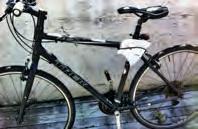
A petty crime, you may think. But the next day brought news that a truck driver in the US had the cremated remains of a relative stolen from his vehicle, along with thousands of rare gems. The thief hasn’t returned the jewellery (yet)—but, rather sweetly, he posted the ashes back to an address on the truck driver’s business card.
75 JUNE 2013READERSDIGEST.CO.UK
GETT Y I MAGES
‘‘LET’S NOT SAVE ART FOR THE NATION’’

Art critic Jonathan Jones says spending millions to stop paintings and sculptures going overseas is a dishonest waste of public money
“Save this masterpiece for Britain!” The slogan sounds noble. A painting is in danger, my friends, and it’s our patriotic duty to ensure this Titian/Manet/Dalí (delete as appropriate) stays enclosed by our silver sea. We won’t close our eyes while a poor suffering work of art is torn from the walls of its stately home and transported to some former colony to hang in a rich museum. Give your pennies and the Lottery or government will give its pounds.
But should lavish sums from the public purse really be thrown at keeping paintings in the country when cuts are being made to basic services and provisions? In such tough financial times, shouldn’t we take a hard look at what these hyperbolic art campaigns are really all about?
THINKING DIFFERENTLY!
A series of highly publicised initiatives to “save” works of art for Britain have in recent years nagged at the news headlines and plucked at the public conscience. The painter Lucian Freud, who made a point of never speaking to the press, went on TV
►

76 READERSDIGEST.CO.UKJUNE 2013 THE MAV E RICK

77 JUNE 2013READERSDIGEST.CO.UK ILLUSTRATED BY DA N IEL M ITCHELL
◄ A metal-detector enthusiast turned up an exquisite, eerily beautiful ancient Roman cavalry helmet with a godlike mask to cover the rider’s face. The Tullie House Museum in Carlisle wanted to buy it, but it couldn’t raise the funds, so this British treasure was sold to an unnamed private collector. Late last year, that secret owner lent it to the exhibition “Bronze” at London’s Royal Academy. How did such a glorious thing fail to grab the imaginations of bodies such as the Art Fund that campaign to keep art in this country?
to support the campaign to “save” Titian’s painting Diana and Actaeon for Britain in 2009. It was duly saved, along with its companion piece Diana and Callisto, which meant paying the Duke of Sutherland about £95m in total from a mixture of charitable donations and public funds. In the wake of this dramatic campaign, paintings by Manet, Poussin and Brueghel (although not the most famous of this painting family) have been saved for institutions including Cambridge’s Fitzwilliam Museum, Oxford’s Ashmolean Museum and the National Trust.
ART DOESN’T NEED “SAVING”. CHARITABLE FEELINGS SHOULD BE RESERVED FOR HUMANITY
One of the reasons the rhetoric of “saving” art stinks of dishonesty, pretension and elitist special pleading is revealed by that list of cosy institutions. Art isn’t really saved for the nation at all—it’s saved for a particular museum or gallery or stately home. It may technically be “ours”, but in reality it’s the plaything of curators to show off to us whenever and in whatever way they choose. That’s fine in itself, but why are these galleries all so posh? Why is it a matter of national importance for the Ashmolean to possess a Manet? I get the sense that your chances of persuading the art-loving world to support a campaign to “save” some work of art are a lot greater if your museum has the right connections.
My evidence? In 2010, an amazing archaeological find was made in Cumbria.
Presumably they’d answer that not all art has to be in public collections and not all art has to be kept in one country. But in that case, why use the silly language of “saving” art at all?
None of the recent high-profile campaigns to spend public money to keep artistic glories in Britain have concerned British artists. Titian worked in 16th-century Venice, but he didn’t paint exclusively for local clients. He created Diana and Actaeon and Diana and Callisto for Philip II of Spain. They were sent to Madrid as part of a series of mythological scenes specially conceived for the Spanish king. Titian’s art has always travelled. His works have always been coveted by the rich for their luscious beauty. His painting The Rape of Europa, which appears on the covers of countless history books as an image of European
78 READERSDIGEST.CO.UKJUNE 2013
culture and identity, actually belongs to the Isabella Stewart Gardner Museum in Boston, and few Europeans have seen it face to face.
That’s as it should be. Art is a luxury good that traverses global markets and ends up in unexpected places. The same natural flow that brought so many great paintings to our shores may take them away again.
In austerity Britain, should public funds be used to save art? Join the debate at facebook.com/ readersdigestuk or email readersletters@ readersdigest. co.uk
A great work of art is a universal human treasure—not a petty patriotic plaything. Besides, travel enhances the pleasure of discovery. It’s good to make pilgrimages to see art, or to chance on it in unexpected places. To see Titian’s The Assumption in the church of the Frari in Venice, an altarpiece still in its original setting with sunlight from the windows behind it shimmering against Titian’s painted golden vision, is a dazzling experience
that’s arguably worth far more than any encounter in a gloomy British gallery. If art “belongs” anywhere, it belongs where it was created. But no special sympathy of climate or language or culture says that paintings by a Renaissance Italian or a 19th-century Parisian bohemian or a Flemish artist of peasant life belong naturally in Britain, where such masterpieces ended up largely through the wealth of our landowners and industrialists from the 18th to early 20th centuries.
Art isn’t a person. It doesn’t need “saving”. Charitable feelings should be reserved for suffering humanity, or an endangered natural world. Great art will always find a good home one way or another. It’s a seductive survivor. n
Jonathan Jones is an art critic for The Guardian.
Brilliant Uses for Your Mobile Phone
The world of mobile applications is booming, with numerous young designers churning out apps that cover every area of our lives. But, as a recent study by OnePoll shows, the result is a number of concepts that fall into the “pointless” category. Here are just a few you don’t need:
Virtual Candle As the name suggests, this simulates a flickering candle.
Hold On! Simply hold down a button for as long as you can. Beat your own record!
You Are Rich Convince yourself with this fake shiny gem that glows on your screen.
Goggle Eyes Stare at a digital monkey that follows your head movements.
Sim Stapler Press an onscreen stapler to make a staple noise. Brilliant.
Toasted Marshmallow Pretend to toast a marshmallow in a fire.
Big Red Button Push a button to stop people talking. It’s that simple.
Taxi Hold ’Em A voice shouts, “Taxi!” to attract a cab—so you don’t have to.
79 JUNE 2013READERSDIGEST.CO.UK

“Google Glass”—high-tech glasses with built-in maps—are set to revolutionise how we find our way around. But we’re already pretty good at it, as this rough guide to navigation reveals
A Little Light Map Readıng
BY JO CARLOWE
BEFORE SATNAV: HOW HUMANS USED TO GET AROUND
Prehistoric cultures are known to have memorised their position by tracking the sun’s movements across mountain ranges on the horizon. In Homer’s Odyssey, Calypso tells Odysseus to navigate their ship by keeping the Bear (the star constellation Ursa Major) on his left-hand side.
But European sailors from classical times to the Middle Ages also used more advanced navigation techniques, such as the wind rose—a diagram plotting wind directions. And an international team of scientists reporting in Proceedings of the Royal Society recently recreated what they believed to be the method the Vikings used to navigate from Norway to America. The scientists found that if they held aloft Icelandic spars (transparent crystals) and rotated them, they could polarise light to detect the sun’s direction, even on cloudy days.
By the 11th century, the magnetic compass was being developed and was readily available when Christopher Columbus sailed to the Americas in 1492.
Icelandic spars (left), which could detect the sun’s direction, are thought to have been used as a navigational aid on Viking longboats

►
YOU’RE A NATURAL NAVIGATOR
In the 1970s and 1980s, biologist Robin Baker from the University of Manchester suggested humans, like animals, have awareness of the earth’s magnetic field.
He tested his theory on groups including nudists and the British orienteering squad. In rotating-chair experiments the nudists did best (because, Baker claims, they were free from electrostatic disturbances)—with 65 per cent able to point near the correct compass point, as against the 25 per cent expected by chance.
Baker’s views weren’t widely accepted at the time. But in 2011, scientists from the University of Massachusetts Medical School discovered that a light-sensitive protein present in the eye acted like a compass when spliced into fruit flies. This generates electrons that appear to spin in alignment with the magnetic field.
Meanwhile, Dr Hugo Spiers of the Institute of Behavioural Neuroscience at University College London reckons that (though more research is needed) humans have an “internal GPS system” in our brains. It comprises a number of specialist cells in the memory centre. “Place cells” light up as we pass specific objects, “head direction cells” tell us which way we’re facing, “grid cells” produce patterns that record our progress as we move, and “border cells” tell us when we’re close to a boundary (rather like your car bleeping as you approach a wall).

❱ In January last year, Holly the cat disappeared during the Richter’s family holiday in Daytona Beach, Florida, and walked 190 miles to her home in West Palm Beach. It took her 62 days.

HAVE MEN GOT A BETTER SENSE OF DIRECTION?
Not really. While tests on spatial ability usually favour males (suggesting an advantage in map reading), females are more e cient navigators. Researchers in Mexico tracked 21 pairs of men and women foraging for mushrooms. The men expended more energy —travelling further and higher—but both genders collected the same amounts. In hunter-gatherer societies, men needed to move randomly to track prey, and women had to remember the best spots for growing food.
Lyle Brotherton, a Scottish mountain-rescue expert, has noted another di erence between the sexes. Everyone has a dominant side when they walk, he says, and “you put a little more power into the step on your dominant side, making that step slightly longer. This causes people to walk in a curve—over large featureless distances, like a desert, they might eventually travel in a full circle. Inexplicably, women drift to their left and men to their right.”
82 READERSDIGEST.CO.UK
JUNE 2013 PETER CADE/THE IMAGE BANK/GETTY IMAGES
ANIMAL MAGNETISM
Many creatures are expert navigators because they can use the earth’s magnetic field to find their way. Scientists have discovered magnetite (iron-oxide crystals aligned to the north like a compass) in the heads of bats and birds, and researchers are close to pinpointing the exact brain cells that use the crystals to plot a course. Last year, geophysicists located similar magnetosensory cells in the nasal cavity of trout, which swim hundreds of miles to breed in the streams of their birth.

Simon Benhamou, research director of France’s National Centre for Scientific Research, who’s carried out experiments in the field.
Some animals also appear to be able to measure the strength of the magnetic field, which is generally strongest at the poles, giving them a sense of how far north or south they are. And it’s thought birds can sense the di erent angles that the field is tilted, allowing them to work out what latitude they’re at.
In experiments in the early part of the last decade, German scientist Hans Wallra disorientated pigeons by transporting them in rotating cylinders containing magnetic coils, but found that they were still able to “home”. Similarly, Indian Ocean turtles released into the sea returned to their egg-laying beaches despite having magnets strapped to their heads. How? It’s long been theorised that animals use an “odour map” based on smells such as pine forests, coastlines and city pollution.
“There are large odour gradients that may be used to infer one’s location,” says
Animals may also use the position of the sun and stars to navigate. In 1967, Stephen Emlen, from the Cornell Lab of Ornithology near New York, observed that birds let loose in a planetarium altered direction as the projection of the stars rotated.

❱ From December 21, 1982, amateur sailor Marvin Creamer sailed around the globe in 510 days using the stars and winds instead of instruments for guidance. In overcast weather he studied currents and wind patterns, but also garnered information from the composition and colour of the sea, cloud formations, the horizon, wildlife and drifting objects.
►
83 JUNE 2013READERSDIGEST.CO.UK GRANT FAINT/STONE/GETTY IMAGES
❱ The Inuit can find their way across seemingly indistinguishable tundra simply by the feel of the prevailing wind on their cheek.
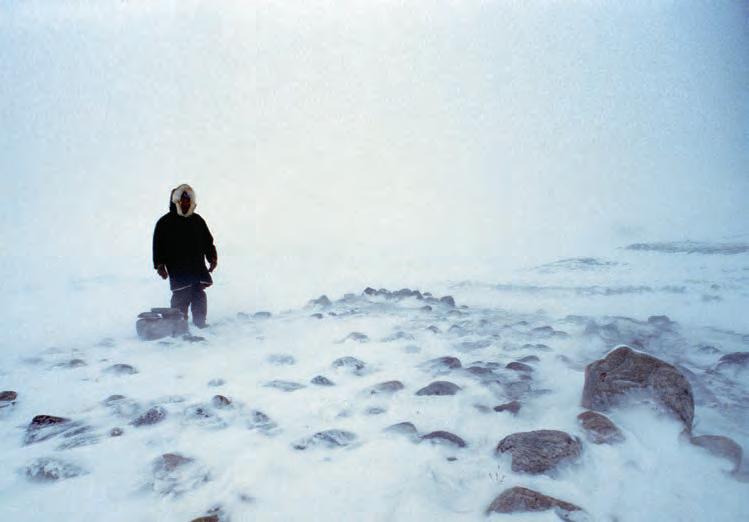
HOW TO BE A TECHNO- FREE NAVIGATOR
Surprising tips from the experts
IN THE COUNTRYSIDE
l Use the sun to work out where north is, but remember: the sun rises close to north-east in summer and south-east in winter. Only at the spring and autumn equinoxes does it actually rise in the east and set in the west.
Which way is the wind blowing? Try checking the trees
l In Britain, the wind tends to blow from the south-west so the tops of the trees appear “combed” from southwest to north-east.
l If you’re really lost, find a water course and follow it downstream. Streams usually meet rivers, and you’re more likely to find civilisation near these.

l Face the direction the wind is blowing and really smell the air. Tra c fumes suggest a road is close by. You may also pick up farmyard odours or factory fumes.
l Rip up cloth and tie it around trees to mark your trail, or bend branches to point in the direction you’ve come from.
l If you’re unsure which route to take in a remote area, study the ground— the path with the most wear and PA
84 READERSDIGEST.CO.UKJUNE 2013
UL MANSFIE LD PHOTOGRAPHY /FL ICKR / GETTY IMAGES GORDON WI LT SIE / NATIONAL GEOGRAPHIC/GETTY IMAGES
LOSING OUR WAY
Tristan Gooley, who runs the Natural Navigator training courses (naturalnavigator.com), says that when his students find the North Star they invariably check it against their phones’ compasses.


“People trust their kit more than nature,” he laments.

Does it matter? Experts agree it’s important we don’t let technology destroy our natural navigation abilities. After all, out in the desert, GPS batteries can fail or satellite links can be lost. And more worrying is the possibility that we could shrink our brains. Frequent navigators (such as taxi drivers) have more grey matter in their memory centres than others, and, says Dr Spiers, “The brain’s capacity will get stunted if bits of it are getting less use.”
foot tra c is probably the main one that will lead you back to civilisation.
IN THE CITY
l Find a church and check where the altar is—this usually indicates east.
l Feel the sides of something stone, such as a buttress. The warmest side will likely point south (the sun is in the south in the middle of the day).
l In the morning, if you want to find a train or bus station, walk against the flow of people. In the evening, follow them.
l Solar panels face south. Most British TV dishes point south-east at a satellite that remains constantly over the same point on the earth’s surface.
l In hot countries, harsh sun strips away paintwork, so the more worn side of a building is usually south.
l Follow sounds. The noise of train brakes, for example, will tell you that a station is close by. ■
Tips from The Natural Navigator by Tristan Gooley (£14.99) and Ultimate Navigation Manual by Lyle Brotherton (£14.99)

❱ In 2007, University of Queensland researchers tracked a crocodile that had been airlifted away from a popular tourist river for safety reasons. It swam back—more than 240 miles— within 20 days.

One direction: satellite dishes, which tend to face south-east, can help you navigate in the city
85 JUNE 2013READERSDIGEST.CO.UK PETER CADE/THE IMAGE BANK/GETTY IMAGES

Jason Isaacs
‘‘I remember...’’
...LIVERPOOL. I grew up on a street called Menlove Gardens West, just round the corner from where John Lennon grew up. I was born in 1963, but a lot of my memories are connected to the war. There was the bombed-out cathedral and the half-dilapidated buildings downtown.
...PLAYING FOOTBALL. No one’s ever quite sure, are they, whether their earliest memory is really a memory, or a photograph they’ve seen? Mine would be standing in a Liverpool kit in the field at the bottom of our street. Ours was a boy-heavy household. I have two older brothers, Geo and Brent, and one younger brother, Damian. There was a lot of sport and climbing and kicking and bashing. We were messy. It was like the house was turned upside down every day. A lot of my early memories are of being covered in mud, snot and blood.
...BEING A TELLY ADDICT. We had one of those houses with a front room where no one ever went and the furniture was never sat on, possibly in case that mythical visit from the Queen ever happened. Next door, though, was a little room where we crammed in to watch telly. And that’s what
we did as a family. The most divisive thing that ever happened to us was the invention of the remote control, because then we really had something to fight about. We watched TV all the time. It was basically like The Royle Family, but not quite as funny.
...RUINING MY PARENTS’ SOFA.
When I was seven, my parents bought a brown corduroy couch. One day, while they were out, curiosity got the better of me—I wanted to know what it was stu ed with. So I got the bread knife and sawed into the arm. I can remember thinking, “Ah. Interesting. Sponge. So that’s how they made this thing...” followed by a wave of horror as I realised this wasn’t going to go down well. I remember sitting there thinking, It’s so unfair that I’m going to catch hell for this. If they only understood it was about scientific curiosity...
...SKIMMING THROUGH READER’S DIGEST FOR THE JOKES COLUMN.
It was the only magazine we had on subscription. I remember thinking, If I can just remember these five jokes, I’ll be able to tell them at school and be popular. But they never quite stuck.
86 READERSDIGEST.CO.UK JUNE 2013
GETTY IMAGES; PERSONAL PHOTOGRAPHS COURTESY OF JASON ISAACS ►


“Aged one. My mum used to dress us all in fabulous and wildly inappropriate Sixties attire until we were big enough to object”



“Six years old, with my brother Brent. Growing up in Liverpool, football was our religion and the Reds were our gods”

“Aged five in a favourite T-shirt I’ve spent half a century trying to recreate. There’s nothing but pure mischief in those eyes”
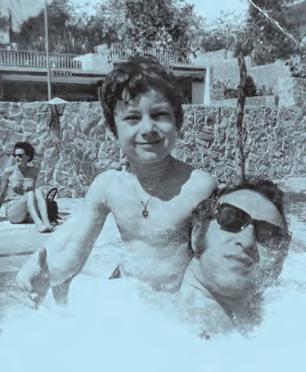

“My gentle dad looking like a gangster with sideburns and shades—the evenworse perms were to come later”
87
READERSDIGEST.CO.UK JUNE 2013
...GROWING UP JEWISH. Judaism had a massive impact on my childhood. I went to the youth club in the synagogue and took Hebrew classes twice a week. As a young kid, I couldn’t have been more aware that those people at school who weren’t Jewish were something other, that they lived in this mysterious world I couldn’t belong to.
It was only when we moved to London [when he was 11] and I started to go to a non-Jewish school that I realised [those attitudes] were my parents’ mindset, not mine. Now I have a non-Jewish wife and nonJewish children and it plays no part in my life at all, other than the fact it was a huge part of who I was. But I think it helps me perpetually to feel, and to remember to feel, what it’s like to be an outsider—to know what it’s like to be the victim of prejudice and to rail against it.
“Aged 13. The dreaded blow-dry years!”
irresponsibly, without any skill or knowledge of the road.
I’m afraid to say there were many crashes; some illegally when I was 16, and many when I started to drive [legally]. One time, I was driving to school with a bunch of other kids. I took the bend way too fast and the car rolled over two or three times. We ended up in a ditch, upside down. Being 17 and self-conscious, it was important to me not to be thought of as uncool. So we’re hanging there and I went, “No problem, guys. You go o to maths and I’ll see you in a minute...”


...THE RISE OF THE NATIONAL FRONT. When I was a teenager, the NF became big. We had windows broken in the youth club. People were sporting their slogans. We were beaten up and chased. It was pretty damn scary being a Jewish teenager at that time.
...TAKING EXTREME RISKS. Like all teenagers, I thought I was immortal and that the laws, both of land and nature, didn’t apply to me. At 16, I used to push my parents’ car out of the drive while they were asleep at night, pick up my friends and go for drives. And I’d drive amazingly
...MY FIRST TASTE OF ACTING. In 1982, I went to Bristol University to study law. It was the year The O cial Sloane Ranger Handbook came out, and everyone sounded like Hugh Grant. It couldn’t have been further from the world I grew up in. One night, staggering around the union building under the influence of ten-pence pints, I saw a poster that said, “Can you do a northern accent?” I wasn’t sure I could do anything well enough to fit in at Bristol, but I knew I could do that. It turned out to be an audition for a play. I did a Liverpool accent, obviously, and was cast as the lead. I think that saved me. From then on, I was lost to the world of theatre. and I’ll see you in a minute...”
...NOT TELLING MY DAD WHAT HAD HAPPENED. We rolled the car back onto its four wheels and I went to the garage, had it cleaned and the wheels straightened. I only told my father the truth about two years ago. He just smiled as if to say, “Thank God I didn’t know on the day.”
...NOT TELLING MY DAD WHAT HAD HAPPENED. and the wheels straightened. I only told my father the about on the day.”
88 READERSDIGEST.CO.UK JUNE 2013

“Emma and I as a new couple in 1987. She’s wearing my shirt in movie-cliché morning-after fashion. She spent the next few years gradually removing the more o ensive pieces from my wardrobe every time I went away. I think this jacket was the first to go”







notes with Victoria Wood recently (she





...FLUNKING MY FINALS. For the last year, I didn’t go into the faculty for anything. I just did play after play, and ended up with the worst degree since all those people did exams on acid in the 1960s. For a lot of the papers I just went in and doodled. I was comparing notes with Victoria Wood recently (she appears with me in the first episode of Case Histories), and we did exactly the same thing. We did so much performing they took away our “honours”.





...MEETING MY WIFE EMMA. We were at drama school together. To be honest, I was terrified of her. She seemed far more sophisticated and radical than me. I thought she’d eat me up and spit me out. But, one Halloween night, we got together. One of the stage managers had a party and we ended up making out, as the Americans say, behind a Venetian blind.
But, one Halloween night, we got together.

she thinks it’s cruel. In conversation, I ask











Emma and I are unlike each other in every way. She does Pilates; I like contact sports. I laugh at dark, perverted humour; she thinks it’s cruel. In conversation, I ask the more uncomfortable (possibly rude) questions because I’m always curious; she never wants to o end anyone. Yet we’ve been together 25 years and counting. It’s the mystery of each other that has kept us going, I think. The one thing Emma and I discovered that defines us, though, is that we absolutely love being parents. We waited too long to do it, but we love it. We now have two daughters—Lily, who’s 11, and Ruby, seven.
the mystery of each other that has kept us going, I think. The one thing Emma is that we absolutely love being parents. 11, and Ruby, seven.



...MY FIRST BADDIE ROLE.

...MY FIRST BADDIE ROLE. The bad guys really began with a 1992 BBC1 series called Civvies [Jason played an ex-para called Frank Dillon]. Before the audition the casting director said, “Listen, don’t
Being made up as Lucius Malfoy for the first time: “Everyone wanted me to use my own hair, but I lobbied for a wig—how often was I ever going to get to play a wizard?” ►
89 READERSDIGEST.CO.UK JUNE 2013
be your normal, chatty self. The director is expecting the character to walk through the door.” So I went in unshaven, in a leather jacket. I was monosyllabic and gru , and I intimated that there were many military people in my family. I got the part, and it changed everything for me. I was then considered to be a tough, scary leading man—which, for people who know me closely, is a hysterical irony.
...BEING THERE TO CATCH BOTH BABIES AS THEY WERE BORN.
Before Lily arrived, Emma and I went to lots of natural birthing classes. We were told to “go with the experience”. When it came to pre-labour, Emma wanted to dance. For some reason, we only had one single in the house. It was Will Young’s “Evergreen”. We must have danced to that song for hours. Ruby was the opposite; she came through our lives like a thundering steam train. I did a late-night drive to the hospital and got lost, with Emma kicking the back of my head saying, “We’d better not be lost—my waters have just broken!” Ruby was born 17 minutes after I pulled into the car park.
...FEELING GUILTY ABOUT ACTING.
For a long time I felt it was essentially narcissistic. My mum was always volunteering on charities; my eldest brother is an NHS psychiatrist. I compared myself to them. I used to feel that the only time I wasn’t indulging myself was if there was a helpline at the end of the show. That changed with Harry Potter, really, where I played Lucius Malfoy. The pleasure and light it shone into people’s lives surprised me. I began to think that dressing in silly clothes and telling stories is of great value, that it lightens people’s load.
...NEVER PLANNING MY CAREER.
I’ve had lots of jobs that, if my wife didn’t ground me properly, I would have thought of as big breaks. In 2000, The Patriot came along, where I played a deeply unpleasant British colonel called William Tavington. Then I did Angels in America at the National Theatre, which was a very high-profile thing. I just kept on thinking, I’m not going to be an actor for a living... but wouldn’t it be great to be in a TV

As ex-soldier Frank Dillon in Civvies— Jason’s first anti-hero role
drama once? And then, Wouldn’t it be great to be in an American film once? And then, Wouldn’t it be great to be the lead in something? And here I am turning 50 and my dad is staring back at me in the mirror, and it’s too late to do anything else.
...WORKING WITH SOME TRICKY PEOPLE.
I’ve worked with some monstrous people over the years and seen the most terrible things: hedonism, cruelty, drug and sex addiction, abuse. It can be very di cult to stay friendly with incredibly successful people because they’re surrounded by those who never challenge their behaviour. They gradually become accustomed to the idea that everything that comes out of their mouth
90 READERSDIGEST.CO.UK JUNE 2013
◄



is either hilarious or insightful, or should be acted upon by other people. You see how absolute power corrupts absolutely.
...MOVING TO HOLLYWOOD.
[Two years ago,] we decided to move out to the US. After Harry Potter finished, I started getting besieged with o ers to do US TV. I was also sick of travelling. I didn’t want to be in Romania or
Whalewatching with Emma (left); Ruby at rehearsal —“Where are social services?” (above); could Lily have inherited her dad’s performing genes? (bottom left)
Vancouver, or wherever it might be, speaking to my kids on Skype. So we’re renting in LA—a place near Santa Monica, in a canyon down by the beach. I’m profoundly shallow. I like the outdoors lifestyle: tennis, bike-riding, running. But it’s an experiment. We’ll move back home at some point, unquestionably.
I miss everything about Britain: our telly, our newspapers, our cynicism, our weather, our food (not many people miss the food). And I miss all my friends. In the end, the only thing that counts in life, that you really carry with you to your deathbed, are your relationships. There are plenty of very nice people in the US who I’m friendly with, but there’s nothing like looking into the eyes of someone who’s known you for decades. ■ As told to Olly Grant
Jason Isaacs stars in the second series of Case Histories, on BBC1 this month.
I Couldn’t Eat a Whole One
With all the talk of horsemeat recently, spotting this outside a restaurant in the Canary Islands made me wonder if there’s a more sinister scandal on the horizon?
Submitted by Malcolm Brandrick, Warwick

91 JUNE 2013READERSDIGEST.CO.UK
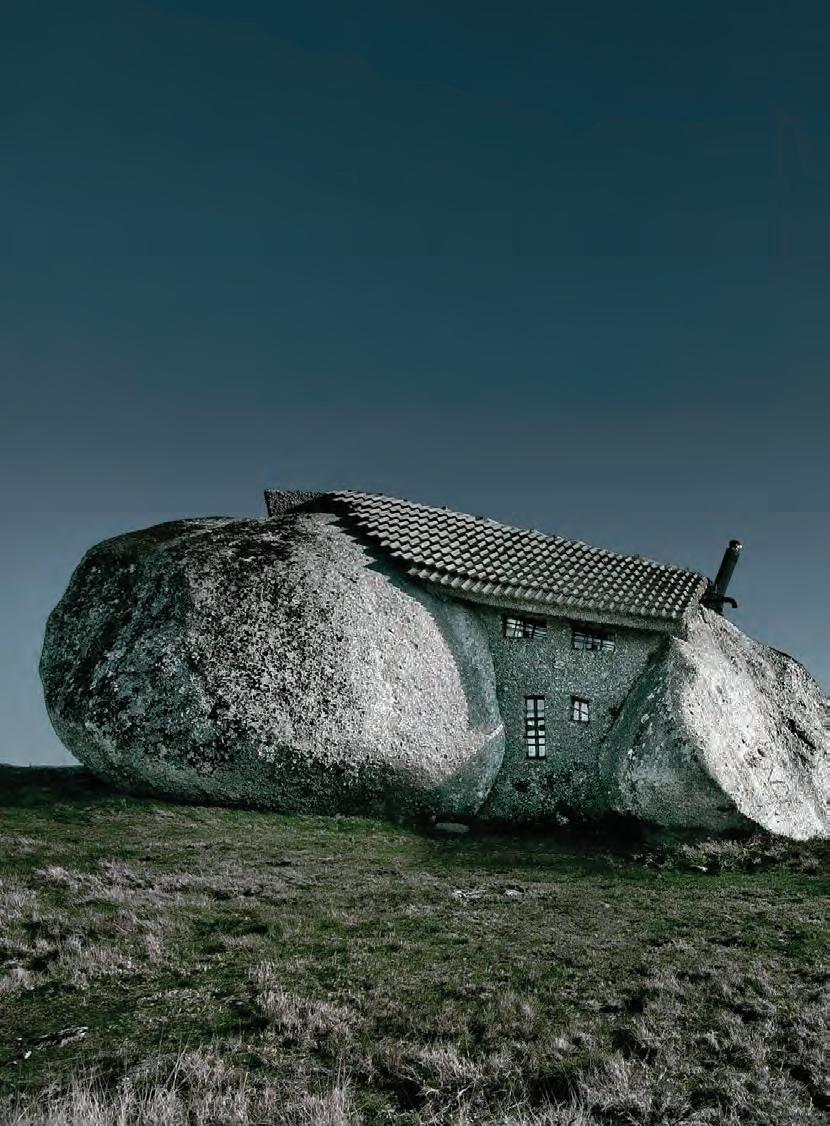
CRAZY HOUSES
They may not be your idea of a dream residence, but they sure beat your average showhome
By Ellie Rose
FE LICIANO GUIMA RAES 92
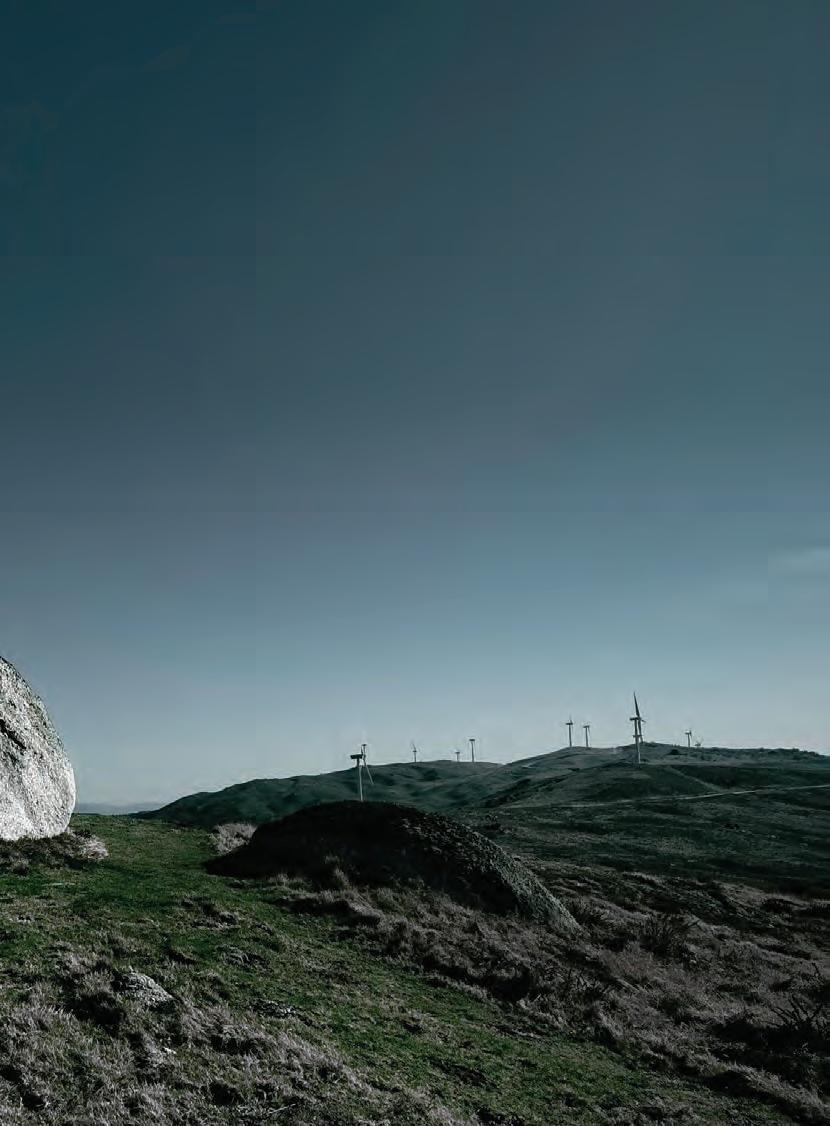
THE “ROCKERY”, FAFE, PORTUGAL
Observers dismissed photographs of this very remote stone-and-cement dwelling as fake when they first appeared online. But this mysterious, unoccupied home is in fact situated among the mountains of northern Portugal and has featured on local posters for a bike marathon.
►
93


ROLL-IT HOMES, KARLSRUHE, GERMANY
These living spaces, dreamed up by students at the University of Karlsruhe, have been compared to hamster wheels. But rather than being a somewhat fruitless activity to occupy tiny animal minds, walking on the inside of these cylindrical structures reveals various sections and facilities such as a kitchen, bed, desk and bathroom. Even the toilet rotates out of sight, but you’ll be happy to learn that it’s been fitted with a hinge so it can’t flip upside down.

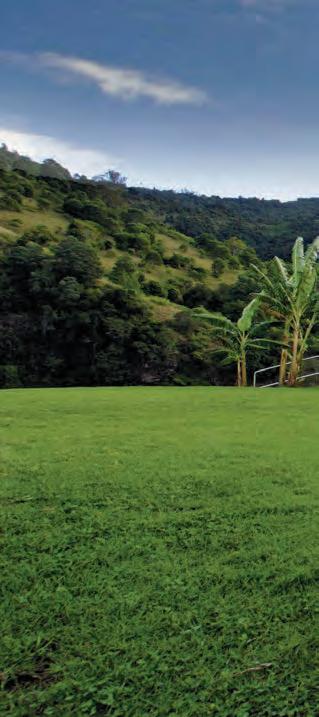
EVERINGHAM ROTATING HOUSE, WINGHAM, AUSTRALIA
94 READERSDIG EST.CO.UK JUN E 2013 COURTESY OF EROTATINGSTRUCTURES.COM

You might not think access to sunshine was a problem in Australia, but one man longed to squeeze the absolute best out of his local climate. For nearly a decade, Luke Everingham dreamed of building a house that could rotate to take advantage of light and shade, but assumed it was a financial impossibility. However, after termites ruined his old New South Wales farmhouse, Everingham discovered that a rotating building could be built for around the cost of any similar-sized home.
The 50-ton, 80-foot diameter, steeland-glass octagon (with an all-round

veranda) was completed in 2006. It’s rotated by an engine about the size of a washing-machine motor, allowing Everingham to position his sitting room to watch the sun set, for example. It’s termite-proof too. ►
95
READERSDIGEST.CO.UK JUNE 2013

THE UPSIDEDOWN HOUSE, SZYMBARK, POLAND
Is it impossible to live in a house built the wrong way up, one where the floors are the ceiling and a window in the roof the main entrance? No, says the Polish Centre of Education and Regional Promotion —in fact, that’s how we all live, with rich people spending billions on healthcare but allowing life to remain cheap in poorer nations.
To prove its somewhat laboured point, the centre built and decorated a house the wrong way up, and furnished it with inverted chairs, tables and a TV. It took five times longer to build than a conventional house, and the foundations required 650 cubic feet of concrete to keep the structure in place. Visitors to the house, which is open to the public, occasionally complain of seasickness.
AFP/GETTY IMAGES
READERSDIG EST.CO.UK JUN E 2013 96

THE WINCHESTER MYSTERY HOUSE, SAN JOSE, CALIFORNIA
This immense relic of Victorian-era mansion-building is the creation of one very superstitious widow. After losing her child and husband to illness in 1881, Sarah Winchester (left) consulted a spiritualist, who claimed her bad luck was down to being haunted by the spirits of Native Americans who’d been shot with guns produced by her family’s arms company. She was told that if she built a huge house for the ghosts—one on which she must never cease working—they would be appeased.
So the multimillionaire purchased an unfinished farmhouse and, using nightly séances to help her draw up her plans, added room after room. By the time she died, the house sprawled over six acres and comprised 160 rooms, 2,000 doors, 10,000 windows, 47 stairways, 47 fireplaces, 13 bathrooms and six kitchens. Winchester wanted to confuse the spirits, so she also constructed architectural oddities such as a staircase that goes nowhere. The home is now a tourist attraction (visit winchestermysteryhouse.com).


Step up on the staircase to nowhere ►

KOROWAI TREE HOUSES, PAPUA NEW GUINEA
The Korowai people of south-eastern Papua number only 3,000—and, until 1970, they were reportedly unaware of the outside world. Geographically isolated in the Indonesian jungle and made famous by sensational (and disputed) rumours of cannibalism, they also happen to be architectural geniuses.
They build their homes at the tops of large banyan or wanbom trees to escape

the dangers of low-flying swarms of mosquitoes, as well as marauding foes from other clans. Some perched as high as 110 feet in the jungle canopy, the houses are reached by climbing a notched wooden pole or (in the more sophisticated dwellings) a rickety ladder. Entire family groups, along with pets, live under one roof—which is made of leaves, obviously.
98
GEORGE STEINMETZ/NATIONA LGEOGRAP H ICSTOCK.COM

“ANTILLA”, MUMBAI, INDIA
The most expensive home in the world, worth at least £700m, this 27-floor modern palace is a masterwork in over-the-top opulence. Facilities include three helipads, a health spa, a theatre, parking space for some 200 cars, three floors of hanging gardens, a library, a yoga studio, a temple and (bizarrely) the world’s largest collection of antique sewing machines. Oh, yes, and 600 sta .
and materials giant criticism becomes
Situated on an ocean-facing plot in an exclusive district of Mumbai and billed as “the new Taj Mahal”, the complex looks out over some of Asia’s worst slums. Critics have accused its owner Mukesh Ambani (chairman of energy and materials giant Reliance Industries) of an arrogant disregard for the poor. Still, if the criticism becomes too much for him, he can always repair to his home’s “snow room”, the ultimate chill-out zone, complete with ice, artificial flakes and flurries.


A Life Less Ordinary
Robby Sukhdeo was determined to bring his tennis dream to a north London park— but could he cope with teenage vandals and near financial ruin?
service with a smile
It was nine o’clock on a damp summer morning when the park caretaker phoned Robby Sukhdeo with the bad news.
Robby’s recently opened Pavilion Sports and Café—which should have been the centrepiece of Albert Road Recreation Ground in north London—had been vandalised. Again.
Robby walked through his beleaguered premises, picking up empty cans, cigarette butts, overturned tables and a broken chair. Someone had obviously ►

100 ◄ readersdigest.co.uk june 2013
by crispin andrews photographed by antonio olmos

june 2013 R eade RS dige S t.co.uk 101
been having a good time. He checked the adjoining tennis courts. More cans and fag ends—and there were wet streaks on the cafe wall. Not the sort of look, or smell, that would encourage people to stop by for a coffee.
For a few moments, Robby felt sick and wondered whether it was worth the hassle. Then he remembered his dream of giving locals a community focal point—and how much time and money he’d invested. He got out the bleach and filled his bucket with hot water...

four. He was 16 when he played his first game of tennis, at Wood Green School. “O levels had finished and our PE teacher had us out on the school’s tennis courts until the end of term,” he recalls. “I played every day, really got into it.”

Robby had set up his Muswell Hill business a few weeks earlier in 2003, but had been plagued by a particularly nasty gang of teenagers, known as “The Vampires”. They set fire to the tennis nets, scribbled graffiti over the front of the cafe, threw rocks on to its patio and kicked footballs at customers. “There were two break-ins,” Robby recalls. “They stole the float from the till, cameras, my sunglasses, anything of value.”
Robby would confront the gang, and they’d run off—but they’d be back the next day. “It was nothing personal, they just didn’t want us here,” says Robby, 55. “They thought it was their park. I was determined it would be for everyone.”
Robby Sukhdeo moved to north London from Georgetown, Guyana, in 1961, aged
He was good, too. Good enough that when he joined Edmonton Tennis Club, aged 19, members were more interested in how Robby might help their teams win games than in his background or the colour of his trainers. After a couple of years, he made the first team, playing in Middlesex League Division One. He also helped Robin Brown, Edmonton’s county player, with the coaching. “You need a certain level of skill to teach others,” says Robby. “But it’s more about understanding the game and wanting to pass that knowledge on.”
By the early Nineties, he was a science technician at Muswell Hill’s Fortismere comprehensive school. The head of PE Patrick Haddow happened to be Robby’s best friend and suggested he coach the tennis team. Robby took them as far as the London championships several times—one year, even beating Dulwich College, the top independent school, six-nil.
Sadly, Patrick died of cancer in 2000. More than a thousand people turned up
102 readersdigest.co.uk june 2013
courtesy of robby sukhdeo
◄
The way things were, complete with tatty courts and vandalised cafe
to his funeral. “He was an inspiration, who dealt with the roughest, toughest kids and changed them,” says Robby. “He’d be there at seven in the morning running basketball classes and late at night taking school teams. He had time for everyone.”














Without Patrick, Fortismere just didn’t feel the same, and Robby decided to leave. But he would apply his friend’s spirit to a new project—turning the derelict Albert Road pavilion into a cafe and leasing the disused tennis courts from Haringey Council. A citytrader friend, Mick Dainty, put up £75,000 to get the business going, and Robby found another £25,000—plus the £6,000 a year needed to lease the courts. The Pavilion Sports and Café opened a year later.
pathways. “The very next morning 12 trees had been pulled up and the noticeboards smashed,” Robby says.
In the first two years, there were 130 incidents of vandalism against Robby’s business. The police had their eye on the troublemakers and eventually the local authority antisocial behaviour team threatened to ban them from the park.

“everyone knew kyle was the ringleader so i gave him a choice”
But a combination of the Vampires, tatty old courts and the British weather kept the customers away and, after 18 months, Mick pulled out. “We weren’t making any money,” Robby says.
Robby didn’t quit, though. He remortgaged his house, then remortgaged it again when the business needed more investment. His wife Sharon, an RE teacher, and the profit Robby had made selling an old family home, kept them going financially.
Still the Vampires wouldn’t go away. At one point, the council spent £132,000 on the park, planting 20 trees, putting up noticeboards and tarmacking all the
“They didn’t want that and, in a strange sort of way, it created a dialogue between us,” says Robby.
“I’d ask them why they were wasting their time causing trouble and they’d tell me there was nothing else to do, so what did I expect.”
Then, in June 2007, during one of those conversations, Robby did something that would change his fortunes. He asked one of the Vampires, 16-year-old Kyle Mitchell*, to help him coach tennis.
“Everyone knew that Kyle was the ringleader, so I gave him a choice. Stop vandalising the cafe, stop causing trouble and come and work for me—or get banned from the park.”
Kyle took up his offer and that summer, four gang members, aged between 16 and 19, helped Robby at the courts, earning £25 a day. They took care of the equipment, walked the younger players to and from the cafe, organised games, and helped the children with some tennis skills. “We gave them responsibility, a chance to excel and an incentive to look after us,” says Robby.
The rest of the gang soon stopped ►
*Name changed to protect privacy

Keep it up: last summer
570 children signed up for free coaching
targeting the cafe, and hung around the park less and less. “After a few months it was half as much, by the following summer even less, and soon not at all.”
Less trouble meant more customers, but the business still wasn’t making a profit. The old concrete courts hadn’t been resurfaced since the Seventies and were full of cracks and potholes. “When it rained they were too slippery to use,” Robby recalls. Puddles stayed for days. Good players found better courts.
Robby chased funding for new courts, but the rules didn’t favour him. If he could find 25 per cent of the cost, the Lawn Tennis Association (LTA) would cover 20 per cent, and provide the rest in an interest-free loan. But the total cost would be around £350,000—and the courts would still belong to the local authority.
Robby asked the LTA to set up a City Tennis Club at Albert Road. City Tennis was a national initiative to introduce the
game to poorer neighbourhoods and could have funded the new courts. But Muswell Hill didn’t meet the funding criteria—it wasn’t poor enough.
By the beginning of 2008, Robby was on the point of giving up on his dream. “To make a living, I thought I would have to concentrate on other sports and turn the cafe into a restaurant,” he says.
Then, in April of that year, former England player Sue Mappin came to the park. The LTA had asked her to conduct a review of community tennis and she’d heard good things about Robby’s set-up. “Sue liked what she saw,” he says. “The cafe was full, the courts were buzzing, but she could see that the state of those courts was a problem.”
Three months later, Sue came back with good news. Now the chair of the Tennis Foundation—a charity that aims to make tennis a sport for all—she was
104 R eade RS dige S t.co.uk june 2013
◄
looking to support suitable projects that wouldn’t need government funding to keep going.
The Tennis Foundation put up £300,000 towards the new courts, Haringey Council added £20,000 for the floodlights’ power supply, and Robby borrowed the rest from his sister, who’d just had a retirement payout. The Pavilion Sports and Café would become one of six Tennis Foundation’s hot spots—six good ideas from local entrepreneurs that would show others how to run affordable tennis. “After all that struggle and hard work, things were finally coming together,” explains Robby.
The courts have been up since summer 2010. Six are full-size and anyone can book them for £6 an hour; four are for
Making great strides: but Robby’s success took ten years
children. Today, around 175 people regularly play tennis at Albert Road and there’s a waiting list for new members (who get discounted playing rates). The club runs several teams in local leagues, and 570 children signed up for last summer’s free coaching camps. Robby employs three people to take the sessions and to coach in eight local schools, which also use the courts for PE lessons and after-school activities.
The cafe, meanwhile, is almost always full—and after ten years, Robby’s business is making money. He’s even started paying himself a salary.
Success means he spends more time in his office than on the courts, and last month he opened a second tennis and cafe business at Bruce Castle Park in ►

Tottenham, 50 yards from where the riots started in 2011.
But he still has time for kids who need him. He recently wrote a job reference for one of the original Vampires, who now runs summer camps in France. Kyle Mitchell also pops in from time to time— he’s 22 and working in the building trade. In December, when a 15-year-old park regular was arrested for stealing a mobile phone, Robby arranged for him to do his community service at the cafe. And every year, local schools send around 20 workplacement students—often their most difficult youngsters—to help Robby out.
“You have to reach out to kids and engage with them, not stand back and preach,” he says.
A couple of months ago, he called the police out after somebody jumped over the fence at night, and graffitied the cafe wall. A few days later, the culprit’s dad marched his son up to the courts, made him apologise to Robby, and watched while the boy scrubbed the graffiti off the walls.
Robby could reflect on the latest little victory for his dream and the community. It was the first incident of vandalism at the Pavilion Café for over a year. n
All Publicity Is Good Publicity…Maybe

Given the millions companies spend on pushing their brands, it comes as something of a shock when even wellestablished names get it wrong.
Some slips are quite mild. Earlier this year, McDonald’s #McDoStories hashtag on Twitter flopped badly when, instead of swapping “good news stories” about the fast-food outlet, users
piled in with claims of fingernails in burgers and other freaky tales. And you have to wonder what Urban Outfitters was thinking when it started selling an updated version of Monopoly called Ghettopoly—the objective was to make money by “buying stolen properties, pimpin’ hoes, building crack houses and getting carjacked”. (“You got yo whole neighbourhood addicted to crack. Collect $50,” said one of the Chance cards.)
Even worse was
tobacco giant Philip Morris, which decided to talk up the “positive effects” of smokers’ deaths by highlighting a study in 2000 that apparently showed cost benefits in terms of “healthcare, pension and public-housing”.
But when it comes to business people scuttling their own ships, the top man has to be Topman’s brand chief. A few years ago, he described his own customers as “hooligans or whatever”. Digging a deeper hole, he added, “Very few…have to wear suits to work—they’ll be for his first interview or first court case.”
106 R eade RS dige S t.co.uk june 2013
◄
Accidental Discovery Lowers Blood Pressure
Zona Plus® – what they found
Fighter pilots have to withstand huge G-forces in combat or they risk blacking out. This presented a major dilemma for flight researchers… and they spent a lot of money trying to solve the problem. Their research worked and the pilots were able to fly aggressively.
But they also found an amazing discovery. They discovered that some of the pilots now had lower blood pressure!
Curious researchers sought to find out why this was true. This research led to the development of the Zona Plus® therapy device, where the researchers discovered a unique ‘triggering point’ that multiplies the normal response of isometric handgrip exercise into substantial blood pressure drops.
NOw APPROVED IN THE UK
Doctors scoffed, then changed their minds
Early research showed such a large blood pressure drop that doctors didn’t believe the small studies. However, as more and more studies were published they all showed similar results. Finally, after several years of results, the Zona Plus® is becoming accepted around the world. The clinical evidence just keeps getting better, with 15 independently published journal articles showing significant blood pressure drops in 95% of patients.*

How does the Zona Plus® work?

“As long as I can remember I’ve always had elevated blood pressure. My blood pressure peaked at very high levels particularly in stressful situations. Being quite an energetic character I took it as God given. I did take my medication, but only reluctantly and not very consistently. Shortly after starting with my Zona Plus Therapy, my blood pressure dropped so quickly that I felt dizzy and had ringing in my ears. It turned out that my body just needed time to adjust to a lower blood pressure. Now my blood pressure is normal, I feel great and take better care of myself. Zona Plus helped me to finally achieve healthy blood pressure levels but also increased my resolve to do something about this disease.” Mr J Blattner
We all know aerobic exercise is good for the heart and typically drops blood pressure a little, but the Zona Plus® isometric therapy done just 12 minutes a day decreases blood pressure by two to three times that much. You can see a video at www.zonahealth.co.uk
The therapy produces physiological changes in the body, including improved endothelial function, nitric oxide production and improved vagal tone. The combined effect causes lower blood pressure
The therapy takes just 12 minutes a day, five times a week, and your results are guaranteed.**
The Zona Plus® gives you the Power To Change® your life, try it enjoy the benefits.
GUARANTEE SATISFACTION
*13/8 mmHG; Kelley. Journal of Hypertension 2012; 28(3): 411–418
If not completely satisfied simply return the Zona Plus® within 90 days for a refund of your purchase price. To ORDER/Questions call Freephone 0800 046 1348 or VISIT www.zonahealth.co.uk Advertisement
**
HOW TO… BY LINDA GRAY

EVERYONE SHOULD KNOW 1,001 Things
Welcome to the pages that help make life simpler, easier and—we hope—more fun!
How to STRETCH
Stretching before and after exercise is a waste of time, says personal trainer Greg Brookes of gbpersonaltraining.com.
“Do it if it makes you feel good, but don’t expect it to prevent soreness,” he warns. Trouble is, we spend too much time hunching over desks, curling up on sofas or parading around in high heels, which can permanently shorten calf muscles.

“What’s needed is regular bouts of stretching to lengthen the body,” says Brookes.
Lying on the belly helps counteract a tendency to bend forward, while standing tall lengthens the hamstrings, which contract when we sit down. Stretching is easier in the evenings, when the body is less sti or try a 90-minute yoga
108 READERSDIGEST.CO.UK JUNE 2013
KRISTIAN SEKULIC/E+/GETTY IMAGES

How to BEAT GARDEN PLAGUES
Volatile weather calls for plants that resist wet, cold, drought and maybe the odd plague of locusts, but many are garden thugs that quickly take over a plot. If conditions in your garden are challenging, try these tips from the Royal Horticultural Society instead.
class at any time of the day—Brookes recommends yin yoga, which targets the connective tissue. Just as important is taking the joints through their complete range of movement, at home or with aqua aerobics or t’ai chi. And if it’s all too much e ort, a massage with just the right amount of pressure will untangle knotted muscles, so we literally unwind. Bliss! ►
l Too wet. Waterlogged soils need bog-garden plants—try arum lilies, flowering rush and water iris. For areas that drain well, consider hydrangeas, lupin-like bugbane, masterwort, flu y filipendula and the snowball tree. All may need watering on clay that bakes rock hard in the heat.
l Too dry. Silver-leaved plants that reflect the sun are ideal. Frame rock rose, catmint, verbena and lavender with grasses and cascades of jasmine and potato vine.
l Too cold. If you’re struggling to grow plants that can resist bitter winters, choose those marked H7, the ultimate hardiness rating. Japanese anemones, New Dawn roses, purple loosestrife, potentillas, and foxgloves look good in any garden and can survive temperatures as low as minus 20C.
l Too many pests. Look for the RHS Award of Gardening Merit, given to disease-resistant plants.
l Too much tra c.
Amazingly, some plants thrive under cars, even if crushed. Grow thyme, bugle and creeping jenny through gravel or a gap in paving stones for a drive that’s more than just a car park.
109 JUNE 2013READERSDIGEST.CO.UK
ROSALIND SIMON/GPL/GETTY IMAGES
How to KNOW WHAT YOU’RE EATING
Every time we tuck into a meal, we swallow a range of additives that give food colour and flavour and keep it fresh. Often they’re beneficial, says dietitian Azmina Govindji of the British Dietetic Association, but as prolonging shelf life may sometimes shorten our own, it pays to understand the labels. Here’s the verdict on...





fats or oils, trans fats increase “bad” blood cholesterol and lower the good,

TRANS FATS: Guilty. Often listed as hydrogenated fats or oils, trans fats increase “bad” blood cholesterol and lower the good, says Govindji. They’re found in some biscuits, pastries, ready-meals and fast food. As their sole purpose is to extend the sell-by date, they’re best avoided.
The body converts
NITRATES: Guilty. The body converts these to nitrites, linked to bowel cancer. As it’s almost impossible to cure bacon, salami, meat pâté and ham without them, the World Cancer Research Fund recommends cutting out processed meats. Some fruit and veg (spinach, beets, lettuce, rhubarb) also contain nitrates, but they’re rich in vitamins so carry on eating them. Organic veg, free from nitrogen fertilisers, are a good choice.

cancer. As it’s almost impossible to ham without them, the World Cancer “but don’t confuse it with high-fructose corn syrup (HFCS). There appears to be a fizzy drinks and increasing rates of obesity


How to SELL YOUR HOUSE FASTER
“What’s selling now are show homes and wrecks—everything else is sticking,” says property expert Kate Faulkner, author of Buy, Sell & Move House (£10.99). But as most homes are neither, how do you attract a buyer?
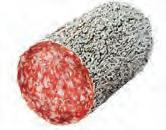
Choosing an estate agent who sells plenty of property like yours, not the one who charges least, is key. They should also be savvy about selling online—if you put your house up at £160k hoping to get £10k less, you’ll miss buyers searching for homes up to £150k.
Quality photos are vital.
FRUCTOSE: O cial caution. “It’s fine if you eat it in its natural state, as fruit,” says Govindji, “but don’t confuse it with high-fructose corn syrup (HFCS). There appears to be a link between HFCS in yogurt, snacks and fizzy drinks and increasing rates of obesity and Type 2 diabetes.”
Monosodium glutamate: Suspended sentence. This flavour enhancer is charged with causing Chinese restaurant syndrome—flushing, headaches and palpitations—but mushrooms, cheese and Marmite, which also contain glutamate, are rarely blamed for these symptoms. The main problem is that, like salt, MSG contains sodium, linked to high blood pressure and stroke. That chow mein could tip you over your RDA of a teaspoon of salt, so be vigilant.
MSG contains sodium, linked to high of a teaspoon of salt, so be vigilant.



Get three di erent valuations and check that the agents take messages out of hours in case a buyer calls then. Once you’ve decided, ask for a three-tier price structure, for a sale within two weeks, six weeks or three months. To speed up conveyancing, get your house “legally prepared”. Solicitors sort out searches and access issues in advance, on a no-sale no-fee basis, and if you accept an o er, contracts can be exchanged in a couple of days.
For a free checklist drawn up especially for Reader’s Digest, go to designsonproperty.co.uk.
110 PETER DAZELEY/THE IMAGE BANK/GETTY IMAGES 1,001 THINGS
» Want to buy not sell? See p124

How to DODGE BURNOUT
Read more in 50 Things You Can Do Today to Manage Stress at Work by Cary Cooper and Howard Kahn (£6.99).
One in three of us feels that work is now the most stressful factor in our lives, says the charity Mind, making us susceptible to burnout. If you’re su ering from symptoms such as headaches, irritability and lack of concentration, tackle the main issue first, says psychologist Professor Cary Cooper. “Or you’ll become ine ective, which will make you vulnerable to job loss.” 8pm and still at work. If you want to make an impact, work smarter, not longer, says Cooper. Leave on time at least two days a week and arrange to meet a friend or book a class to make sure you do.
300 emails. Turn o the alert, then check for urgent ones every hour—the rest can wait until your workload’s under control.
“Prioritise what’s important for the next two days,” says Cooper. What am I here for? Ambiguity is common when organisations
are restructured. If your job description bears little relation to your role, ask for it to be updated. That’s not what they said yesterday. Conflicting demands often a ect the gut, says Cooper. If your insides are churning, set yourself SMART goals (specific, measurable, achievable, realistic and timely) and get them agreed by your boss.
Someone will su er if I mess up. People in caring professions find it hard to switch o , so it’s essential to unload to a partner or friend. “Don’t let it simmer or you’ll get ill,” warns Cooper. Just promoted? Research shows that promotion is more stressful than divorce and can also lead to a split: 40% of first-time managers leave or get a warning within 18 months. Find a mentor at your new level who will inspire you and warn you of potential traps.
111 JUNE 2013READERSDIGEST.CO.UK
IMAGE SOURCE/GETTY IMAGES
►
How to STAY LEGAL ONLINE


That joke or rumour casually posted online is increasingly likely to see us in court, yet two-thirds of us have no idea that we risk breaking the law. “Adding ‘allegedly’ or inverted commas won’t help if you’re sued for defamation. And if the remark is a credible threat, an incitement to crime, or ignores a court order to stop names being published, it’s a criminal o ence and you could land in jail,” warns Professor Duncan Bloy, co-author of Law and the Media (£19.95)
A lot depends on intent. Hounding someone or damaging their reputation is illegal, but most insults are seen as barroom banter unless they amount to recial or religious abuse. It’s a fine line, so think twice before retweeting or sending that post. Is it likely to seriously harm someone’s reputation in the view of most people? If so, it’s potentially libellous. Quips about shooting the PM will send the police round, but jokes about drowning him in champagne should squeak by as they’re obviously ludicrous, says Bloy. Here’s the test—would you give your real name or repeat your comments face to face? If not, just press delete.
WHAT YOUR BANK WON’T TELL YOU
l I charge more interest than a payday loan if you go overdrawn without permission—and there’s no point in complaining if it’s in the T&Cs. But I have to help if you plead hardship, which can include rescheduling your payments. If I refuse, contact the Financial Ombudsman (financial-ombudsman.org.uk, 0800 023 4567).
l Sorry, I’ve raided your bank account. “Set-o ” means I can take funds from one of your accounts to make up for shortfall on another. But I have to make sure you’re left with enough to live on, so complain if you think it’s unfair.
l Do you want my freebies?
Premium accounts o er extras from hot-drinks vouchers to ticket and travel deals, but at £24 a month you’ll pay a hefty price. What’s more, limits on health and travel insurance mean you may be unable to claim when you need to, which is why I have to check that you’re eligible every year.
l Your ex could drain your account. It’s vital to freeze joint accounts if you break up, so ring me before you contact a divorce lawyer.
l I’m as mortified as you are. I’ll make good any financial
SOURCES: BBC MONEYBOX; THE BRITISH BANKERS’ ASSOCIATION; FINANCIAL OMBUDSMAN; FINANCIAL SERVICES AUTHORITY (NOW THE FINANCIAL CONDUCT AUTHORITY); MONEYSAVING EXPERT.COM
112 READERSDIGEST.CO.UK JUNE 2013 1,001 THINGS
TETRA IMAGES/GETTY IMAGES
loss you incurred when our computer went down. But I’ll also pay compensation if you were embarrassed when your card was rejected, and for the stress of waiting for a helpline response.
l How’s my timekeeping? New accounts should be up and running in ten working days, cash ISAs transferred in 15, cheques cashable in four and bank-tobank transfers completed in one. Electronic payments and cash paid in at the branch should be credited the same day.
l CPP is the new PPI. If you’re urged to pay £35pa for a CardProtection Policy, just say no. If your card’s used fraudulently, I’m legally bound to reimburse you unless I can prove you’ve been grossly negligent—keeping your pin with your card, say. Mere carelessness, such as letting a card out of your sight in a restaurant, doesn’t count.
l There’s one account I never advertise. A basic bank account doesn’t allow overdrafts or pay interest, but it’s open to anyone with ID and proof of address—and for free.


l You can legally access an account that’s not yours if the holder gives you power of attorney or signs a third-party mandate. If they have severe learning disabilities, you’ll need to become an appointee or deputy—for details, download Banking for People Who Lack Capacity to Make Decisions from bba.org.uk.
l Zombie accounts can gobble up savings. Watch out if your savings account is no longer on o er because interest can plummet—some pay just 0.03% a year. As inflation is currently 2.8%, that’s e ectively £97.23 for every £100 invested, so check rates regularly to stop your savings shrinking.

l Don’t drink and bank. Keying in the wrong number can be disastrous when paying bills online, so put the Chablis on hold. The good news is that I have to do my best to recover the cash—if I shrug my shoulders, complain to the ombudsman.



savings and ISAs same applies to banks such as Halifax at
Invest with my competitors. Although £85k of your cash is protected if your bank goes bust, the money in all your accounts in one bank—current, savings and ISAs —counts towards the total. The same applies to accounts in linked banks such as Halifax and Birmingham Midshires, all owned by the Bank of Scotland, while savings in foreign banks aren’t protected at all. See who owns what at moneysaving expert.com/savings. ■

113
VAL MANSFIELD/E+/GETTY IMAGES
I
you

When the doctor can do no more, it’s time for the priest


As a doctor, there are some situations you’re faced with that are beyond the capabilities of medicine to fix. None of the scans, blood tests or drugs at your disposal is going to help. These are the cases that prey on the mind; the ones where you were powerless.
But doctors do have one service—too little known about —that they can call on in such desperate circumstances, a panacea in the face of hopelessness. And what’s this miraculous cure-all? “Dial-APriest”. It’s literally a godsend.
Up and down the country, day and night, there are priests on
At a time like this I needed people with friends in high places
call. You can even pick the denomination you want. It’s almost like ordering a pizza. The hospital switchboard has the pager numbers, you ask to be put through, and within half an hour, bingo! your prayers are answered and a priest arrives.
Mr Bernard was one of the hopeless cases. He’d been found by the milkman who looked through the letter box and saw him collapsed on the floor. He’d been lying there for three days. He was brought into hospital, where it was discovered he’d had a brain haemorrhage.
There was nothing that could be done and, with the burst blood vessel still bleeding into his brain, it was only a matter of time before he died. But the really sad thing, the thing that made this tragic, was that Mr Bernard was totally alone. There didn’t seem to be a single soul in the world that loved him.
From his notes, I learned that his wife had died five years before. They’d been married for 66 years. His next of kin was listed as his next-door neighbour, but when I rang the house, they
114 READERSDIGEST.CO.UK JUNE 2013
IMAGE SOURCE/GETTY IMAGES
MEDICINE WITH MAX PEMBERTON
didn’t even know his surname. Surely there must be someone who cares, I thought to myself.
It was then that I saw in his notes, above the “next of kin” box, a section for religious beliefs—where someone had written “Catholic”. In those days, I’d never even noticed this section before, let alone thought of acting on it. It was past midnight, Mr Bernard was deteriorating and I couldn’t bear the idea that he’d die alone.



At a time like this I needed people with friends in high places, so I called the switchboard and tentatively asked if they had a number for a priest. A few minutes later I was talking to Father Stephen and, before I could say three Hail Marys, he was on the ward, holy water in one hand and cup of co ee in the other. A short, avuncular man with silver hair and round spectacles, he gave me a wink. “You’ve done all you can,” he said, “I’ll take care of it now. I’ll pray for him. Go and get some rest.” Father Stephen stayed by the bedside until, three hours later, Mr Bernard died.
Tennyson wrote that: “More things are wrought by prayer/ Than this world dreams of.” And as I signed Mr Bernard’s death certificate and wrote up my notes, I hoped that was true.
Max Pemberton is a hospital doctor and author. His most recent book is The Doctor Will See You Now







WHAT’S THE TRUTH?
This is, to put it bluntly, rubbish. Scans of the brain show there are no parts that are inactive or unused, and detailed probing has failed to identify the “non-functioning” 90 per cent. Studies of people with brain injuries reveal that damage to almost any area of it results in some loss of function. Even when we’re sleeping, the brain is a hive of activity.
WHERE DID THE MYTH COME FROM?
It’s been attributed to Albert Einstein, but there’s no record of him actually saying it. Either way, though, it dates back at least 100 years—to when neuroscience was in its infancy and there was no way of accurately looking at the brain or its functioning.

WHY HAS IT BEEN SO PERSISTENT?
Nobody knows for sure. With advances in science we’ve understood for quite a while that every area of the brain has a very specific, and very important, role. It seems likely that the ten-percent myth has been perpetuated because it feeds into the popular—and, let’s face it, attractive— idea that if we only could harness the brain’s power, we could all achieve amazing things. ■
115 JUNE 2013READERSDIGEST.CO.UK
ILLUSTRATED BY DAVIDHUMPHRIES.COM
THE MYTH? WE ONLY USE TEN PER CENT 0F OUR BRAINS MEDICAL MYTHS— BUSTED!

Rays, your glasses: keeping your eyes safe this summer

Can your eyes get sunburned?
Answer: yes they can! This is because the front of the eye, the cornea, is made up of epithelial tissue, which is similar to skin and very susceptible to sun and wind. Spend too long out of doors on a sunny day without a pair of good sunglasses and your eyes could end up feeling as if they’re on fire and full of grit.
That’s not all. Eye drops and rest will clear up the sunburn, but you could be risking other problems in the future.
Burning your eyeballs raises your chance of cataracts and non-cancerous growths
A sight for sore eyes: the CE Mark
called pterygia, which can cause discomfort, redness and—in extreme cases—blurred vision.
Given that pterygia is also known as Surfer’s Eye, it doesn’t take a genius to work out that UV rays reflected from water are especially bad, so take care on that long-awaited beach holiday. Sunbeds (if you’re hoping to go pre-tanned) are also in the frame.
There’s some evidence that too much UV causes age-related macular degeneration, the most common cause of blindness among older people. And it gets worse: there might be a link between sunburned eyes and melanoma. Ocular melanoma is the most common cancer of the eye (though still rare). And, of course, eyelids and the delicate skin around your eyes are also vulnerable to cancerous nasties.
So make sure you have the right eyewear. The NHS Choices website (nhs.uk) recommends shades that have the “CE Mark” and British Standard (BS EN 1836:1997), a UV 400 label or a statement that the glasses

statement that the glasses

o er 100% UV protection. And don’t forget a widebrimmed hat!
don’t


116
WITH SUSANNAH
HEALTH
HICKLING
GRADY REESE/E+/GETTY IMAGES
MEN’S HEALTH TIME TO TALK
Men are far less likely than women to talk to a GP about either their physical or mental health. And yet, they’re more likely to su er from almost all major diseases—and to commit suicide. In fact, a staggering 57 per cent of men who used Man MOT, a new online GP service

4 FACTS ABOUT HAY FEVER
1
One in five people is a ected by this allergic condition at some point in their lives, su ering sneezing, a runny nose and itchy eyes.
2 Some 95% of hay fever su erers are allergic to grass pollen, although tree and weed pollen also set some people o .
run by the Men’s Health Forum, had never previously sought help for their concern.
This is why “talk about it” is the simple message at the heart of this year’s Men’s Health Week (June 10–16). The Men’s Health Forum is calling on men to communicate their health worries, and on health professionals— especially the new Care Commissioning Groups—to remove the barriers by promoting innovative services such as Man MOT where internet chat replaces face-to-face consultations.
Not to be sneezed at: the Greek island of Cephalonia

For more, see the Men’s Health Forum on manmot. co.uk and malehealth. co.uk. HAVE


3 Hay fever hits a peak on June 22, known as Hay Day. This is the height of the grass pollen season.
4 Alcohol makes it worse. Wine, beer and spirits contain histamine, the chemical that triggers an allergic reaction.
If you’re looking to book a summer break, make sure you don’t take your hay fever with you! Here are some destinations where you (probably) won’t be troubled by pollen. Canary Islands, Corsica, southern Italy, Greece, Madeira, southern Spain, southern France, Croatia, northern Norway, northern Finland, Denmark, Sweden, the Netherlands.
►
117 JUNE 2013READERSDIGEST.CO.UK IAN WEST/OXFORD SCIENTIFIC/GETTY IMAGES; BSIP/UIG/GETTY IMAGES
YOURSELF A POLLEN-FREE HOLIDAY
SWAP AND DROP
See how much weight you can lose over a year with these simple food switches
TASTY TATER
Skip the fast-food medium fries (370 calories and 19g fat) and have a plain baked potato with chives (161 calories and 0g fat).
NICE SPREAD
Instead of a tablespoon of light mayo (50 calories, 5g fat) on your lunchtime sandwich, try mashed avocado (24 calories, 2g fat).
CHOC SHOCK
Rather than the chocolate chip cookies (160 calories and 8g fat for two biscuits), try a couple of chocolate digestives (120 calories and 6g fat).

GREY CELLS




ADD IT UP
Make this change once a week and you’ll cut almost 11,000 calories a year— or more than 3lb.
ADD IT UP
Using this alternative every day saves almost 10,000 calories a year— nearly 3lb.
ADD IT UP
Make this swap every day and you cut out 14,600 calories over the course of a year—and that’s more than 4lb.

It’s true, there really is such a thing as brain shrinkage, also called brain atrophy. It’s where your brain tissue starts to waste away, while the fluid spaces increase—leading to poorer thinking skills and memory. But don’t despair, you can do something to stop it. It turns out that physical exercise is just as important as mental activity for holding on to those brain cells, according to recent research.
The study asked 600 men and women with an average age of 70 to have an MRI brain scan and report on their physical and mental activity. Three years later they underwent another scan. Those who exercised regularly “experienced less brain shrinkage and less damage to the brain’s wiring”, according to Dr Alan Gow of Edinburgh University, head author of the study. Social and intellectual pursuits—which we’re often urged to take part in to hone and preserve cognitive skills—didn’t appear to make any di erence. So the message is: if you want to keep your mind young, keep moving. ■
JOSHUA HODGE PHOTOGRAPHY/E+/GETTY IMAGES
HEALTH
FOR MORE ON HEALTH, GO TO READERSDIGEST.CO.UK/HEALTH









BEAUTY WITH ALICE HART-DAVIS

The everyday products A-listers adore
Life is di erent up there in the celebrity stratosphere. It’s all designer clothing, handbags with first names and hugely expensive skincare and beauty products, probably mixed to order. Or so we like to think.

But now and again, a genuine A-lister pops up talking about— or is spotted buying—a normal beauty product, the sort the rest of us might pick up in the shops too. Which must mean it’s good, right? So who likes what?
too. Which must mean it’s good,



famous names including Rihanna, Helena Christensen and Joss Stone, who love how it soothes dry patches and can calm a roughened complexion.
Pond’s Cold Cream Cleanser (£4.49 at Boots) is another oldie that’s been gaining a younger following thanks to famous fans including Kylie Minogue
that costs all of £8.75. “The body
Victoria Beckham recently let slip that she loves a moisturiser called Skin Food that costs all of £8.75. “The body cream I use is a really simple, inexpensive body moisturiser by Weleda,” she says. “It’s really, really thick and I slather it on.” The ultra-natural thick balm formula hasn’t changed much since it was created in 1926, but it’s built up a following of
PRODUCT OF THE MONTH




“It’s such an old classic,” she says. “It’s all I really use to look after my skin. My mum uses it and it really does work. It’s made such a di erence. It’s really changed my skin.”




Cara Delevingne—the model of the year with the ferocious eyebrows and the endearing habit of pulling silly faces for the camera—loves Simple Wipes (£3.99 for 25, boots.com), which have been reformulated with extra vitamins. “I always carry them in my bag,” she claims.
Most of us have a tube of
Bobbi Brown Sheer Colour Cheek in Nude Beach (£18, bobbibrown.co.uk) This comes in brighter shades, but I’ve taken a shine to Nude Beach, a warm bronzer/blusher hybrid in a stick format that can be used on lips and brow bones, as well as cheeks, to cheer up your face.


120 READERSDIGEST.CO.UK JUNE 2013
Nivea—including the Duchess of Cambridge. A few months before her wedding, she was spotted buying Nivea’s Visage Pure & Natural Moisturising Day Cream at Boots (for the princely sum of £3.57). Her usual skincare is the Karin Herzog range (Oxygen Face cream, £36, karinherzog.co.uk), which is a little pricier but not exactly costly.
Beyoncé, meanwhile, has said in interviews: “I’ve also discovered some of the best moisturisers while in Europe—I like Eucerin’s AQUAporin.” A great choice for anyone with skin that’s drying out from too much travelling, it costs just £13.50 at Boots.
I JUST LOVE...


Jane Hanbury


58, from Hampshire, loves Annee de Mamiel’s Summer Face Oil. “I love the face oils that Annee de Mamiel blends specially each season because they’re rich enough to make a real di erence and easily absorbed. I only use a couple of drops, but they’ve saved my skin on more than one occasion. I love the way they smell too—just applying them makes me feel more relaxed.” (£60, demamiel.com)
FAST FIX 1 FAST FIX 2
Who can resist the idea of a Miracle Skin Transformer? Very few of us, hopes this new brand, which claims its SPF20 Face product will enhance our complexions noticeably in 15 seconds flat. How? In essence, it’s a sophisticated tinted moisturiser that o ers hydration to soften and nourish skin, and antioxidants to protect against environmental stress, along with ingredients that act like a primer, cover up imperfections and leave a smooth finish. There are also anti-ageing ingredients for some longer-term benefits. £38 at branches of Selfridges and Harvey Nichols.
At first, when I tried Eye Oasis Instant Hydrating Stick by H2O Plus (£19.50 at Your Beauty, marksand spencer.com), I thought, Why would I need a stick of gel moisturiser in my handbag? But after a week, I’m addicted to it for how it softens midday dry patches. ■

Alice Hart-Davis is an awardwinning beauty journalist who writes regularly for the national press, and is the creator of Good Things skincare
121 JUNE 2013READERSDIGEST.CO.UK

Bus spotters? Why not someone to find my keys?

You’ll have heard of train spotting and certainly plane spotting, but now we have bus spotting. We’re not talking the iconic red London Routemasters—we’re talking modern network buses.
As I caught the bus from Woking to Heathrow, a strange man approached the driver and asked to peak under his bonnet. What rude and outrageous situation was going to unfold, I asked myself—until it became clear that this bus spotter wanted to know the chassis number of the vehicle. Apparently, these spotters lurk around the garages
As a nation we leave £40m behind the sofa and under the fridge each year
at night trying to identify, mark and track each vehicle.
How I wish I had a sock spotter, or a loose-change tracker in my house. Apparently, as a nation we leave £40m behind the sofa and under the fridge each year, and will spend an average of two weeks of our lives looking for our keys and other lost items (in my case, it’s probably more).
As a measure, I once lost my car on a cross-channel ferry. It’s bad, I accept, but remember it was the prime minister who lost his child at his local pub not too long ago.
The great art of losing things, although a financial burden on the nation, at least enriches us with the stories and encounters we have trying to retrieve them, so maybe it’s time to celebrate forgetfulness and the art of misplacing things. At least it’s something I’m exceptionally good at.
122 READERSDIGEST.CO.UK JUNE 2013 CONSUMER WITH DONAL MACINTYRE
PICTUREGARDEN/DIGITAL VISION/GETTY IMAGES; BUNHILL.COM/ISTOCK PHOTO
IF YOU DON’T ASK...
Donal answers your questions. Please email queries to excerpts @readers digest. co.uk
QFive years ago, I was booked on an Aer Lingus flight from Gatwick to New York via Dublin. The first part of the journey went according to plan, but when we got to Dublin we found our ongoing flight to New York was cancelled because of technical reasons. We were booked onto the same flight the following day and were put up in a hotel overnight. Aer Lingus also agreed to book us onto a later flight home so we didn’t lose out on our time in the US, although I had to pay in excess of £200 for an additional night’s accommodation in New York. Am I entitled to claim that excess from the airline, even though all this time has elapsed?
AThe answer is yes. Under EU regulations that came into force in 2005, compensation is possible for your loss. If an airline cancels a flight for reasons other than an act of God, terrorism or weather, a raft of responsibilities kick in. The airline did all it was required to do in relation to replacement flights and alternative arrangements for a delayed flight home, but you could still claim for compensation for the inconvenience because the flight originated from an EU destination.
By my reading of the various consumer safeguards and case law, you could actually be entitled to up to £560 in compensation. Check out more at flightrights.ie, where the full details of how to claim can be found.
HAVE-AGO HERO
Recently, at my favourite hotel, a man in his 30s did a runner after consuming a bottle of very expensive champagne. It took a couple of days for CCTV to catch up with him, and he was forced to pay his bill.

Donal MacIntyre is an investigative journalist and a former presenter of ITV’s London Tonight

As soon as he left the building without paying, he’d committed an indictable o ence, subject to a citizen’s arrest. Although not a vigilante’s charter, there’s plenty of protection for the have-a-go-hero. It’s within the gift of us all to arrest a thief in action, although we understand it’s best to leave it to the professionals.

In my opinion, the suspect’s key crime wasn’t theft, but drinking fine champagne on his own—on that basis alone, he should be subject to arrest! ■
123

How to buy a house when you didn’t think you could

“This thatched cottage in the woods, with confectionery rendered walls—would it be new-build or pre-owned?”
Getting on
the property ladder can be tough at the moment. Luckily, there are some cheap alternatives to simply buying on the open market.
Buy with help from the Government
The Government’s NewBuy Scheme is designed to provide up to 95% LTV (loan-to-value) mortgages to those who can’t raise large deposits. However, with this scheme you do have to buy a new-build home.
The Government has also revamped the Right to Buy scheme. This gives people in social housing the opportunity to buy the property they are living in after
a set period of time. So, if you’re living in a council property right now, you could buy it at a hugely discounted rate. Be aware, though, that you might find it di cult to resell your home later, as ex-council properties are not so popular with buyers.
Shared ownership
These deals are generally run by housing associations. The way it works is that you buy a share of your home and pay a small rent on the remaining share, usually to a local housing association or your council. You get a mortgage on your portion (anything from 25%–75% of the value) and the small rent is paid for their portion. With most shared-ownership homes you can buy out your landlord’s portion at any time. The only hitch is that you have to be a first-time buyer to qualify for the scheme, and priority is given to local-authority or housingassociation tenants.
Buy at auction
Should you consider yourself a DIY master or expert renovator, you might want to
124 READERSDIGEST.CO.UK JUNE 2013
CARTOONS BY JIM
HUNTER
BIRTLES
MONEY WITH JASMINE
think about buying a property at auction. You can often find hard-to-sell properties at much lower prices at auctions—but they usually need a lot of work. There are many dangers to buying at auction and it helps to be a builder or have experience of doing up property. Also it can be hard to secure a mortgage for these types of property and you will need to have—at the very least—a 10% deposit ready to put down on auction day.
Build your own place
More than 25,000 people a year build their own home and the value of the finished property is usually 20–30% more than the costs. You’ll have to buy land, get an architect to design a place, get planning and building permission and then wait months, possibly years, for the house to be built (either by builders or a mixture of workmen and your own sweat and toil!)
But if you’re willing to go through all that, you could end up with a tailor-made bargain.
FASCINATING FACT
“Downsizing” is currently the number one reason for selling property in nine out of ten UK regions, according to Rightmove. The two most active age ranges in the 2013 market so far are 55to 64-year-olds (30%) and 45- to 54-year-olds (25%).

THIS MONTH’S BARGAIN
We’ve got 10% o all Herdy products until the end of June. The Herdy Company produces vividly coloured homeware items—from money banks to egg cups. Each item is crafted using responsibly sourced, high-quality materials. Use code RDHERDY001 at herdy.co.uk.
MAKE MONEY FROM YOUTUBE
Plenty of people make serious cash by sharing their videos on YouTube.com. If you fancy joining them, here are a few tips:
HOW DO YOU MAKE THE MONEY? Primarily from adverts on your videos. Basically, the more hits you get, the more views there are of the ads—and the more money you make.
WHAT VIDEOS SELL? Any video that’s viewed a lot can make money. It could be a funny item, cute footage of kittens or an instructional film. It doesn’t have to be great quality either.


A famously popular video on the site, for example, is “Charlie Bit My Finger”—which is just 56 seconds of home-made footage (a baby and his brother sitting in a chair). In the past few
125 JUNE 2013READERSDIGEST.CO.UK
►
years, it’s earned the family that posted it well over £100,000 from advertising!
HOW DO YOU DO IT?
If you hope to make any money from your YouTube videos, they must meet these minimum requirements:
1. They must be family-friendly.
2. They must not contain any content you didn’t create or get permission from its author to use. (This includes any music still under copyright.)
3. You have to get permission to feature anyone who’s in it, even if they’re family members.
Then, it’s just a question of making and uploading your film.
WHAT ABOUT A TITLE? Of
course you’ll need to name your masterwork. A good rule of thumb is to keep the title short and snappy. Most extremely popular (or viral) videos have memorable, self-explanatory titles that are easy to search for— eg, “Sneezing Panda”.
AND THE MONEY?
If one of your videos does well, YouTube will send you an email asking you to apply for revenue-sharing.
Once you have a few videos that are getting a fair amount of views, you can apply to become a YouTube partner. If you’re approved as one, you can turn on revenue-sharing for all your videos—and you should create a Google AdSense account to put their ads on your videos.
CAN YOU AFFORD PRIVATE MEDICAL INSURANCE?
Private medical insurance (PMI) helps to cover the costs for private medical care if you’d rather not wait for treatment on the NHS, or would like a more pleasant experience in hospital. It normally lasts for a year and, if and when you need treatment, the policy pays out (provided the problem is one covered by the policy; not all of them are). You can often choose when and where you are treated and you’ll have the comfort and privacy of your own furnished room—and probably much tastier food! However, PMI is not a replacement for the NHS. Accident and emergency services for instance, are still dealt with by the NHS alone.
What does it cover? PMI is designed to cover the costs of private treatment for “acute” conditions— defined by insurers as illnesses, diseases or injuries that can respond to treatment quickly. Although there may be a cap on the amount you can claim in each category, it will usually cover the cost of:

“His
126 READERSDIGEST.CO.UK JUNE 2013
◄ MONEY
wife’s just phoned—she’ll pay double if
chip on his
we can remove that
shoulder while he’s under.”
►

When it comes to securing your future, you don’t have to put all your eggs in one basket. Nobody really knows what the future holds, but we’re fairly sure that no matter what, you’ll want to be financially secure, with a roof over your head. Reader’s Digest have an exciting partnership with LV= and that’s just the sort of thing LV= have been helping out with for 170 years. For more information, give their friendly UK call centre a ring today.

Liverpool Victoria Friendly Society Limited: County Gates, Bournemouth BH1 2NF Vivat Finance Limited (trading as Reader’s Digest Financial Services) acts as an introducer appointed representative to Liverpool Victoria Friendly Society Limited (LVFS) for life protection products and to Liverpool Victoria Financial Advice Services Limited (LVFAS) for advice on retirement products. Vivat Finance Limited is registered in England No. 07205138. Registered office: 1 Eversholt Street, 9th Floor, London, NW1 2DN. LV= is a registered trade mark of LVFS and a trading style of the Liverpool Victoria group of companies. LVFAS registered in England No. 3027145, is authorised and regulated by the Financial Services Authority, register number 186890. LVFAS is a wholly owned subsidiary of LVFS. LVFS is authorised and regulated by the Financial Services Authority, register number 110035. LVFS is a member of the ABI, AFM and ILAG. Registered address for both companies: County Gates, Bournemouth BH1 2NF. Tel: 01202 292333 21333098 04/13 Advising our customers on an ever changing world 50 Plus plan: 08000 234 170 Annuities: 08000 234 186 We try and keep it that way. Taking care of your future used to be simple. Provided by Lines open 9am – 8pm Mon – Thurs, 9am-5pm Fri. For textphone, dial 18001 first. We may record and/or monitor calls for training and audit purposes
l Inpatient treatment—including X-rays, dressings and medication.
l The fees of private medical sta for both diagnosis and treatment.
l Operating expenses, including surgeons’, anaesthetists’ and operating theatre fees.
l Accommodation and nursing charges.
l Outpatient treatment that’s linked to your inpatient treatment.
Most policies exclude a number of other treatments and procedures such as routine check-ups from a GP, dentist or optician—as well as childbirth and long-term illnesses.
How much does it cost? It very much depends on the policy. What you pay depends on your age, sex, health and where you live. Also, the more comprehensive the cover, the higher the premiums.
So, for example, a non-smoking couple in their mid- to late-thirties with an eight-year-old child could obtain the most basic level of cover for £23.50 a month or the most comprehensive for £229. A 40-year-old non-smoking male could expect to pay anything from £10 a month, for very basic cover, to £102.
Alternatives PMI isn’t right for everyone, particularly if you’re on a tight budget. So, if it seems too much of an extra cost, consider these: l Stick with the NHS. You’re paying for it anyway through national insurance, and private hospitals may not be able to provide you with the same range of expertise.
l Take out critical illness insurance only. This will pay out a lump sum if you’re diagnosed with a serious illness.
l Insure yourself, by putting money aside into a special savings account or cash ISA each month to help pay for private treatment. You’ll need to put in fairly high amounts to the account—but if you don’t use it for a few years you can either spend it on something nice, or you’ll have saved enough for an expensive medical bill. It’s worth a go!
THE ONE THING YOU MUST DO THIS MONTH...
...is dust o your old bicycle and get cycling. It’s a fantastic money-saver, as not only does it save on petrol or train/bus tickets, but it also gives you free exercise. (You could even cancel your gym membership.)
Evans and Halfords constantly have sales on, including “web exclusive” o ers. But you can also find a good secondhand bike at police auctions. Go to bumblebeeauctions.co.uk for an ever-changing selection of bikes and bicycle parts (among other things) from police stores.
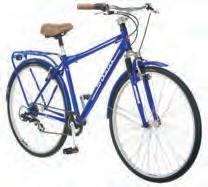
JARGON BUSTER BAILOUT
This is the financial rescue of a struggling borrower like a bank or other company. A bailout can be achieved by providing loans to a borrower that the markets won’t lend to, guaranteeing a borrower’s debts (so that the lender won’t foreclose on them), guaranteeing the value of a borrower’s risky assets or providing help to absorb their potential losses. ■
Jasmine Birtles is a personal finance writer and the founder of moneymagpie.com
128
FOR MORE ON MONEY, GO T O READERSDIGES T.CO.UK/ F INANCIALSERVICES
MONEY ◄

fast food
Tasty recipes you can make in just 30 minutes
Be sure to take advantage of all the lovely seasonal fruits Britain has to offer right now. The raspberries in this pudding add a real taste of summer, and the dish is light enough to accompany most main courses. And if you’ve ever felt nervous about tackling soufflés in the past, don’t worry—this is a quick and easy way to start.
hot RaspbeRRy soufflés (serves 4)
10g unsalted butter, at room temperature
115g caster sugar, vanilla flavoured or plain
250g fresh raspberries
1tbs kirsch, optional 4 large egg whites
1tbsp icing sugar, for sifting
Double cream
1. before you sit down to your main course, preheat the oven to 190C/375f/Gas Mark 5. Grease the insides of four 200ml soufflé dishes or ovenproof cereal bowls with the butter, then coat them evenly with some of the caster sugar, tipping out any surplus, and place on a baking tray.
2. purée the fresh raspberries by pressing them through a stainless steel or nylon sieve with the back of a spoon. stir in the kirsch, if using.
3. When you have finished the main course, whisk the egg whites with an electric
blender until they’re stiff but not dry, then gradually whisk in the remaining caster sugar. Keep whisking until the mixture becomes shiny.
4. Carefully fold the raspberry purée into the egg whites, then spoon the mixture into the dishes and make a swirl on top of each. Cook in the centre of the oven, leaving space above for the soufflés to rise, for 12–14 minutes, or until well risen and lightly set.
5. Remove the soufflés from the oven, sift icing sugar evenly over the top of each and serve with cream. ■

130
photographed by peter myers/rd

EATS & DRINKS WITH NIGEL BARDEN





THE SPICE BOY Out
Gurpareet Bains is an Indian chef who, a few years ago, decided to lose some weight. Not wanting to give up the food he loved, he reinvented many Indian classics. Out went ghee, bread and cream. In came superfruits such as pomegranates and cranberries, as well as herbs and spices whose healthy qualities Bains explained in his first book Indian Superfood. His second, Indian Superspices, is pretty spicy too. Turmeric, for instance, may well contribute to India’s low incidence of Alzheimer’s. Ginger and fenugreek seem to be both analgesics and anti-inflammatories.
And Bains’s food can even give you a good night’s sleep: his recipe for Insomnia-No-More Lamb Masala has a good dollop of nutmeg to help you nod o .
4 SQUARE MEALS?
Taco Bell, the Tex-Mex fast-food chain, is urging Americans to fit in a fourth daily meal.
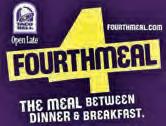
(Slogan: “Sometimes the best dinner is after dinner.”) As the average American already has 500 more calories a day than 50 years ago, you might think they’re already eating enough. But perhaps there’s room for just one more meal...
SULPHUR SO BAD?
Since Roman times sulphur has been used to preserve wines and kill o bacteria. However, with mass production, the amount of added sulphur (below) has markedly increased. The benefit of a daily glass of wine or two, particularly red, is well documented. But with little or no sulphur, the anti-oxidant factor is much higher—and, many believe, there are fewer hangovers.

With this in mind, John and Jane Lang’s goodwineonline.co.uk champions sulphite-free wines. Look out especially for those by Philippe Viret in the Rhone Valley and the Frey family in California. You’ll pay slightly more—but for simpler ingredients and a clearer head.
HOLIDAY CAMPARI

Don’t just ride a Bicyclette, drink one! It’s a hugely refreshing cocktail of white wine and Campari—the Italian aperitif made from herbs, spices and orange. The perfect mix is two-thirds of a fruity crisp wine to one-third Campari. Serve well chilled or over ice, with a twist of orange or lemon.
Downed in France and Italy by the bucketful, Campari is now catching on here. There’s even a summer Campari bar above a multi-storey car park in Peckham, south London—and it’s always rammed! ■
Nigel Barden is the food and drink presenter on Simon Mayo’s show on BBC Radio 2, and chairman of the Great Taste Awards
132 READERSDIGEST.CO.UK JUNE 2013
I’m happy with the idea of care ...if I can stay in my own home.
Homecare Select live-in care can provide all the personal care, support and companionship you need, as well as helping out with cleaning, cooking, shopping and keeping active.
We’ll help you to choose the level of care that’s right for you, from a few hours every day to round-the-clock support. Our carefully matched carers soon become part of the family, enabling you to remain comfortable, safe and independent in your own home. You can trust us to help.
Live-in care and more, for less than you’d expect. Call us now for a cost comparison
0333 999 7609
careuk.com/homecareselect
Homecare Select for later life

QUALITY Quality build that won’t let you down BRITISH Made here in the UK

STYLISH We’ll have a chair or bed to suit your decor MADE TO MEASURE To fit you, no matter your size
COMFORT Superior design and quality materials
PROFESSIONAL Our highly-trained demonstrators will describe our full range and show how our products work SERVICE After set up and demonstration we remove your existing furniture FREE! THAT’S GREAT BRITISH MOBILITY
A COMFORTABLE CHAIR OR BED IS ONE OF LIFE’S PLEASURES. ERGONOMICS, SUPERIOR DESIGN AND FINE CRAFTSMANSHIP UNITE OUR COLLECTIONS, BRINGING YOU THE VERY BEST TO CHOOSE FROM...
HUGE CHOICE OF CHAIRS...... GREAT CHOICE OF BEDS






RANGE OF BACK STYLES • HUNDREDS OF FABRICS • CHOICE OF MOTORS
CALL TODAY FOR FREE COLOUR BROCHURE OR TO ARRANGE FREE HOME DEMONSTRATION

OUR RANGE OF SPECIALLY-DESIGNED BEDS CAN HELP YOU TO REST, RECUPERATE AND RELAX LARGE CHOICE OF MATTRESSES

08009800974
*On New Brinsea and Como ranges. Offer ends 30th June 2013. Free item must be of the same value or less than your chosen item and must be ordered at the same time. “Great British Mobility” is a trading style of The Mobility Rental Group Limited, Mobility House, Brinsea Batch, Brinsea, North Somerset BS49 5JP. GREAT BRITISH MOBILITY



BUYONEGETONEFREE* THAT’SACHOICEOFFER
RISE
BEDS
& RECLINE CHAIRS AND ADJUSTABLE
AS SEENON TV
GARDENING WITH BOB FLOWERDEW

The benefits of tangy fruits, and how to grow mistletoe

Oranges are not the only fruit: remember to plan for a full citrus crop

QI’m building a sunny conservatory. What plants can I have in tubs that will give me fruit later in the year? For instance, I’ve heard lemons can be picked in winter.
AIt’s true that most of the citrus family crop in winter. Lemons are most useful because you can pick one whenever required. Tangerines, satsumas and clementines are good as they ripen with lots of small
fruits; oranges give fewer and grapefruits fewer still. Limes are a tad too tender, while kumquats are easy (not strictly citrus, but so similar it makes no di erence).
The cape gooseberry needs the same conditions as the citrus —the only di erence is that it requires regular nipping out and tying in to prevent it becoming huge. The vitamin-rich orange fruits, in their inedible papery husks, crop all year round. Then there’s the cherry or strawberry guava—this also needs similar conditions to citrus and gives huge crops of dark-red marblesized fruits full of vitamins and anthocyanins. Very tasty!
Q Is it possible to grow mistletoe? Anything I can do to prepare? I don’t have an oak, but could one live in a pot?
A Oak isn’t that easy. Ideally, you should grow your mistletoe (pictured below) on the same type of tree that the mistletoe parent chose, and while oak could be grown in a tub, it wouldn’t thrive. An apple tree would be happier and would probably suit you better. Next, you need the seed—try

135
PETER CARISSON/GETTY IMAGES ►
visiting Wales or the West Country this December and buy mistletoe from a farm gate selling it from an apple orchard. Or, failing that, just get some anyway. Stand it in a jar of water in a cool, light place so the berries ripen.
Around February, squeeze the seeds from the berries and stick them underneath the apple branches, holding them in place with bandages of toilet tissue. Do several, as you need male and female plants to get the latter to produce berries.
QMy compost bin is full, and when I dig some of it out it’s wet and smelly and doesn’t seem to have broken down much. What should I do? I’ve already had to get another bin as I needed somewhere to put all the new stu .
AEmpty the old bin out onto a plastic sheet and repack, mixing in shredded paper, straw, dry leaves or corrugated cardboard to absorb excess moisture. It’ll also help to add nitrogenous fertiliser or manure of some sort—fish blood and bone meal or pelleted poultry manure, which will accelerate composting. Adding garden lime or wood ashes will counteract the excess acidity that may form in wet bins.
Bob Flowerdew is an organic gardener and a regular on BBC Radio 4’s Gardeners’ Question Time. Send your gardening questions to Bob at excerpts@readersdigest.co.uk
BOB’S JOBS JUNE


June can be a lazy month. By now everything is sown and planted out, the beds and borders are full, the crops just starting to come in and the flower garden bursting with bloom. So be generous with your watering and feeding, be vigilant weeding and dead-heading, and keep the lawn and edges neat and trimmed. Start summer pruning, thin tree fruits, and pick and use all crops as they mature. Then on warm evenings take an easy chair outdoors and sit and simply enjoy your garden.
reader’s tip


When planting peas or bean seeds, use the middle of toilet rolls to help make room for the long roots and support the seedling. ■
Submitted by Louise Ing, Swindon, Wiltshire
Email your gardening tips and ideas—with photos, if possible—to excerpts@readersdigest.co.uk. We’ll pay £50 if we use them on this page.
136 READERSDIGEST.CO.UK JUNE 2013
IMAGE SOURCE/GETTY IMAGES ◄
Special Pensioners’ Hearing Aid!
A new hearing aid offer has been introduced for Pensioners. The hearing aid is low cost, simple to operate and brings IMPROVED hearing to thousands!
THE EFFECT IS IMMEDIATE. NO FUSS, NO BOTHER
The sound is crisp and clear and it is astonishing just how easily conversations, television or radio can be heard with such a small device!
SPECIAL BENEFITS FOR EXISTING HEARING AID USERS!
If you already wear a hearing aid, either ‘over the ear’ or ‘right inside the ear’, then you will be interested in this economical device.
DON’T WAIT ANOTHER MINUTE
To learn for yourself about this remarkable device for clearer hearing simply complete the coupon below for further helpful information and free illustrated booklet specially written for the Hard of Hearing.
This information pack is free, without obligation and will be sent by return of post! Simply telephone or send the coupon below in an envelope.



Please post me free and without obligation details of the Special Pensioners’ Offer: Mr/Mrs/Miss First Name Surname Address Postcode Tel No Phone or send coupon today (NO STAMP REQUIRED) to: Hidden Hearing Ltd, Freepost MA117/003, Medway Street, Maidstone ME14 1BR SPFP5112 ✁
REMEMBER...
v1_11_09 (in case we need to confirm your address) For a FREE information pack on Special Pensioners’ Hearing Aids FREEPHONE 0800 740 8680 Please quote ref: SPFP5112 or text ‘hear’ to 64446 Orgotowww.specialpensionershearingaid.co.uk and enter SPFP5112 www.hiddenhearing.co.uk Hidden Hearing Ltd, Maidstone, ME14 1HL
WILDLIFE WITH MARTIN HUGHES-GAMES

Cat lovers beware! There’s danger in the skies above

An
My animal-loving neighbours recently lost a cat under strange circumstances. At the time, they were startled to see a huge bird in a tree in their garden, and wondered if the cat’s demise and the bird could be related. I was sceptical…until now.
Yesterday my neighbours told me they’d recently seen the same huge bird at

I’m sure you’ll have heard of plankton in the sea, but have you heard of “aerial plankton”? This month, the sky above us is full of insects and spiders all flying and drifting in high currents. The latest research on the numbers involved is amazing.
a falconry display—an eagle owl. Suddenly, the connection between the cat’s fate and the “big bird” became more plausible. Eagle owls, which have a wingspan of 6.5ft, hunt rabbits, hares, pheasants and young boar in the wild, so it’s possible my neighbours’ cat was also a target.
But what’s this European and Asian bird doing here? The RSPB estimates that 65 captive eagle owls escape in the UK each year, and they’re now breeding wild. What’s more, no one can be sure if they were once present naturally in the UK—in which case they might be welcomed back —or if they should be treated as aliens.

Scientists used a modified radar to peer vertically upwards —if you imagine a column of air rising from half a mile square on the ground, some three billion insects would fly through it in a
IN the skY
typical summer month. Most of the insects are between 1,500 and 4,000 feet high, but tiny spiders have been found at over 13,000 feet. These are often migrating insects, catching the strong winds high above the ground. With wind assistance, moths have been tracked moving at 55mph, and scientists estimate some insects can travel up to 430 miles in a single flight.
» Search “billion-bug highway” on YouTube for an animated film.
138 READERSDIGEST.CO.UK JUNE 2013 DAVID TIPLING/NATUREPL.COM (VOLE); DAVID TIPLING/FLPA (OWL)
I sPY
eagle owl. Lock up your moggies!
The field vole breeding season gets into full swing this month. There are reliably estimated to be some 75 million field voles in the UK before the breeding season begins. As each female vole can have six or more litters of five pups, you may wonder why, at the end of the summer, we aren’t all wading knee-deep in voles. The fact is they need to breed furiously just to keep up with the onslaught of predators. Voles are fast food for kestrels, buzzards, harriers, owls, foxes, weasels and stoats, to name just a few.
look out!
there’s voles about

Field voles are about the size of mice, but have much shorter tails and smaller
ears and eyes. They have sweet little faces and seem to have a permanently worried expression (not surprising, as everyone wants to eat them!).
Voles only live for about 18 months and everything happens at high speed. Newborns appear as pink blobs—no ears, no fur, no eyes. But, in a burst of development, they’ll be fully grown in 21 days and, if female, may be pregnant a week later!
We need to cherish our voles and try to conserve their habitat—without these small, inconspicuous and often overlooked animals to feed on, much of our more obvious wildlife would be in trouble. ■
Martin HughesGames is a host of BBC2’s Springwatch and Autumnwatch
ONLINE WITH MARTHA LANE FOX
It’s true: now


the web can even make your garden grow

Great-grandfather Ralph Hoare, 104, has recently started tweeting greenfingered tips. The UK’s oldest gardener—he planted his first flower, a Japanese anemone, in 1914—Ralph hails gardening as key to his long life.

My father’s crazy about gardening, so I’d never dare suggest that the web is a substitute for time spent outdoors. But it is fast becoming
one of the best ways to get more from your garden. This is often in really easy, obvious ways. For a start, you can get a better and cheaper choice of stu to grow. A simple search also o ers heaps of heritage seeds, and plenty of know-how on everything from pruning to planting
of planting
in particular, is stu ed
your veg. (YouTube.com, in particular, is stu ed with “How To” vids.)
Forums and gardening
MyGarden.
social network just for keen Websites—are they now the handiest tools outside the potting shed?
Forums and gardening groups can help you tackle tricky topics and even start new friendships. MyGarden. org, for example, is a social network just for keen gardeners. Or, if you’re a veg grower, try UkVegGardeners.com. Cheeringly, community growing is on the up. RHS.org.uk locates local gardening groups—
140 READERSDIGEST.CO.UK JUNE 2013
LILLY ROADSTONES/TAXI/GETTY IMAGES
while sites such as Ecomodo.com help neighbours and friends swap and share tools and skills.
If digging isn’t your style, you could turn your garden into an allotment and let others get their hands dirty. Hire it out on RentMyGarden.co.uk, where you can also share it for events and parties. Fancy a stroll in someone else’s green space? Choose from 4,000 private places open for charity as part of the National Gardens Scheme at ngs.org.uk.
Lawn-mowing robots aren’t for everyone, but imaginative Wi-Fi enabled gizmos can remove the guesswork from anybody’s gardening. Take the Koubachi Wi-Fi plant sensor. Just pop it in the ground and you get data about the moisture, temperature and light levels—as well as care advice—straight to your smartphone. I’m also hugely excited about advances in 3D printing, which will soon see us producing our own gardening tools at home. In the meantime, though, it’s no wonder that thousands of people already have Wi-Fi enabled garden sheds.
NOW TRY THESE
• Shoot (shootgardening.co.uk) is stu ed with top online tools to create and manage your garden. List the plants in yours to create “mygarden” online, and you’ll receive monthly care pointers.
• The Botany app uses tutorials, flashcards and quizzes to teach you all about plants, seeds, mineral nutrition, respiration and more.
• The RHS Grow Your Own app can help you choose and grow fruit and veg. Browse and select based on your expertise, space and time. Then head to rhs.org.ok to locate your choices in its searchable database of more than 70,000 plants from 800 nursery catalogues.


• The Coldsnap! Frost Alarm app is a must for weather warnings, telling you when to wrap up plants, or move them inside.
Give an hour of your time to help an internet beginner. Go to go-on.co.uk for more. Or to find a taster session near you, call freephone 0800 771 234 wrap
• The Balcony Gardener (thebalconygardener.com) is great if you’ve got limited space—order a readymade garden to your door.
• The Bumblebee Conservation Trust is on a mission to find the UK’s most bee-friendly gardens. To find out your score, tell its Bee Kind tool about the flowers in your garden, and it’ll recommend more.
ABSOLUTE BEGINNER DIGITAL PHOTOGRAPHY
Digital pics are stored electronically rather than on physical film, making it really easy to snap, and instantly view, edit, print or delete. Plus, with sites such as flickr.com or facebook.com—which has 300 million photo uploads every day—it’s really easy for others to enjoy them too. Using a smartphone or tablet? Download whizzy apps like 360 Panorama or Instagram—which applies a filter-like e ect of your choice—to improve snaps on the move. ■

141 JUNE 2013READERSDIGEST.CO.UK
Martha Lane Fox is the UK’s digital champion and chairs Go ON UK (go-on. co.uk)
MOTORING

The little black box that may decide your insurance

The Aviva Drive app monitors your driving

Car insurance is a bugbear, but there’s a revolution on the way that will change your relationship with your vehicle—and it’s all thanks to your phone.
At present, premiums are a real blunt instrument, worked out on the basis of a few questions—age, where you live, number of miles driven. This information is used to calculate the likelihood of you making a claim. But it’s not about you, it’s about your statistical propensity to have an accident. What it doesn’t do is reflect how you actually drive. For years this has been the missing link for insurance companies. You might be ticking all the “low risk” boxes, but if you drive like Lewis Hamilton you’ll come a cropper. Likewise, many safe first-time drivers are penalised
high-risk of your vehicle with a transmission
because of the high-risk driving of other people their age.
But telematics has come to the rescue. This links the movement of your vehicle with a transmission system that shares the information with a company. New insurance firms such as Carrot and Autosaint will fit a “black box” that measures how erratic your accelerating and braking is, how many times you broke the speed limit and where you travelled. From that, you get a bespoke insurance premium.
Citroën are now proposing to fit black boxes for free to all C1 city cars they sell, then o er free insurance for anyone aged between 19 and 75.
However, both Confused and Aviva have smartphone apps that will do pretty much the same job. If you have an Android or iPhone, you can download the Aviva Drive app (aviva.co.uk/drive)—it’ll record your position and how fast it changes, and thus calculate your speed. The app then gives you a rating for your driving. You can monitor your driving long before you apply for insurance and, if you meet the criteria, your recorded history could get you a discount with Aviva.
So your future is that of a recorded unit in a national road dance. Does that make you feel more secure? Or worried that Big Brother is watching you?
142 READERSDIGEST.CO.UK JUNE 2013
WITH CONOR MCNICHOLAS
er
ONE TO BUY

Audi A3 Sportback (£19,825) When I tested one of these bigger A3s recently, I expected to find a very capable car. But I was awed by the experience. From the feel of the interior to the sound of the door slam to the fizz of the engine, quality ran through every aspect of the car. It made every moment with it a joy. I still miss it now. Highly recommended.
ONE TO SPOT
Mini Paceman (£18,970)
What’s a Mini these days? This Paceman is the coupé small SUV of the family. That means it’s the small version of the big version of the small car. That also means it’s a car that has absolutely no reason to exist. And I don’t care. I had one for a week (a fast Cooper S version) and it was a blast. Pure brilliant and silly fun in automotive form.
ONE TO DREAM ABOUT


Lotus Exige S (£52,900) Who doesn’t want a Lotus? The company might be in a financial pickle once again, but it’s cars like this that still make the heart pound. The Exige S is a stripped-out track-focused car that will knock your socks o , and probably your underwear too. Thrills don’t get more thrilling—or more British—than this.
A POINT OF ORDER
The o cial DVLA
upper limit for driving licence points is 12, but the Institute of Advanced Motorists put in a Freedom of Information request that revealed that over 8,000 UK drivers are still driving despite having 12 or more points. There’s a real gender split too. Of the 37 million drivers in the UK, 2,256 men are still driving with more than 12 points, but just 351 women are doing the same thing. The highest number of points? That’ll be the man in Warrington, who has a whopping 36. Ouch! ■



Conor McNicholas is the former editor of BBC Top Gear Magazine
143 JUNE 2013READERSDIGEST.CO.UK

My Great Escape: off the beaten track in Australia
The Boyd’s Forest Dragon can only be seen in the rainforests of northern Queensland



Christine Miller from Lancashire encounters reptiles aplenty on a trip to the Daintree Rainforest in Australia.
sugar and banana plantations, we reached the Daintree River. The only way of crossing is by the cable ferry, which first opened in 1958 and lets you go deeper into the rainforest. During a boat ride along the Cooper Inlet, we saw saltwater crocodiles basking in the sun—due to hunting, only 70 adults remain and these are now protected.
Send us a photo of your favourite holiday, tell us briefly what made it so special, and if we include it on this page we’ll pay you £50. See address on p4.
After some time snorkelling on Australia’s Great Barrier Reef, my husband and I returned with our two daughters to our hotel in Cairns believing nothing could match this amazing experience. How wrong we were!
We followed the advice of the local Aussies and took a day tour in a 4x4 vehicle deep into the Daintree Rainforest and on to Cape Tribulation. After a 50-mile drive north from Cairns through
While our tour guide cooked us lunch by a natural waterhole, we explored it by canoe. The crystal waters revealed turtles and many fish species, while exotic butterflies and kingfishers swooped across our path. We’d been told by our guide that cassowaries (which look like posh emus) were regularly seen in that area—although not keen birders, we wanted to view wildlife in its natural habitat.
The cassowaries sadly proved elusive, but we discovered a Boyd’s Forest Dragon clinging to a tree next to us. These insecteating lizards grow as long as 17 inches. We later trekked through the national park, where our guide pointed out the di erent layers of the rainforest.
Our tour reached its conclusion
144
TRAVEL WITH KATE PETTIFER
COMPILED BY LARA DUNN
on the coast at Cape Tribulation. It’s named after the experience of James Cook’s ship, the Endeavour, which got stuck on the rocks here and caused him many di culties. The scenery is unusual because this part of the rainforest—said to be among the oldest on the planet—runs right down to the beach. We looked for cassowaries again without success, but we did see a large monitor lizard.
We all agreed that although the Daintree Rainforest may not be as well known as the Great Barrier Reef, it’s equally stunning.
Audley Travel’s 13-day itinerary takes in Port Douglas, Daintree Rainforest, the Atherton Tablelands and Palm Cove, with an optional trip to the Great Barrier Reef (from £3,220 per person; audley travel.com).
TRAVEL WEBSITE OF THE MONTH
Oanda.com is primarily a site aimed at those working in the financial industry or conducting international business, but it’s also a handy and easy-to-use facility for travellers, giving an up-to-date exchange rate on any currency across the world. Simply enter the amount you wish to convert and the currency into which you’d like to convert it, and you’ll get an instant result.
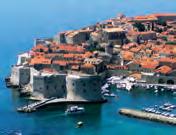
With new routes opening from regional airports throughout the UK from easyJet, Jet2, Norwegian and Ryanair, Croatia has much to o er. Linguists can combine sailing with learning the language on Sail Croatia’s Split-to-Dubrovnik Explorer route, departing June 22 (0800 193 8289; sail-croatia. com). Pula’s Superiorum Festival (June 13–15) will appeal to food and history lovers, while Hvar is home to the Lavender Festival on June 28–29 (croatia.hr).
THINGS TO DO THIS MONTH GO NOW STAY NOW

Coinciding with the National Gardens Scheme, the walled grounds of Battle Abbey will open to visitors this month. English Heritage has restored the gardens to resemble those of the abbey when it was owned by the Duke of Cleveland (1853–1901). Features include historically accurate species of bulbs, 68 di erent fruit trees—including medlar, mulberry, almond and pear—a wildflower meadow and beehives (visit1066country.com).
BOOK NOW

Eurostar is now the gateway to sunny southern France too, with new destinations Aix-en-Provence and Lyon (above) temporarily joining the established service to Avignon. A highspeed service runs from London or Ashford— standard return fares start at about £110 for Avignon or Aix-en-Provence, and around £100 for Lyon. The Lyon and Aix-en-Provence service runs until June 29; Avignon from July 6 to August 31 (eurostar.com). ■
145 JUNE 2013READERSDIGEST.CO.UK
The Reader’s Digest
June ction
From adult self-deception to the mysteries of childhood: our favourite novels of the month

Apple Tree Yard
by Louise Doughty
(Faber, £15.99; ebook, £12.99)
Nobody who reads Apple Tree Yard is likely to complain about feeling short-changed. Louise Doughty is rightly admired for her ability to use recognisable middle-class life as a springboard for something a lot more unsettling—and here the sharp domestic details are powerfully combined with (among other things) a dark crime thriller, a gripping courtroom drama and an unforced meditation on the pleasures and dangers of self-deception.
Respectable, married and middle-aged, Yvonne Carmichael is a genetic scientist convinced that her approach to life is entirely rational. But then, after giving evidence to a Select Committee on Science, she has sex in a parliamentary chapel with a man she’s only just met. Initially, Yvonne is rather proud of her new sexual daring. (“It is, as if, at the age of fifty-two, I have discovered an unexpected ability to play the piccolo or tap dance.”) But is the relationship as easy to understand and control by reason alone as she’s determined to believe? The answer, of course, is no—
BY JAMES WALTON
James Walton writes and presents the BBC Radio 4 literary quiz
The Write Stu
?



NAME THE AUTHOR Answer on p150
Can you guess the writer from these clues (and, of course, the fewer you need the better)?
1. His last novel was in 1924, 46 years before his death.
2. He was known to friends by his middle name of Morgan.
3. Screen versions of his novels include David Lean’s last-ever film—and three Merchant-Ivory adaptations.
which is why the novel is framed by Yvonne on trial at the Old Bailey for a crime that’s revealed in flashback with superbly teasing menace.
The Ocean at the End of the Lane
by Neil Gaiman (Headline, £16.99; ebook, £8.49) In the past, Neil Gaiman has written comic books (notably the bestselling Sandman series), fantasy fiction, novels for adults and children and even an episode of Doctor Who. The influence of all of them can be felt in The Ocean at the End of the Lane, a strange and beautiful book where nothing, including the book itself, is quite what it seems.
It begins with the unnamed narrator visiting his boyhood home in Sussex after years away. Suddenly he’s overwhelmed with memories from when he was seven and a monster from some other world disguised itself as a pretty young nanny—invading the family house, seducing his father and generally threatening destruction. Luckily, though, he did have help, in the equally mysterious form of a neighbouring girl with centuries of experience in fighting o such monsters.
Paperbacks out in June
Citadel by Kate Mosse (Orion, £7.99) A suitably thumping and satisfying conclusion to Mosse’s world-conquering Languedoc trilogy that began with Labyrinth.
Seven Deadly Sins: My Pursuit of Lance Armstrong by David Walsh (Simon & Schuster, £8.99) The full story from the award-winning journalist who did more than anybody to expose cycling’s greatest scandal.

Backlash by Lynda La Plante (Simon & Schuster, £7.99)
Gritty thriller from popular novelist and screenwriter.
Live by Night by Dennis Lehane (Abacus, £7.99) A Boston gangster’s rise during Prohibition. One for fans of classic—and classy— American crime writing.
At first sight, this is pure fantasy writing— alternately fun, scary and thrilling. Yet, while you could read the whole book that way, the longer it goes on, the blurrier the distinction between realism and magic becomes. And that, in the end, seems to be the point: in both childhood and childhood memories the line dividing imagination from reality is impossible to pin down.
Country Girl by Edna O’Brien (Faber, £8.99) Memoir from one of the great Irish writers of the past 50 years takes her from (very) small-town Ireland to the heart of swinging London—and all in O’Brien’s matchless prose.
►

IMAGES
Peerless: Edna O’Brien in 1966
GETTY
Meanwhile, on Earth...
A riveting new book meets the women left behind when their husbands travelled through space
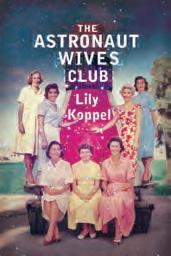
Imagine this. You’re an ordinary American military housewife living on a drab navy or air-force base when suddenly your husband is chosen to be an astronaut.

On the one hand, there are definitely some perks: freebies from all sorts of companies, tea with Jackie Kennedy at the White House, a lucrative deal with Life magazine. On the other, everything about you is now the object of public scrutiny: your hair, clothes, figure (as it was called back then), cooking, parenting and, not least, patriotism.
And the downsides don’t end there. There are, for example, all those young women encircling your husband, keen to bag themselves a real-life spaceman. At every stage, too, you’ve got to face the possibility that his new work will kill him.
The women who, from the late 1950s onwards, found themselves in this deeply strange position are the subject of the terrific new book by Lily Koppel, who manages to be both authoritative and nicely gossipy at the same time. She also emphasises how little advice or help the wives received from the US government, which seemed to consider its work done once it had vetted them for anything unwholesome in their backgrounds.
And, as it turns out, Koppel’s title is no metaphor. Forced to rely on each other, the women really did set up an Astronaut Wives Club (AWC) that met once a month: “If you think going to the moon is hard,” said
“Hi, honey, I’m home”: Apollo 11 after splashdown

AMERICA v THE SOVIET UNION: SOME KEY DATES F ROM THE SPACE RACE
1959 April 9: Nasa announces its first seven astronauts (above), intending that one of them will become the first man in space.
1961 April 12: The Russians put the first man in space—Yuri Gagarin, who orbits Earth and becomes a global hero.
May 25: President Kennedy announces that America will put a man on the moon by the end of the decade.
1962 February 20: John Glenn becomes the first American to orbit the Earth.
1963 June 16: Valentina Tereshkova becomes the first woman in space. (On the whole, the American astronaut wives don’t approve.)
148 READERSDIGEST.CO.UK JUNE 2013
RD’S RECOMMENDED READ
►
one member, “try staying at home.” Given the era, there was also a heroic intake of booze and cigarettes. In fact, fans of Mad Men will find plenty here they recognise: not just that long-lost hedonism, but also the fact that the wives’ most vital role was to be all-American adornments to their all-American men.
The following passage takes place over Christmas 1968. In Apollo 8, Frank Borman, Bill Anders and Jim Lovell (later famous for telling Houston that Apollo 13 had “a problem” ) are now the first people ever to orbit the moon. Even so, the riskiest bit is still to come: the “Trans-Earth injection”, where the spacecraft has to pull out of its lunar orbit and head for where Earth will be by the time it gets there—something, by definition, that nobody has tried before. Meanwhile, back in Texas, their wives are waiting…
‘‘
Susan [Borman] sat down at her kitchen table. She took out a piece of paper and pen and began writing Frank’s eulogy. She didn’t know where to start, but she had an epiphany: What a magnificent place to die. She wrote down her feelings that the world should feel uplifted. After all, Frank was watching over them, orbiting the moon for eternity. Susan thought that was what Frank would want. No mud-earth grave for him at a military cemetery, but the smooth silver orb that lovers had stared at for centuries. Susan could look up whenever she needed a connection.

“Mom, what are you writing?” Fifteen-year-old Ed had come into the kitchen.
“Your father’s memorial service. He might not come back.” Ed took the pen out of her hand and Susan slid the paper with the eulogy from sight…
Trans-Earth injection was next. Susan was dreading it, and soon Bill’s wife Valerie would be arriving to sweat it out with her. The two women had decided to sit together for the midnight event.
Somebody had stuck a red pin on Susan’s dress that said “Santa Lives!”, but she didn’t look as if she believed it. The two white squawk boxes [that relayed the radio messages to and from Mission Control] were dead silent.

149 JUNE 2013READERSDIGEST.CO.UK
The Astronaut Wives Club by Lily Koppel (above) is published on June 6 by Headline at £16.99; ebook, £7.49
►
Good news at last! Susan Borman (right) and Valerie Anders hear from Apollo 8
Susan closed her eyes and the muscles around her neck tightened. It was 12.34am on Christmas morning. Time for her to hear something.
“Apollo 8, Houston,” crackled the box. “Apollo 8, Houston, Apollo 8, Houston.”
Ten seconds of silence. Twenty. Thirty. Forty. Fifty. Fifty-one.
Fifty-two...
“Houston, Apollo 8,” crackled Jim. “Please be informed. There is a Santa Claus.”
“That’s a rmative. You are the best ones to know.”
At Mission Control, the men clapped their colleagues on the back and lit up cigars. The boys were on their way home.
The sun rose over Timber Cove and the Lovell kids ripped into their presents. Marilyn couldn’t wait for her gift—Jim’s return home in two days.
The doorbell rang. It was a deliveryman with a big box wrapped in blue-and-silver foil. Perched on top was a mobile of the moon and earth, two styrofoam balls studded with sequins. A minuscule white spacecraft was going around the silversequined moon on a wire. Marilyn looked at the card: “To Marilyn, From the Man in the Moon”.

She tore into her gift. Silver stars sparkled in the light blue tissue paper inside.
“A mink jacket!” she exclaimed. Jim knew she had always wanted a mink— didn’t every woman?—but it was a total surprise. Marilyn thought maybe he figured that in case he didn’t make it back, she would at least have that fur.
Marilyn danced around the family room, loving the feel of the fur against her skin. A little exhausted from all the excitement and stress, she let herself fall in a heap on the sofa. Wasn’t it crazy? Here she was, lying on the sofa, wrapped in her mink, and Jim was a quarter of a million miles away.

AN D THE NAME OF THE AUTHOR IS …
E M Forster—whose last novel was A Passage to India (also Lean’s last film). The Merchant-Ivory adaptations were Maurice, A Room with a View and Howards End
1965 May 18: Alexei Leonov becomes the first man to walk in space, another Soviet victory.
June 3: Ed White becomes the first American to walk in space.
1967 January 27: Ed White is one of three astronauts killed when Apollo 1 explodes during a test.
1968 December 21: Apollo 8 takes o . During the first manned lunar orbit, the astronauts take the famous “Earthrise” picture. On Christmas Eve they read from the book of Genesis —at the time, the most watched TV broadcast ever.
1969 July 20: Neil Armstrong and Buzz Aldrin become the first men to walk on the moon.
1972 December 7: Launch of Apollo 17, the last moon mission. Apollo 18, 19 and 20 had been planned—but were already cancelled because of congressional budget cuts and general declining interest. n
150 READERSDIGEST.CO.UK JUNE 2013
◄ ◄
’’
Cheers! Marilyn Lovell toasts a safe return

Books That Changed My Life
Actress and presenter
Lynda Bellingham’s career spans 40 years, including 16 as the nation’s favourite mum in the Oxo adverts. She published an autobiography in 2010 and now presents Country House Sunday, on ITV this month.
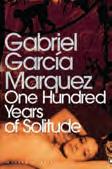
One Hundred Years of Solitude
by Gabriel García Márquez
The descriptions are so rich to the senses that the reading of this book was like a drug and I never wanted it to end. I was drawn to the magic realism—the sense that mystical elements of the world are as rooted in our lives as the mundane aspects. Nowadays we spend so much time in a virtual reality that we need reminding there’s a nonreligious spirituality. This novel reinforces my conviction that we should embrace the benign unknowingness that exists all around us.
The Wind in the Willows
by Kenneth Grahame
When I was a child, my grandmother took my sisters and I to stay with her brother in Donegal. While we watched him fish, she would tell us stories about the animals living in the riverbanks, based on The Wind in the Willows. By the time I could read it myself, my imagination was already awakened: molehills became the gateways to Mole’s house. I once saw a water rat and it was the most exciting thing I’d ever seen! When I was a bit older, we’d spot badgers in the woods near our farm, and forge up streams, immersed in the characters in the book. The reality of what we saw fused with my reading, and lent the story a potency that was completely magical.
La Peste
 by Albert Camus
by Albert Camus

Reading this in French for my A level was an achievement that profoundly a ected my attitude to translated books and plays. I learned that translated words are inevitably coloured to some degree. Years later, I was filming with a Russian director. My translator tried valiantly to explain what was required of me, but I was reminded of my reading of La Peste—better to listen to the director oneon-one than hope the translation was imparting the essence of what was required. Soon, I instinctively understood what he was saying to me, and filming went smoothly thereafter. ■
151 JUNE 2013 READERSDIGEST.CO.UK
As told to Caroline Hutton



RENDEZVOUS in PARIS
The latest from Ian Okell
FRANCE - MAY - 1940
British and German agents race the advancing Blitzkrieg to find a missing radar part.
But can aristocratic Sir Freddy ever be a match for ruthless S.S. agent Heidi Fuchs? “Nail biting to the last page. A top writer on top form!”

152
SHOPPING DIRECTORY
BOOK or KINDLE
MR BISHOP
PURCHASE FOR CASH
Target Sports & Leisure
17 Tutored
AMAZON:
Tel 01273 390 399 Mobile 07900992494
Entire house contents or single items. Antique Furniture, Paintings, Silver, Gold, Jewellery and China. Watches and Clocks, working and not working. 32 years’ experience. Will travel anywhere in UK.
Great value, Full Board activity breaks in the heart of Devon. FREE Golf, Bowls, Tennis,
+
Crafts! Crafty Breaks 0800 781 9714 activityhotelbreaks.co.uk

A GORE-TEX lined and GUARANTEED WATERPROOF shoe in brown or black leather. Deep tread soles and MEPHISTO air bag shock absorber in the heel for instant comfort. Sizes 6-13, including half sizes. £149.95 Postage free.

Place, Ambleside, Cumbria LA22 9BU
015394 33329





advertise on
please contact Nick Page
Email: nick.page@madisonbell.com 153 Simplaphone Handsfree Pick up the handset for added privacy Large Print Numbers Camera Answer-phone included Buy Now whilst stocks last www.simplaphone.com Tel: 01865 301915 Special Offer £49 + P&P Touch Screen Home Telephone FAMILY EXECUTOR UNWANTED PHOTOS? FAMILY / MILITARY / Locations holidays life etc. PHOTOGRAPHS & ALBUMS DON’T DESTROY! DONATE,
BUY, FOR PHOTO
Any
Send to Craigmar,
Yorkshire BD23
Napton Narrowboats A Great British Touring Holiday - you know you've always wanted to try it! Family run business for
years Weekly hire or short breaks. Call 01926 813644 www.NaptonNarrowboats.co.uk Market
To
these pages
Tel: 07789178802
MAY
LIBRARY. Postage refunded & Large quantities collected.
quantity any era – as late as 1970s. Tel 07771 680084 www.unwantedphotos.co.uk
Hebden, N.
5EB
25
Tel:
www.fwtyson.co.uk
Brown Leather
BARRACUDA
Laugh!
WIN £50 for every reader’s joke we publish. Email excerpts@ readersdigest.co.uk or go to facebook.com/readersdigestuk
¶ A man watched a woman in the supermarket with a toddler in her trolley. As they passed the sweets section, the child asked for chocolate; her mother told her no. The little girl began to sob and the mum said quietly, “Now, Ellen, we just have half the shopping list left to get. Don’t cry—it won’t take long!”
He passed the pair again in the biscuit aisle. The little girl screamed for cookies. When she was told she couldn’t have any, she began to whinge. The mother said, “There, there, Ellen, don’t cry. Only two more things to go.”
The man saw the pair again at the checkout, where the toddler demanded gum and threw a tantrum. The mother patiently said, “Ellen, we’ll be through this checkout in five minutes. Then you can go home and have your favourite drink and a nap.”
The man followed them out to the car park and stopped the woman to compliment her. “I couldn’t help noticing your great patience with little Ellen...”
The mother broke in, “My little girl’s name is Lily...I’m Ellen!” Seen on ahajokes.com
¶ Never trust a mathematician with a graph. They’re plotting something. Seen on the internet




¶ I PHONED MY WIFE TODAY AND SAID, “Pack our bags, sweetheart. I’ve booked us into a hotel for a few nights.”
“Ooh, how come?” she asked.
I said, “Well, I’ve been at the bookies today darling, and...”
“Really?” she said. “How much have you won?”
“Nothing, sadly,” I replied. “I’ve lost the house.”
¶ Q: Why did the woman divorce the grape?
A: She was sick of raisin’ kids.
¶ Q: What did Jay-Z call his girlfriend before they got married?
A: Feyoncé. Seen on the internet
154 READERSDIGEST.CO.UK JUNE 2013
¶ In north London they have small blue plaques naming famous residents. In south London we have big yellow signs saying, “Did you see this murder?”
Comedian Arthur Smith, on Twitter
¶ A dog goes to the post o ce to send a telegram. The post o ce clerk says, “Well, OK. It’s five words on a line, £5 per line.”
Have you heard the joke about the tortilla? It was corny
Seen on Reddit
The dog says, “OK, cool. Write this down: ‘Woof woof woof, woof woof woof woof, woof. Woof woof woof woof woof woof.’ ”
The man says, “You’ve got room to round it up with an extra ‘woof’ if you like?”
The dog replies, “Don’t be stupid. Then it wouldn’t make sense.”
Tony Abbott, on Facebook
I can’t help being lazy. It walks in the family
Seen on the internet ►
THE TROUBLE WITH JUNE

Award-winning comedian Josh Widdicombe is 5ft 6.5in tall, and his favourite TV show is The Simpsons. Each month, he lets us know just exactly what his problem is.
There’s such a thing as too much of a good thing, and in June I would apply that concept to daylight. I’m all for having a nice long day to enjoy everything we like to do in the sun (read in the park, drink Pimm’s even though it isn’t very nice, stand outside a pub in early evening shivering to make the point that it’s summer), but these “longest days of the year” are a bit much if you ask me.
This is the thing: I like the sun but I hate the guilt it provokes in me when, occasionally, all I want to do is lie in or spend an evening watching TV. For most of the year I’m fine to sit on the sofa and watch a repeat of Jonathan Creek, but suddenly when the sun comes out I’m apparently wasting my life if I don’t embrace nature from the moment the sun rises at 5am to the moment it disappears at 10pm.
BY JOSH WIDDICOMBE

I’ve heard that in some parts of Sweden, for a period in winter, there’s no daylight at all. A terrible thing, people say. When I hear about that in June all I can think is, But that must be brilliant—six weeks with absolutely no guilt!
155 JUNE 2013READERSDIGEST.CO.UK
HUMOROUS HAIKU
It turns out this beautiful, ancient Japanese form of poetry (characterised by the presence of exactly 17 syllables each time) can be adapted to mischievous uses...
About haiku
Space is limited
In a haiku, so it’s hard
To finish what you
About cleanliness
My room is not dirty
I just have everything on display
Like a museum
About wintry weather
I wake reluctant
Too cold to get out of bed
But I need to pee
A friendly haiku to introduce yourself
Welcome, new neighbour
From the sounds on my ceiling
You are dinosaur?
A ri on an old theme
I’m a poet but
I was previously Unaware of it
About going to work
No no no no no
No no no no no no no
No no no no no
THE WRITING’S ON THE WALL
While we would never condone vandalism, these subversive messages made us chuckle.
Seen on the internet
















156 READERSDIGEST.CO.UK JUNE 2013
¶ Dutch firm MarsOne says it’ll soon open applications for flights to Mars. It would be a oneway trip, and the company hopes to build a community of settlers on the planet.
Feeling a surge of excitement, I gave them a call.
“Thank you for calling Mars-One,” the operator said. “Can I take a name, please?”
“Yes, it’s John Jones.”
“There aren’t many women called John!” she said.
“It’s my husband’s name,” I explained patiently.
¶ A gnat lands on a fly’s back.
The fly says, “Is that a gnat on my back?”
The gnat says, “Gnat at all.”
The fly says, “That’s the worst pun I’ve ever heard.”
The gnat replies, “What do you expect? I just made it up on the fly.” Seen on the internet
60-Second Stand-Up
Ladies and gentlemen, please welcome Tom Stade
FAVOURITE JOKE?
I really like the one by [comic] Ron Vaudry where he looks at the lights and says, “Can we turn the lights up any brighter in here? I can almost see my dead parents beckoning me.”
DO YOU HAVE A FAVOURITE BIT OF YOUR OWN SHOW?
Yes, of course I do—I have a brand new bit where I compare Groupon to heroin addiction. I love mixing the dark with the happy.
Canadian comedian Tom Stade is on tour with his show his show Tom Stade Totally Rocks! For tickets see tomstade. co.uk

FUNNIEST THING THAT’S EVER HAPPENED TO YOU?
The fact I got married to a woman I’d only known for three months in Vegas and I’m still with her! I’m normally such a scaredy cat. While everybody else sat there trying to figure out who they were, we just jumped in and created this really volatile relationship...totally not properly! But I think everybody turned out OK. We’re what Britney Spears wishes she could be—we celebrated our 17th wedding anniversary recently.
FAVOURITE TV SHOW?
Definitely Modern Family, with the guy from Married... with Children [Ed O’Neill]. I watch it a lot, because we get Netflix and we can watch whatever we want for £4.99 a month. This is the world we live in, and that’s why HMV went into administration— because I wanted to see Modern Family on demand.

FINALLY, WHO’S YOUR COMEDY INSPIRATION?
My father. He’s really funny because he listened to comedy shows his whole life—Leo Sayer was a big deal in our house for some time. Dad said there are no bad words, there are only bad times to use them. n
157 JUNE 2013READERSDIGEST.CO.UK

158 READERSDIGEST.CO.UK JUNE 2013 ACROSS 1 Substance in tonic water (7) 5 Methodical, ceremonious (6) 9 Strong in quality (7) 10 1940s trio of singing sisters (7) 11 Shaft of light (3) 12 Style of poem (5) 13 North Atlantic country (7) 14 Beard of barley (3) 15 Air passage near the septum (7) 17 Meaning, nub (4) 21 Albert ____, London building (4) 24 Costly ornamental buildings (7) 27 Time past (3) 28 Fish with both eyes on the same side of its head (7) 29 West Indian republic, capital Port-au-Prince (5) 30 2012 Mark Wahlberg comedy film (3) 31 Red wine produced in Tuscany (7) 32 Establish (7) 33 Deduction from a bill (6) 34 Harlech’s Welsh county (7) DOWN 1 Person who helps the enemy (8)
ACROSS: 1 Quinine 5 Formal 9 Intense 10 Andrews 11 Ray 12 Lyric 13 Iceland 14 Awn 15 Nostril 17 Gist 21 Hall 24 Follies 27 Ago 28 Halibut 29 Haiti 30 Ted 31 Chianti 32 Implant 33 Rebate 34 Gwynedd DOWN: 1 Quisling 2 Interest 3 Ionic 4 Eternal 5 Flaying 6 Redress 7 Age gap 8 Aside 16 Ill 18 I do 19 Militate 20 Assisted 22 Albania 23 Lattice 24 Folding 25 Chico 26 Sluice 29 Happy 2 Premium paid on borrowed money (8) 3 Greek architectural style (5) 4 Immortal (7) 5 Stripping the skin from (7) 6 Set right (7) 7 Number of years between people (3,3) 8 Words spoken by an actor directly to the audience (5) 16 Under the weather (3) 1 8 Bride’s pledge (1,2) 19 Be a powerful or conclusive factor (against) (8) 20 Aided (8) 22 Country on the Balkan peninsula (7) 23 Criss-cross pattern (7) 24 Pleating, creasing (7) 25 One of the Marx Brothers (5) 26 Gate for regulating water flow (6) 29 Glad (5)
Test-Your-Knowledge Crossword
* Entry is open only to residents of the UK, Channel Islands, Isle of Man and Republic of Ireland aged 18 or over. It is not open to employees of Vivat Direct Limited (t/a Reader’s Digest), its subsidiary companies and all other persons associated with the competition.

1. Noughts and crosses
Put a nought (O) or a cross (X) in each cell so that there are no lines of three (OOOs or XXXs) in any direction. There’s only one answer.
3. Pathfinder
Beginning with the highlighted letter, follow a continuous path to find 17 parts of a castle. The trail passes through each and every letter once and may twist up, down or sideways but never diagonally.

Teatime Puzzles
2. Suko Place the numbers 1 to 9 in the spaces, so that the number in each circle is equal to the sum of the four surrounding spaces, and each colour total is correct.




£50 prize question (answer will be published in the July issue)
Wordladder Change one letter at a time (but not the position of any letter) to make a new word—and move from the word at the top of the ladder to the word at the bottom using the exact number of rungs provided.

The first correct answer we pick on June 7 wins £50!* Email excerpts@ readersdigest.co.uk
Answer to May’s prize question:
One solution is: Just, lust, list, lilt, lily, oily, only
And the £50 goes to… Janice Evans from Warwickshire
JUNE 2013READERSDIGEST.CO.UK 159
1 2 3 THIS MONTH’S ANSWERS ALL CONTENT SUPPLIED B Y PU ZZ LER MEDIA LTD
Beat the Cartoonist!
WIN £100 AND A CARTOON PRINT
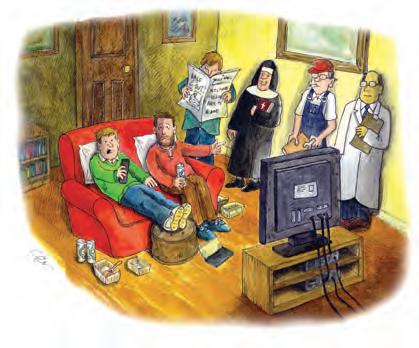
Think of a witty caption for this picture and you could beat the experts at their own game. The three best suggestions will be posted on our website in mid-June alongside an anonymous caption from our professional cartoonist. Visitors can choose their favourite—and if your entry gets the most votes, you’ll receive £100 and a framed copy of the drawing. Submit to captions@readersdigest.co.uk or the address on page 4 by June 14. Enter and vote online at readersdigest.co.uk/caption. We’ll announce the winner in our August issue. ■
In next month’s issue
Hugh Dennis on his (surprising) first memory
• Inside the mind of a stalker
• 65 years on: expert ideas on redesigning the NHS
PLUS How to name a baby (maybe even a royal baby...)
APRIL’S WINNER

We thought the cartoonists would stage a comeback this month, but Rob Murray’s “I can assure you I was in when you ‘tried’ to deliver it” was edged out by reader Antony Caine’s, “No, I’m absolutely certain I haven’t been missold PPI,” which has clearly struck a chord with a lot of our readers!
SCOREBOARD READERS 11 CARTOONISTS 5


160 Follow us at twitter.com/rdigest. Like us at facebook com/readersdigestuk
specsavers.co.uk

Cannot be used with other o ers. Applies to one pair of glasses from £69 range or above. Usual price £49. Additional charge for other lenses and Extra Options. Subject to suitability. Exclusions apply. SKU 25381634. ©2013 Specsavers. All rights reserved.











































































































 Author and BBC2 Review Show critic Natalie Haynes on the new releases
Author and BBC2 Review Show critic Natalie Haynes on the new releases















































































































































































 Bloomin’ marvellous: the terraces at Bodnant; (right) Darcey Bussell and the rose named after her
Bloomin’ marvellous: the terraces at Bodnant; (right) Darcey Bussell and the rose named after her

































 BY KENNETH MILLER
BY KENNETH MILLER


















 Family Guys
Family Guys

























































































































































































































































 by Albert Camus
by Albert Camus


















































